By ZINYA SALFITI 12




Chicago’s oldest camera store has survived a fire, a flood, and two pandemics.
FREE AND FREAKY SINCE 1971 | AUGUST 18, 2022 STILL HERE
more
INSIDE: Nick Cave, Douglass Park, and
CITY LIFE
04 Street View Vibrant fashion celebrating “Forothermore”
COMMENTARY
06 Joravsky | Politics Darren Bailey’s anti-Semitic abortion rhetoric is part of a larger MAGA election strategy. So far it’s worked.
08 Isaacs | Culture An exhibit about past pandemics carries fresh relevance at International Museum of Surgical Science.
10 Ehlers | Prisons Stripping the right to abortion harms incarcerated women.
occupants, Rogers Park neighbors debate a new men’s shelter.
16 City Bureau Chicago’s guaranteed income pilot program explained
woman show about mental health moves beyond stand-up.
26 Reid | Review Campaigns, Inc. explores the origin of dirty tricks.
27 Plays of Note Fun Home gets a sublime intimate production in Aurora; Zorro: The Musical surrenders to tired stereotypes.
FILM
28 Festival The “sexy and sinister” Noir City: Chicago returns to the Music Box.
CHICAGO READER | AUGUST 18, 2022 | VOLUME 51, NUMBER 23
TO CONTACT ANY READER EMPLOYEE, E-MAIL: (FIRST INITIAL)(LAST NAME) @CHICAGOREADER.COM
PUBLISHER AND PRESIDENT TRACY BAIM
MANAGING EDITOR SALEM COLLO-JULIN
PRODUCTION MANAGER KIRK WILLIAMSON
SENIOR GRAPHIC DESIGNER AMBER HUFF STORY EDITOR SUJAY KUMAR NEWS EDITOR JIM DALEY
THEATER AND DANCE EDITOR KERRY REID MUSIC EDITOR PHILIP MONTORO
ASSOCIATE EDITOR AND BRANDED CONTENT SPECIALIST JAMIE LUDWIG ASSOCIATE EDITOR TARYN ALLEN
36 Chicagoans of Note Patrixia, in-person and livestream DJ
18 Garcia | The Sale of Douglass Park A timeline of community organizing to oust music fests from Douglass Park

ARTS & CULTURE
21 Comic Nick Cave on “Forothermore,” his retrospective at the Museum of Contemporary Art Chicago
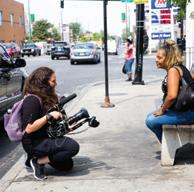

30 Documentary Filmmaker
Margaret Byrne’s intimate Any Given Day aims to destigmatize mental health.
31 Movies of Note Bodies Bodies Bodies is meant to be enjoyed like a really nasty gossip session, Bullet Train merges Looney Tunes violence with interesting storytelling, and She-Hulk: Attorney at Law is an absolute delight.
MUSIC & NIGHTLIFE
38 Shows and Records of Note Previews of concerts including Eli Winter, Kehlani, and Ruido Fest, plus reviews of releases by Diamanda Galás, Oneida, Matt Ulery, and more
42 Early Warnings New concerts and other updated listings
42 Gossip Wolf Goregrind monsters Organ Failure deliver 17 tracks in 15 minutes on their album debut, Ava Cherry discusses her music memoir with scholar and critic Aaron Cohen, and rapper Sol Patches shares heartfelt new experiments on Ordinary Circles
SAVAGE LOVE

45 Quickies Dan Savage offers advice on hemorrhoids and more.
NEWS & POLITICS

12 History Central Camera has weathered a fire, a flood, and COVID-19.
15 Brown | Housing As life goes on for houseless Touhy Park
22
THEATER
24 Solo Kellye Howard’s new one-
32 Feature Brilliant Chicago arranger Charles Stepney gets his flowers at an ambitious concert that doubles as a celebration of his first-ever solo album, released 46 years a er his death.
ON THE COVER: PHOTO BY CAROLINA SANCHEZ. FOR MORE OF SANCHEZ’S WORK, GO TO CAROFOTOS.COM.
SENIOR WRITERS LEOR GALIL, DEANNA ISAACS, BEN JORAVSKY, MIKE SULA
STAFF WRITERS DEBBIE-MARIE BROWN, KELLY GARCIA, KATIE PROUT
AUDIENCE ENGAGEMENT MANAGER YASMIN ZACARIA MIKHAIEL

LISTINGS COORDINATOR MICCO CAPORALE
VICE PRESIDENT OF OPERATIONS ANN SCHOLHAMER
DIRECTOR OF DIGITAL JOHN DUNLEVY
DIRECTOR OF MARKETING VIVIAN GONZALEZ MARKETING PROJECT STRATEGIST SHAWNEE DAY
DIRECTORS OF CIMA SAVANNAH HUGUELEY, YAZMIN DOMINGUEZ
EXECUTIVE ASSISTANT SANDRA L. KLEIN ADVERTISING 312-392-2970, ADS@CHICAGOREADER.COM
CLASSIFIEDS: CLASSIFIED-ADS@CHICAGOREADER.COM
VICE PRESIDENT OF SALES AND BUSINESS DEVELOPMENT AMBER NETTLES
VICE PRESIDENT OF SALES AMY MATHENY SALES TEAM VANESSA FLEMING, TIM OGDEN, TED PIEKARZ, WILL ROGERS DIGITAL SALES ASSOCIATE AYANA ROLLING
NATIONAL ADVERTISING VOICE MEDIA GROUP 1-888-278-9866 VMGADVERTISING.COM JOE LARKIN AND SUE BELAIR
DISTRIBUTION CONCERNS distributionissues@chicagoreader.com 312-392-2970
READER INSTITUTE FOR COMMUNITY JOURNALISM, INC. CHAIRWOMAN EILEEN RHODES ACTING SECRETARY KIM L. HUNT
DIRECTORS ALISON CUDDY, VANESSA FERNANDEZ, JACKIE KAPLAN-PERKINS, ROBERT REITER
A NOTE FROM AN EDITOR
AS SUMMER WINDS down, the battle over who gets to access public space is heating up, and Frederick and Anna Douglass Park on the west side is one of its front lines. Kelly Garcia, who has spent months reporting on e orts by community residents to take back the sprawling, 173acre park from music festivals that periodically close it down, compiled those e orts into a timeline that goes all the way back to 2015, when Riot Fest first moved to the park. The timeline includes community meetings, demonstrations, and a look at the ever-growing schedule
of festivals, which this summer blocked residents from using the park for nearly 50 days. Also included is a litany of donations the festival promoters have made over the years to local alderpeople and political committees. The dichotomy is stark: on one side, countless hours of community organizing by the people; on the other, a few thousand dollars in the right pocket. It seems clear which is more valued by those who will decide the fate of the park. JIM DALEY, NEWS EDITOR
READER (ISSN 1096-6919) IS PUBLISHED BIWEEKLY BY THE READER INSTITUTE FOR COMMUNITY JOURNALISM 2930 S. MICHIGAN, SUITE 102 CHICAGO, IL 60616 312-392-2934, CHICAGOREADER.COM
COPYRIGHT © 2022 CHICAGO READER PERIODICAL POSTAGE PAID AT CHICAGO, IL
ALL RIGHTS RESERVED. CHICAGO READER, READER, AND REVERSED R: REGISTERED TRADEMARKS ®
2 CHICAGO READER - AUGUST 18, 2022 ll
Mapping Heaux History honors Black and Brown sex workers of the past and present.
CLASSIFIEDS 44 Jobs THIS WEEK
IN THIS ISSUE







AUGUST 18, 2022 - CHICAGO READER 3 SAT, AUG 27 • 6:30PM Millennium Park • 201 E Randolph St • Chicago RECLAMATION SUMMER CONCERT The Spirit of Black Dance in Chicago chicagoblackdancelegacy.org FREE; RSVP REQUESTED CMDC Hiplet. Photo: Matt Karas
CITY LIFE
Street View
Dressed to dazzle


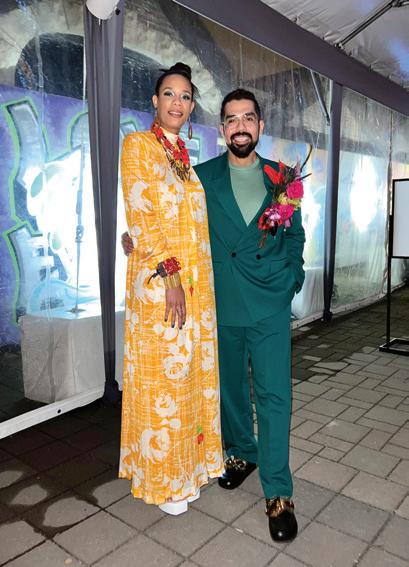
Vibrant fashion celebrating “Forothermore”
Nothing like an opening at the Museum of Contemporary Art to showcase the exceptional style Chicagoans have, in all their diversity. The festivities in May celebrating artist Nick Cave’s solo exhibition “Forothermore” were no exception. Body coverings were a central theme and could be appreciated on every level: on guests’ outfits in their special post-lockdown glee; on Cave’s fashion collection (as presented at the “The Color Is” gala at the DuSable Black History Museum); and, last but not least, on Cave’s breathtaking Soundsuits displayed throughout his major retrospective at the MCA, curated by Naomi Beckwith.
The first time I ever witnessed the magic of the aforementioned Soundsuits was in 2014 at a student fashion show at the School of the Art Institute, where Cave is a professor and the chair of the fashion design department. Seeing Cave’s work at the fashion show was a memorable experience of sheer joy.
Cave’s performance felt like a huge intergalactic party, featuring a parade of unique characters that looked, moved, and sounded like fascinating alien beings—each representing a very particular universe. Performers danced fully covered head to toe in amazingly intricate costumes, made of all kinds of unexpected materials. Cave has said that he considers his Soundsuits as a “second skin, or a suit of armor” which “erases gender, race, and class” and also regards them as “transformative objects with life-a rming potential when they are worn.” In the Nick Cave: Forothermore catalog, MCA director Madeleine Grynsztejn writes “a Soundsuit —as much as it is a beautiful sculpture adorned with some of the most vibrant colors you’ll ever see—is also a message. And what it’s saying is move and change.”
In addition to the Soundsuits , “Forothermore” includes a mesmerizing site-specific kinetic installation called Spinner Forest, textural sculptures, videos, and more. There are also off-site interventions connected to the show, such as Ba Boom Boom Pa Pop Pop at Art on the Mart, a video projection created by Cave and projected on the Merchandise Mart building nightly at 9:30 PM until September 7, and “Power of the Party: Chicago House and
Nick Cave”, an event taking place at the DuSable on August 27.
“Power of the Party” is presented by the MCA and features Dr. Meida Teresa McNeal, the artistic and managing director of Honey Pot Performance, a Chicago-based Afro-feminist public humanities organization, and DJ Lori Branch, a pioneering force in Chicago’s house music and nightlife scenes. The event will include a discussion between McNeal and Branch about the early house music scene in Chicago and its influence on Cave’s work. According to Dr. McNeal, who, along with Branch, is part of the team that created The Chicago Black Social Culture Map, the house music parties were “the places where we created ways of gathering with our chosen family to lift ourselves up and find joy and release and strength to move forward.”
“I see that in so much of Nick Cave’s body of work. So much of it comes from really horrible racialized experiences and trauma. But he takes those things and tries to reconfigure them as sites of pleasure, by making something beautiful out of something terrible,” she says. After their talk, Branch will perform a set inspired by Nick Cave’s art, providing a soundtrack to kick o “The Color Is,” an exhibition exploring the same themes of the similarly named gala; fashion and design objects by Cave and his brother Jack. It will be on view at the DuSable until November 27. v
@chicagolooks
Photos from the opening reception for Nick Cave’s solo exhibition “Forothermore” at the MCA ISA GIALLORENZO



4 CHICAGO READER - AUGUST 18, 2022 ll
“FOROTHERMORE”
220 E. Chicago, mcachicago.org
Through 10/2 : Tue 10 AM-9 PM, Wed-Sun 10 AM- 5 PM, Museum of Contemporary Art Chicago,















































AUGUST 18, 2022 - CHICAGO READER 5 You have a goal, and City Colleges of Chicago has the resources and support you need to achieve it. ccc.edu/apply HAROLD WASHINGTON • HARRY S TRUMAN • KENNEDY-KING • MALCOLM X • OLIVE-HARVEY • RICHARD J. DALEY • WILBUR WRIGHT Make your dream your career. The Price is Right®/© FremantleMedia Netherlands B.V. 2022 Licensed by Fremantle. All Rights Reserved. www.fremantle.com See O icial Rules, which govern, for complete details. SECOND-CHANCE PROMOTION Enter for a chance to win up to $50 MILLION in Las Vegas! See Ticket for Details
ON POLITICS
State of anxiety
Darren Bailey’s anti-Semitic abortion rhetoric is part of a larger MAGA election strategy. Sad to say, so far it’s worked.
By BEN JORAVSKY
With each passing day, I get more anxious about the Democratic strategy of promoting MAGA candidates like Darren Bailey in Republican primaries. Oh, I understand the logic—it’s an attempt to make sure they’re facing an opponent the polls show is easier to beat. In this case, internal Democratic polls apparently showed Bailey, an extremist, was easier for Governor Pritzker to defeat in November than Richard Irvin, a more “moderate” candidate.
Governor Pritzker and the Dems ran commercials denouncing Bailey as a MAGA extremist, banking on the idea that those spots would have the ironic impact of drawing Republican voters to Bailey. Which they did. As Bailey won almost 58 percent of the vote. So, yes, I understand the tactic. On the other hand, well, Darren Bailey now finds himself just one election away from being governor of Illinois. Gulp.
And that brings me to the main topic on my mind—Bailey’s anti-Semitic ravings comparing abortion to Nazi genocide. They came in the form of a Facebook video he broadcast for supporters five years ago, which was recently unearthed by Arno Rosenfeld, a political reporter for the Forward. Here’s what Bailey said: “I believe that abortion is one of the greatest atrocities of our day and I believe it’s one of the greatest atrocities probably forever . . . The attempted extermination of the Jews of World War II doesn’t even compare on a shadow of the life that has been lost with abortion since its legalization.”
This is classic anti-Semitism. It disparages, trivializes, and marginalizes millions of people who the Nazis killed. People. Actual living men, women, children, even babies. Not fertilized eggs—or what columnist Neil Steinberg calls “fetuses the size of a cocktail frank.” Like so many other MAGA fanatics Bailey has
convinced himself a fetus is as much a person as anyone you see walking down the street. By this “logic,” a woman getting an abortion is like a mini Hitler. As for “the Jews of World War II,” Bailey uses them to make his demented point about abortion. He might as well just go full denial—and claim the Holocaust never happened.
You know, it gets old having to explain to people who should know better why obviously anti-Semitic shit is, you know, obvious anti-Semitic shit. Speaking of which, not all of my journalistic colleagues agree with me on this subject. After Pritzker ran a commercial denouncing Bailey’s comments, Eric Zorn and Greg Hinz chided Pritzker. While agreeing that the Holocaust was horrible (way to go out on a limb, fellas), they opined that what Bailey said wasn’t really anti-Semitic.
“I don’t find Bailey’s statement ‘anti-Semitic’ as [Pritzker’s] campaign spokeswoman claimed, because what animated it was not trivialization of the value of Jewish life but a telltale amplification of the value of embryonic life, one that has major and troubling implications,” Zorn wrote. Hinz wrote, “I’m not sure . . . Bailey is being anti-Semitic.” Instead, Bailey made, what Hinz called, a “rookie mistake.” “All sorts of pols have learned the hard way that you don’t compare the Holocaust to anything, ever, and you certainly shouldn’t diminish its significance in even a relative way,” Hinz wrote.
So apparently Bailey’s “mistake” was publicly saying the comments as opposed to quietly believing them. Bailey delivered his abortion comments in November 2017—about three months after the “Unite the Right” rally, in which Nazis marched through the streets of Charlottesville, Virginia, carrying signs that said things like “Jews are Satan’s children,” and chanting, “Jews will not replace us.” At the time, President Trump hesitated to castigate the Nazis, saying there were “very fine people” among the Nazi marchers. By then it was clear that all sorts of white supremacists and anti-Semites had joined Trump’s MAGA movement. And Trump was clearly unwilling to denounce any members of his coalition—even Nazis. So he tried to deflect from Nazi crimes by basically saying, nobody’s perfect. Similar-
ly, Bailey’s Facebook comments also deflected from Nazi crimes.
Other MAGA candidates are playing a variation of this odious game. In May, a white supremacist, armed with a semiautomatic rifle, gunned down shoppers in a grocery store in a Black neighborhood in Bu alo, murdering ten Black people. Soon afterward, Laura Loomer wrote on her social media page, “Planned Parenthood has still targeted and killed more black people than the Buffalo supermarket shooter.” In short, Loomer did to the Black people killed by that white supremacist what Bailey did to Jews killed by the Nazis—disparaged, trivialized, and marginalized them. Then weaponized their deaths to make an illogical point. We don’t need gun laws cause more people die by abortion. Loomer is a Republican candidate for congress in Florida. (She is also a Jewish woman who’s been kicked o of various social media outlets for anti-Muslim comments—so you see, MAGA lunatics come in all types.) Her opponent is incumbent Republican Congressman Dan Webster. To win, Loomer must fire up the MAGA base with outrageous bullshit.
Similarly, Bailey was challenging an incumbent (state representative David Reis) in a Republican primary when he made that Facebook speech. Like Loomer, his strategy was to out-MAGA his opponent. It worked. Bailey defeated Reis and went on to win the general election. In 2020, he won election to the state senate. And now he’s at the top of the ticket— one of the most prominent Republicans in the state. So his Facebook message was no “rookie mistake.” Quite the contrary, it was part of a successful strategy to take over the party by going full MAGA.
So here we are in Illinois—the so-called Land of Lincoln. We’ve got a Republican congresswoman, Mary Miller, who said “Hitler was right.” A Republican gubernatorial candidate who says abortion is worse than the attempted extermination of the Jews. And, worse—thousands and thousands of Republican voters who like what they hear from Bailey and Miller so much that they run out to vote for them. Anxious times, indeed. v

6 CHICAGO READER - AUGUST 18, 2022
@bennyjshow
COMMENTARY
A protest in Springfi eld in 2020 BLACKBOX/UNSPLASH







AUGUST 18, 2022 - CHICAGO READER 7 CREATE A HOME fu of savings Learn how to save money and energy with ComEd by visiting the ComEd community booth at Ribfest Chicago at North Lincoln Ave between Irving Park Road and Berteau Avenue. 8/19 – 8/21 Ribfest Chicago Friday, 5pm – 10pm Saturday/Sunday, 12pm – 10pm 4000 N Lincoln Ave, Chicago IL 60618 Learn more at ComEd.com/CommunityEvents
COMMENTARY
Pox Americana
By DEANNA ISAACS
Last Sunday, stuffed with antibiotics, numbed by painkillers, and facing a date with an oral surgeon the next morning, I made my way to the International Museum of Surgical Science for an artist’s talk by James R. Wilke.
It’s not the best way to visit this unique repository for the medical devices of yesteryear, but it did result in heightened attention to the skulls of folks who had their headaches cured by drilling holes in them, braces straight out of medieval torture chambers, and mural-sized artworks commemorating antique C-sections and amputations, blood and all. This very interesting place, housed in a 1917 landmark mansion on DuSable Lake Shore Drive, is not for the faint of heart.
Wilke, a multifaceted artist—actor, singer, composer, lyricist, puppeteer, director (with a regional Emmy on his résumé), producer, miniaturist—but primarily a writer, was the museum’s spring artist-in-residence this year. Sunday’s lecture (served up with wine and a demonstration of his mellifluous baritenor) was the capstone event of his residency projects, which included the completion of a play, a novel, and the creation of an exhibit, with smallpox as a common focus. The exhibit, “Pox Americana,” up through August 28, occupies two rooms of the museum. On the main floor, it consists of a series of handsome text panels laying out the long, global history of the disease. The second room, up three flights of stairs and through a warren of galleries on the fourth floor, has more text panels, fleshed out with art and artifacts like 19th-century etchings making it clear that anti-vaxxers are nothing new.
The parallels to COVID were top of mind from the beginning, Wilke says, though he aimed for viewers to come to that conclusion themselves: “I didn’t want to hit them over the head with it.” But he had no way of knowing, when he started work on the residency projects in February, that another virus would soon make the subject of smallpox directly
relevant.
That’s because there’s no vaccine exclusively developed for MPV, which both the World Health Organization and the Biden administration have declared a public health emergency. The two used for it are smallpox vaccines. And of those two, ACAM2000, which the U.S. had stockpiled in mass quantity, turned out to not be the safest for the population with the most monkeypox cases so far—men who have sex with men, a significant number of them dealing with HIV.
The other vaccine, Jynneos—which requires a two-shot regimen, 28 days apart—is suddenly in such high demand and short supply that, earlier this month, the U.S. government authorized cutting the dose to one-fifth of what it had been. The reduced dosage is said to be e ective if injected in the skin instead of the
layer of fat beneath it—a procedure also said to be more di cult to execute.
In his talk last weekend, Wilke said smallpox, which we know has been around since roughly 10,000 BC, “may have been the most deadly disease in human history,” decimating America’s Indigenous population and killing a half billion people in just the final 100 years of its long reign. Thanks to vaccination, WHO declared the world free of it in 1980, making it, Wilke says, “the first-ever globally eradicated human disease.”
Wilke’s other residency projects include a young adult novel, Spiritania, intended to be the first in a series (it’ll have a launch at the museum November 17), and a play he wrote that’s an adaptation of Toni Morrison’s 2008 novel, A Mercy. Wilke, who once gave up a life in art for a career as a CPA, noted that Morri-
3 free)
son’s story, set in the 17th century, tells of Africans in America who brought with them the knowledge of inoculation—the introduction of a small amount of matter from a smallpox pustule into the bloodstream—the technique that eventually led to the invention of vaccines.

But with the eradication of smallpox in the 20th century, routine vaccination for it was abandoned. The result: several generations of humanity more vulnerable than their grandparents to monkeypox.
In June, when Wilke had to finalize his text for this exhibit, he had a question: “Are we on the cusp of yet another serious pandemic from monkeypox?” He didn’t foresee, he says now, how quickly whatever he wrote then would be out of date. v
8 CHICAGO READER - AUGUST 18, 2022
ON CULTURE
An exhibit about past pandemics carries fresh relevance at IMSS.
@DeannaIsaacs
1872 etching from Harpers Weekly by Sol Eytinge Jr. (1833-1905) COURTESY IMSS AND JAMES R. WILKE
“POX AMERICANA”
Through 8/28 at the International Museum of Surgical Science, 1524 N. DuSable Lake Shore Dr., Mon-Fri 9: 30 AM- 5 PM, Sat-Sun 10 AM- 5 PM, $18 ($14 seniors, students, educators, and military with ID, $10 children 4-13, children under






AUGUST 18, 2022 - CHICAGO READER 9
PAID FOR BY THE CHICAGO FEDERATION OF LABOR
COMMENTARY
ON PRISONS
On demand, without apology
Stripping the right to abortion harms incarcerated women.
By ANTHONY EHLERS
Aguard came to my cell this morning and asked me if I wanted to hear a joke. Without waiting for me to reply, he said “women’s rights,” and burst out laughing. I didn’t find it very funny at all. June 24 was a sad day in the history of our country. The day they overturned Roe v. Wade, the day they took away an established constitutional right. They didn’t change it, they didn’t curtail it, they simply . . . took it away. Anytime our rights are stripped from us, it should be concerning to every American.
It’s the Supreme Court that’s the joke! Politics isn’t supposed to have any place in law. When you become a justice of the Supreme Court, you’re no longer a Republican or a Democrat; your duty isn’t to one party, but to the law. Previously, the Supreme Court struck down a New York law restricting concealed weapons, saying in part that “no state can make a law restricting a constitutional protection.” Then, they turn around and do the exact opposite, saying it’s up to the states to do away with constitutional protections altogether! How can you trust this Court? It’s not the Supreme Court of the United States; it’s the Republican Supreme Court.
We are hearing that these justices are originalists, which means that they take the Constitution literally, and hold only to what is in the original document. That view is extremely shortsighted, and ignores the fact that our Constitution was written 250 years ago. The country has grown and evolved, the population has grown, our morals have evolved (for some of us), so why do we insist on sticking dogmatically to the originality of 250 years ago? It seems counterintuitive that our country can evolve but our beliefs can’t.
Let me be clear: I am pro-choice. I think that a woman has the right to do with her body what she chooses. It’s not my personal business, and it certainly isn’t the government’s business! Some people feel differently, and that’s fine; in America we are all entitled to our own opinions. But one of the biggest problems I have with the pro-life movement is that it’s fundamentally a Christian religious belief. According to the very Constitution they so love to hold to, there is supposed to be separation of church and state. There are many people in this country who are not Christians, and they shouldn’t be forced to live according to the Court’s religious dictates.
The reasoning of the Supreme Court to overturn Roe was that the right to abortion was not expressly written in the Constitution, and therefore it isn’t a right! It’s a ridiculous line of reasoning. There are many rights we have that are not expressly written into the Constitution. The Constitution itself makes allowances for that. The Ninth Amendment states, “The enumeration in the Constitution, of certain rights, shall not be construed to deny or disparage others retained by the people.” But in its opinion overturning Roe , the Supreme Court is e ectively saying that if a right isn’t written into the Constitution, you don’t have it.
In recent weeks, states have made their true intentions known. It’s not just abortion rights that are a ected. States have proposed, passed, or implemented many restrictions that go beyond abortion: banning mail-order medication, criminalizing sharing information about abortion, and even banning librarians from using the word “abortion” in conversations with patrons. In some states, fellow citizens have been formally empowered, offered bounties, or afforded whistleblower protections for helping enforce abortion laws. This legalizes the stalking and harassment of pregnant women and medical personnel. Most people aren’t familiar with the Comstock Act. This was federal legislation that was instituted in the 1870s. The act outlawed not just contraception but literature that contained information on preventing pregnancies. These laws actually led to raids on bookstores! Rights to privacy and free expression guaranteed by the First Amendment were considered “secondary rights” behind the right of the government to control women’s reproductive choices. With Roe overturned, we may see similar laws back on the books.
America is becoming an Orwellian “Big Brother” state. The force of law protects people who watch you, restricts your movements and even your conversations. All we’re waiting for now is a Bureau of Abortion Investigation to kick doors in. Make no mistake, it’s coming.
A class of women not often talked about are those detained in jails and prisons. We all know the horrible case of the ten-year-old rape victim in Ohio who was forced to go to another state in order to have an abortion. Incarcerated women have nowhere they can go. Barriers to abortion access in the community are amplified among women who are incar-
cerated. Abortions are already more di cult to obtain for people of color, those living in rural areas, and low-income individuals—and many of these same people are more likely to be incarcerated.

Access to abortion during Roe v. Wade was severely limited anyway; now, post-Roe, pregnant women in jails and prisons across the country will be forced to continue unwanted pregnancies, facing harsh birthing conditions from being shackled while giving birth, to receiving poor prenatal care.
“Denying incarcerated women access to abortion, and thereby conscripting them to carry preganacies while being incarerated, subjects them to, depending on where they are, potentially unsafe and harmful conditions,” Carolyn Sufrin, a researcher and associate professor of gynecology at Johns Hopkins University School of Medicine, told NBC News in June. “This makes the case for why we shouldn’t be incarcerating pregnant women in the first place, if we’re conscripting them to conditions where they will have no say in their pregnancies and limited abilities to access the care that they need.”
There are women in jail who have been raped, and others who have been raped while they were in custody. In states where abortions are illegal, women will be forced to carry their rapists’ babies to term. People don’t often think about abortion as connected to criminal justice, when oftentimes, incarcerated people are ground zero for having their rights stripped away.
“[T]heir rights are going to stand or fall with the rights of the people in the state who aren’t incarcerated,” Alexa Kolbi-Molinas, deputy director of the ACLU Reproductive Freedom Project, told NBC News. “If there’s no federal protection, if there’s no state constitutional protections, and a state makes it illegal, that’s probably going to be the end of it.”
This is why it’s more important than ever that we vote. We need to codify Roe v. Wade, and do the same for same-sex marriage. We need to stem the tide of these “Big Brother”-type laws, or this may just be the beginning of the end for many of our rights!
10 CHICAGO READER - AUGUST 18, 2022
@Chicago_Reader
Anthony Ehlers is a writer incarcerated at Stateville Correctional Center who contributes a regular column to the Reader. v
Protesters outside the U.S. Capitol GAYATRI MALHOTRA, UNSPLASH
St. Matthew (Agape) - 2019
I don’t know where to start my tongue bow tied But I’m so tired of dressing up my pain for them & they eyes, & they ears Fair weather peers be here in low tide
But when it’s time to drown who still around?
My mother tells me God, but we ain’t spoke since Toccara crashed Yet she insists that I call Him before tomorrow pass He’d prolly reply “same phone, who dis?”
I’d prolly laugh, & then send something like this My parents named me Dexter, but you can call me Matt I hope you still remember, yea we go way back Me at 16, swearing I’m gon be a preacher Me at 21, writing raps & ignoring teachers
Now me at 26, 10 years from you But searching for a verse to keep the congregation moved Guess we ain’t that far removed but I’m still stuck & still confused
On this unconditional & if it’s fictional or truth Yea Im coming to you for proof, not mom or any man Cause this world could care less & makes my brown feel like a sin So if standing at the gates I showed my naps & not my straights Would you be turning me away or show me love & let me in?
For the love of god
Excuse my feeble mind for not knowing to comprehend A cordless love A equal love that’s there no matter where & when Or how I be messin up, cause really I be messin up I cheated, left her heated if I’m keepin it on the up & up Left pops on read, sent moms to voicemail Claiming I’m locked-in tryina make some records sell But if my wind ever ends I’m pressing on their doorbell That day that they don’t let me in gon send my soul to holy hell
Holy hell, as far as love received Who’s to say she not gon leave? Who’s to know some instagram fans gon really ride for me? I’m lying if I said I’ve never hated who I see In my reflection Damn, I can’t even trust the love of me So I’m rambling, & scrambling, & jamming up yo lines Block their calls, they’ll be fine now I need my pain addressed Is there really no conditions, nothing hidden in your vest? Is it a test?
Or Is it all just a finesse?
For the love of god
By Matt Muse
Poetry Foundation.







AUGUST 18, 2022 - CHICAGO READER 11 BACK AGAIN SUMMER 2022! RSVP FOR Fr TODAY! LoopChicago.com/Sundays #SundaysOnState SCAN ME “Best New Event of the Year” — Time Out Chicago, 2021 AUGUST 21 | SEPTEMBER 4 EVENT SPONSORS SUPPORTING SPONSORS PARTNERS A PROJECT OF: All $ spent on any resale items benefits the environment. By slowing virgin resource extraction, you help birds, bees, butterflies, and ALL WILDLIFE HABITAT!
Poem curated by femdot. Rapper femdot. has continued to grow in his hometown of Chicago. His most recent projects Not For Sale and 94 Camry Music led to partnerships with brands like Toyota , lululemon, and the Chicago Bears along with two nationwide tours with Tobi Lou and SABA. He also started the 501c3 nonprofit org Delacreme Scholars, which supplied free grocery delivery services, toy and coat drives, and college scholarships throughout the city.
Matt Muse is a rapper, producer, & visual director from Chicago. He burst onto the Chicago music scene with his performance at the 2016 “AAHH Fest!” alongside J. Cole, Common, Vic Mensa, The Roots, and more. With dynamic lyricism and a one-of-a-kind live performance, Matt has become a mainstay in Chicago Hip-Hop.
A biweekly series curated by the Chicago Reader and sponsored by the
Free Summer Programming from the Poetry Foundation! Learn more at PoetryFoundation.org Hours Wednesday, Friday, and Saturday: 11:00 AM–4:00 PM Thursday: 11:00 AM–8:00 PM
NEWS & POLITICS
The century-old camera store has weathered a fire, a flood, and COVID-19.
By ZINYA SALFITI
Central Camera Co. stays focused


At 74 years old, being the third-generation owner of Central Camera Co. is the only job Albert Donald Flesch—Don to his customers—has ever known. When he watched his 123-year-old store burn down amidst the civil unrest that swept the city in 2020 following the murder of George Floyd by Minneapolis police, he had one reaction: “We’re going to rebuild it and make it just as good or better.”
On the evening of May 30, 2020, the pandemic raged on without an end in sight. Confrontations between police and dem-
onstrators had escalated, and the Loop became the scene of riots and looting. Central Camera Co. wasn’t spared. Don perched on a metal fence wrapped around a patch of grass across the street from Central Camera, near the entrance of DePaul University’s College of Computing and Digital Media, and turned on the flash of his camera. He took pictures of the scene unfolding before him until the roll of fi lm ran out. He reached into his pocket for his phone to take a few more, only to fi nd that its battery ran out because of the countless calls he’d received earlier about a break-in at his store while he was at his home in suburban Skokie. So he did the only thing he could do that night. He sat and watched.
Don looked on as people smashed the storefront windows and walked out with bags of valuable inventory that generations of his family had dedicated their lives to collecting and selling. He watched as black smoke billowed through the front door. And he watched as everything but the store’s vintage neon sign that read “Since 1899” in big bold
neon letters went up in flames.
But Don says that as thousands of people marched through the Loop, he wasn’t angry with the demonstrators or what happened to his store. He was just upset about what enraged them in the fi rst place: George Floyd’s murder.

When the fire trucks arrived, more than two dozen firefighters worked for hours to extinguish the blaze. In a corner of the store’s shattered storefront window, Don saw the first camera his grandfather had ever sold was still on display, fl ipped over on its back. It was an antique Kodak folding camera, sent back to the store years later in a box with a note from a customer who explained that his father had bought the camera for him from Don’s grandfather. As Don inched closer, a fi reman warned him to keep away. Breathing in the smoke was dangerous, and the fi re was still burning. He needed to create a diversion to reach in and grab it. “I said, ‘Oh, what’s that?’ And [the fi reman] turned and looked up, and I grabbed it and stu ed it under my
armpit,” Don recalled, laughing at the success of his distraction.
Don snuck in every day during the week after the fire to search for family belongings and items that would help the business bounce back, such as the phone books. The floors were destroyed, the walls blackened, and the tiles in the back office so damaged that a misstep would send someone slipping through them. He searched unsuccessfully for the diary his grandfather, Albert Flesch, who founded the store, carried with him when he immigrated from Hungary to Chicago at only 13 years old. Though Don had the diary translated, copied, and distributed to the rest of the family years before, the original copy was lost in the fi re.
Two years after the fire, Don stands in the store’s original location, wearing his signature black beanie, a camera perpetually hanging from his neck. Renovations aren’t completed yet, but he reopened the store out of necessity. It’s a clean slate: a white-walled warehouse that is starkly di erent from the
12 CHICAGO READER - AUGUST 18, 2022 ll
State-of-the-art and historic inventory at Central Camera Co. CAROLINA SANCHEZ FOR CHICAGO READER
crammed, vibrant time capsule of a store that once was. He glazes over some variation of the events that unfolded to curious customers several times a day, o ering glimpses of the devastation the store endured. Days after the fire, the staff set up two tables on the sidewalk and talked with customers. They relocated to a temporary spot next door in November 2020. The store set up a GoFundMe campaign for the repairs and raised about $35,000 in the fi rst hour. “Although this is a tough time for the store, it doesn’t compare to the loss of George Floyd’s life and the countless other Black lives lost,” the page says.
What followed was an outpouring of love and support from customers, the community, and photographers around the world who visited the store over the years.


“The store’s indelible spirit is invaluable,” one donor wrote. “$12 for the 120 roll film I’ve bought from your store. Thank you for the magic of that film I put through my 1939 Voigtländer, my first time abroad!” wrote another. “This store was part of my education,” wrote a third. The page is filled with anecdotes from customers about their visits to the store, interactions with sta , and memories with Don they say they’ll never forget.

“One person on the GoFundMe had me crying. I don’t want to cry right now,” Don says, his thick bushy eyebrows creasing inwards. “They donated $1,899 which is when grandpa started the store . . . and we don’t know who it is, because it’s anonymous.” For a brief moment, his brown eyes fill with tears behind his frameless oval eyeglasses. He blinks them away. The fund has since surpassed $225,000.
On March 18, a year and a half into their temporary relocation, Don and his staff started hearing a slow tapping noise coming from the ceiling above. The sound of droplets started to amplify, growing more urgent as time went by. A bathroom on the second floor above the store flooded for about an hour and a half before it was stopped. Soiled water seeped through the entirety of the temporary space’s north wall. It smelled of sewage and damaged inventory. Don was forced to reopen at the store’s original location at 230 S. Wabash, despite its being nowhere near completion.
Don’s motto? “We’re bouncing back.” He says this while bouncing up and down on the balls of his feet. “I don’t like having yesterday control today, unless it’s something I
decide is OK,” Don says. “It’s over with, we go forward.”
When customers sigh in sadness or gawk in shock at his recounts, Don shrugs and smiles in response, “We’re alive and breathing.”
He is soft-spoken but full of humor, and will fi nd absolutely anything to connect his life to theirs.
There wasn’t a transition, Don says, calling his hands-on experience the “osmosis of learning and seeing.” Growing up in the store meant he was around his father and uncle as they ran it together. “You had people waiting in line just for my father, and they’re listening to what he’s teaching that person or going over with that person,” Don says.
“[Don] was determined,” says Tim Shaver, 63, who has been working at Central Camera Co. for the past 28 years. “Even though people had told him, you know, why doesn’t he just retire? But he wanted to keep on going. His enthusiasm and excitement for the business and helping people is what really pulled us through.”
Though he won’t admit it, Don seems to know everything there is about cameras. Over the years, he says, he would take home instruction manuals for the hardest-to-operate cameras he could fi nd at the store, study those, and do it all over again for lenses. “Some places are very oriented to the digital customer, the digital experience, but ours is more of a hands-on approach showing people how to use their camera and what to do with their fi lm,” Shaver says.
Don became co-owner of Central Camera Co. after his father, Harold Richard Flesch, died in 1983, and then bought the remaining 50 percent of shares from his uncle Stanley Julien Flesch seven years later in 1990.
Though retirement is off the table, the issue of succession is on his mind. Neither one of his two kids seem to want to take over, he says, meaning that the store’s familial legacy will likely end with him.
Don’s grandfather and Central Camera Co.’s founder Albert Flesch grew up in the small town of Polgár in eastern Hungary. Don described it akin to Fiddler on the Roof, a movie adaptation of a Broadway musical about life among the small Jewish commu-
AUGUST 18, 2022 - CHICAGO READER 13
&
NEWS
POLITICS
Business is brisk in Central Camera Co. even as the store’s renovations continue. CAROLINA SANCHEZ FOR CHICAGO READER
NEWS & POLITICS
nities set in the Pale of Settlement of Imperial Russia at the turn of the 20th century. Albert left his native Hungary after his bar mitzvah to flee forced conscription in the army. He walked to Venice, Italy, and embarked on a voyage to Ellis Island. Writing in Hungarian, Albert documented his trip and arrival to New York, where he took a train to Chicago and lived with a relative.
Years later, Albert started his career at the camera department of Siegel-Cooper, a discount department store on State Street in the Loop. Upon this introduction to the world of photography, Albert opened Central Camera Co. in 1899. As business expanded, he relocated twice, permanently settling at the store’s present location on 230 S. Wabash in 1929. “What is State Street and Madison Street to Chicago? It’s the double zero, it’s the central part of Chicago. So I think that’s where the name came from,” Don says, referring to the street location of the department store his grandfather was fi rst introduced to cameras at. “I don’t know where he learned it. Diary doesn’t say it.”
Albert died of a heart attack in 1933 at 56 years old, 15 years before Don was born. Although Don never met him, his memory was kept alive through his journal and by his two sons, Don’s father and uncle, who took over. Don helped out in the store as a schoolboy in the 1950s and then started working there full-time in 1968, when he was 20 years old.
The staff referred to each Flesch family member by their initials to allow for quicker communication through the paging system. When Don’s father says he wanted to hear “A.F.” for Albert Flesch over the pager again, Don decided to go by that. His nickname eventually made its way back—mostly because Don rhymes with his twin brother’s name Ron—but, to this day, he still signs every document with a capital “A” and two lines coming out of one side to make the “F.” Plastered to one of the store’s otherwise bare walls is a blown-up photograph of what it once looked like. Stacks of inventory fi lled shelves that reached a midway point at the double ceilings, and thousands of cameras sat in lit-up display cabinets that lined either side of the store. Every inch of the space was crammed with something from the past. “The store was a historical living museum,” Don says, affirming his determination to rebuild it in the same way. He plans to once again display the fi rst camera the store ever sold and hang portraits and photographs
of his grandfather, father, and uncle at the store.
As its sta work to get the store back on its feet, Central Camera Co. is bringing in two in-house processing machines for a ordable same-day development of 35mm and 120mm color and black-and-white film, as well as photo scanning. There is never a dull moment

at the store, which is open from 10 AM to 2 PM Monday, Wednesday, Friday, and Saturday. If it’s not the customers, young and old, revolving in and out, it’s the telephone that never seems to stop ringing, or the sta chatting, laughing, and working. “That’s Al and his grandson,” Don says, greeting an older man and a teenager with two big bear hugs as they
walk through the large glass double door entrance. Don asks them about a recent trip they had and how their family is doing.
Moments like these are not uncommon. Don often remembers which customer had what problem the last time they came in.
Another older man trudges with slow determination into the store. With perfectly combed white hair parted to the side, he wears a blue dress shirt and black pants topped with a turquoise puffer jacket. “At my age there’s just not enough pictures around worth taking that I don’t already have,” the man grumbles. He says he’s been taking photos since 1959 but unfortunately hasn’t in the last three years because of the pandemic. Scanning the film stacks, he squints closely to get a proper look at them. “Fomapan 35mm reversal film. Can you process it?” he asks Don. “We have labs that can. Yeah, sure,” Don replies.
Don welcomes every newcomer who walks into the store with sealed blueberry muffins, mini York chocolates, or green pins embellished with the store’s logo. He does this whether or not he’s busy doing something else. A middle-aged man wearing khaki slacks and a black cap with “Vietnam” patched onto it in big bold letters walks up to Don and asks him if, by any chance, they might be selling microscopes. Don suggests he call a hospital or planetarium.
“You got a nice store. You going out of business?” the man asks. Don recounts a brief glimpse of the twists and turns the store has endured the last two years. “When I came back from Vietnam I had a lot of money because I didn’t have any place to spend it over there,” the man says, sharing a piece of his own story in response. He says he had a Pentax camera set and went to Japan and bought a complete Nikkormat camera system. “I was going to be a photographer. I got back to the States, I was home for about a month or two. Someone broke into my place and stole all my cameras.” He says he couldn’t get himself to get back into it. Instead, he worked with 20-foot-long horizontal and vertical cameras at a printer.
When the conversation dwindles, Don walks the man out. “Can you do that anywhere else?” Don sighs. The crow’s feet around his smiling eyes indicate his question was rhetorical. Pleased, he turns to attend to another customer. v
@zinyasalfiti
14 CHICAGO READER - AUGUST 18, 2022 ll
continued
from 13
The store’s iconic neon sign is brightly ablaze two years a er fi re nearly destroyed it. CAROLINA SANCHEZ FOR CHICAGO READER
HOUSING
Rogers Park neighbors debate a new men’s shelter
Meanwhile, life goes on for houseless Touhy Park occupants.
By DEBBIE-MARIE BROWN
Rodrigo Pulido sat on a bench outside his tent in Touhy Park in July, watching over the tents of two other houseless residents who were gone to work a day shift.
Pulido has lived in the park for four months. He perched alone on the bench beside a large tray of cooked meat a stranger gifted him so that he could disseminate it to the 20 or more other people who stay in the park.
Now, a plan to build a men’s shelter near the park has divided residents of the surrounding community.
Pulido moved to Chicago from Mexico in 1999. He’d lived with his ex-wife and four kids for 20 years, working as a full-time carpenter on South Boulevard in Evanston and making up to $750 a week. Pulido, whose nickname in the park is Chilaquil, would leave $600 of that with his family, even after he and his wife divorced. Now he has cirrhosis, a liver disease, and can’t work.
His kids and ex-wife still visit at least once a week to check on him, ask about his needs, and invite him to meals. But he doesn’t want to worry them. And, besides, he has more than enough food, he said with a genuine smile, punctuating all of his sentences with a cheerful “I no lie!”
“My friend just took a little bit on the
plate,” Pulido said, gesturing to the still mostly full aluminum pan.
He became friends with one of the restaurant owners bordering the park because he often cleans up around the area. In exchange for his generosity, the owner heats up Pulido’s food, or gives him trays of hamburgers, tamales, and more to share with other park residents.
Pulido has been friends with guys in the park for a decade; one of his friends, whose “house” he’s watching, has lived in the park for 18 years.
You wouldn’t know it if you didn’t live there, but the park, nestled in Chicago’s northernmost neighborhood, is segregated. Tents are arranged around groups of Black, Latino, and white occupants, but Pulido insists that he gets along with everyone. “Wherever you want to live I don’t care no matter what, because the park is not mine.”
Alderperson Maria Hadden (49th Ward) recently gave her support for North Side Housing and Supportive Services (NSHSS) to open a 72-bed men’s shelter at 7464 N. Clark, about a block north of Touhy Park. The facility would be the only shelter targeted toward homeless single men on the north side of chicago.
Laura Michalski, the executive director of NSHSS, said the fact that it is a men’s shelter is one of the organization’s challenges. Neighbors respond better to emergency shelters for women and children, because they’re seen as a more vulnerable population.
NSHSS has been providing emergency shelter in Chicago since 1983. In 2021, it moved its Uptown facility from a crumbling 96-year-old building to a temporary outpost at a Super 8 Motel.
The new men’s shelter will replace the motel, adding 22 beds and more communal spaces for programming.
Hadden hosted three community dialogues for neighbors to “share their strong opinions.” One of those meetings occurred on the evening of Monday, August 1, at Pottawatomie Park. Alderperson Hadden opened the meeting joking that people behave better face-to-face than online, “and that’s why we’re doing this in person.”
One of the main concerns folks have, Hadden told the crowd, is that opening the facility would encourage other houseless folks to gravitate toward Rogers Park. In response to these particular concerns, NSHSS changed plans to move a Ravenswood drop-in center to Rogers Park.
“Will there be any mental help in this program?” asked one resident. “Because taking people off the streets who have just been homeless is a mental decision. Once you used to living out on the streets, it’s a process to get into that.”
Yes, Michalski responded, case managers are incorporated into the program, and the shelter will be a permanent supportive housing program.
Antoine Alexander, once homeless himself and a 13-year resident of Rogers Park, was one of the most vocal at the August 1 meeting.
“My question is, fi rst of all, this does not eliminate the homelessness in Touhy Park,” Alexander began. “[A shelter] brings more homeless people into the area. We have plenty of homeless people in the area. We don’t need to bring more into the area.”
A low murmur and clap emphasized Alexander’s points.
Another resident, Jose Camacho, said he remembered when there was just one tent in Touhy Park. Then there were two, and the number kept growing, he said. “When the park empties out because of the shelter,”

Camacho asked Hadden, “what’s going to happen with the new people who come to live in Touhy Park?”
“I don’t have an answer for you right now,” Hadden said. “But I actually will tell you, that’s part of what we have to work out with the city and with the park district.”

Lester Jones, 59, has been staying in a tent in Touhy Park for only a few weeks this year. Jones, who is Black, wore a red and white Adidas shirt, black pants, and red and white Adidas slides.
He’s originally from Mississippi—which you can hear when he talks—and came to Chicago at nine years old. He never left.
He said the park is better in the summertime, when the tents are more useful against the weather.
Jones was released from prison only a few weeks ago, where he was incarcerated for seven months. He’s been staying in the park since. Before that, he had an apartment on W. Fargo Avenue. Thresholds, an organization that helps provide health care and housing to people with mental illnesses or substance abuse disorders in Illinois, helped him snag an $850 studio. He said he could pay that with an old job he had moving beans, rice, and more from warehouses for international shipment, but he hurt his knee and now it’s too messed up for heavy labor.
He spends his free time watching movies with his older sister, who lives off the last Red Line stop at 95th on the south side, when he can, and she’ll cook for him. By the end of the night, she usually encourages him to stay south because riding the Red Line at night is risky, and Jones worries about his own safety.
Jones and Pulido both want to return to where they are originally from.
“I like to travel all over,” Pulido said. He added he’s only in Chicago to see a friend. “He’s coming to look and say bye because I’m trying to go into Mexico again.”
“I’m going back down to Mississippi to live,” Jones told me. He’s still counting on Thresholds to help put him in an apartment on the south side.
Jones knows of a shelter on Canal Street, Pacific Garden Mission, but said staying there feels like being in a cage, because residents have to be back in the house by 6:45 PM. If he could, he would stay north past the summer.
“It’s much better, quieter. I like being by the lake, too,” he said. v
AUGUST 18, 2022 - CHICAGO READER 15
Lester Jones (le ) and Rodrigo Pulido DEBBIEMARIE BROWN
NEWS & POLITICS
@debbiemarieb_
Chicago’s guaranteed income pilot program explained
By SKY PATTERSON, CITY BUREAU
Five hundred dollars, no strings attached. That’s what the Chicago Resilient Communities Pilot—one of the largest guaranteed income programs in the United States—plans to deliver to 5,000 low-income Chicagoans every month for a whole year. More than half of participants are already receiving the cash infusion. Despite unemployment decreasing from last year and the Chicago minimum wage increasing to $15.40 per hour for some workers, advocates of the program say it is necessary because many Chicagoans are still struggling to make ends meet. At the same time, infl ation has hit a four-decade high and the spike in the cost of goods has experts worrying poverty will rise, further increasing
income inequality.
One solution? Cash assistance. The concept gained momentum during the COVID-19 pandemic, especially after the federal government issued stimulus checks and Child Tax Credit payments to help Americans cope with the steep rise in unemployment and fi nancial hardship. Experts say those payments, especially those for families, helped ease child poverty while they were in place.
Still, some economists worry guaranteed income programs will make infl ation worse, further increasing the costs for food, gas, and other essential items. Other economists dismiss that concern, arguing that current inflation is primarily driven by factors such as the war in Ukraine, supply chain disruptions, and
staggering corporate profits.
Chicago isn’t the only local government experimenting with cash assistance. The growing list also includes Minneapolis, Saint Paul, and Philadelphia. Cook County, which is running one of the largest publicly funded guaranteed income pilots in the country, has already committed to a permanent program after the pilot ends. The size of Chicago’s and Cook County’s programs could give researchers more of the evidence they need to determine if guaranteed income could work at the state and federal levels.

While it’s still too early to draw conclusions from Chicago’s program, here’s what we know now:
Who applied?
The Department of Family and Support Services (DFSS) received applications from all 77 community areas during a three-week application process. In total, the city received more than 35 applications for each of the available spots in the program.
The median income of applicants was $14,000, according to DFSS. Women were the overwhelming majority of applicants, as were Black Chicagoans, who made up 68 percent of applicants. The majority of applicants said they were caregivers.
To Audra Wilson, president and CEO of the Shriver Center on Poverty Law, this was unsurprising, given that Black women are often the last to recover from economic recessions and “are more likely to face higher unemployment rates, disproportionate amounts of child care and domestic work and other economic inequities that were made worse by the pandemic.”
According to a City Bureau analysis of applicant data, the majority of applications came from communities in the south and west sides, with the highest concentration of applicants—about 5 percent—in the Auburn Gresham area. Most applicants cited reduced hours of work, unemployment, and leaving jobs for caregiving duties as reasons for applying for the program. More than 16,000 applicants said they were experiencing homelessness or housing insecurity.
City Bureau’s analysis found that among those applicants, Black Chicagoans were dis-
proportionately impacted. Of those who said they were homeless, more than 80 percent identified as Black. Separately, 83 percent of the people who cited housing insecurity, meaning they moved frequently or have no stable home, identified as Black.
How is Chicago’s program administered?
DFSS and the Mayor’s Office selected two nonprofits to administer the program. GiveDirectly—an international nonprofit primarily operating in East Africa—is the program’s administrator. AidKit, a technology platform, is helping GiveDirectly deliver cash to residents.
DFSS began distributing payments to residents the last week of June. Recipients could choose to receive the money either through a bank deposit or a prepaid debit card, and this income will not be taxed.
How were participants chosen?
To be eligible, applicants had to report experiencing economic hardship from the pandemic and have a household income under $70,000 for a family of four. Applicants selected to participate in the pilot were chosen through a computer-generated randomization system.
DFSS Commissioner Brandie Knazze said the system was designed so that low-income people living in areas most impacted by COVID-19 had a higher probability of being selected.
Harish Patel, director of Economic Security for Illinois and a manager of the Chicago Resilient Families Initiative Task Force that studied the scope of a guaranteed income pilot, said there are several benefits to choosing recipients randomly. A lottery system minimizes bias and corruption— two issues that could hurt trust in the program and damage long-term support. Randomization also allows researchers to draw conclusions about how the program affects low-income people from diverse backgrounds.
Who was chosen to participate?
Knazze, the DFSS commissioner, said most selected participants were women and identified as parents or caregivers, closely mirroring the pool of applicants. More than half of the 5,000
16 CHICAGO READER - AUGUST 18, 2022 ll
NEWS & POLITICS DAVID ALVARADO FOR CITY BUREAU
GUARANTEED INCOME
The program will distribute $500 per month to each of 5,000 low-income families.
participants are Black (67 percent) with nearly a quarter of participants identifying as Latinx (23 percent). White Chicagoans make up 16 percent of participants and Asian Chicagoans are the smallest racial category at 3 percent of participants.
In early July, DFSS distributed its first payments to 3,500 Chicagoans via direct deposits and prepaid debit cards. Others have received the money since then on a rolling basis. As of last week, DFSS was still working on enrolling a few hundred participants.
What do advocates for guaranteed income say?
So far, Chicago gets high marks from advocates for creating a program with few hoops to jump through. Administrative burdens, they argue, often shut some people from the aid. The application was available online in six languages and took around 30 minutes to complete. Applicants were not asked about their immigration status or criminal record. The application asked about household size, demographics, education, and other public benefits received. It also required proof of identity, income, and residency through a mix of documents.
With the cost of living increasing and wages lagging behind inflation, some local experts believe that $500 per month will make a di erence in the lives of Chicagoans experiencing deep poverty. While guaranteed income allows recipients to decide how and what to spend extra money on, experts say it is not the only solution—a broad social safety net and economic policies that help families make ends meet is also critical.
“This pilot, as important as it is, is not the only tool to be able to solve poverty—it is one of a series of actions that need to be taken to really alleviate poverty,” said Wilson, the Shriver Center’s president and CEO.
While advocates interviewed agree that $500 per month is limited, especially as prices rise, it still has the potential to help Chicagoans experiencing poverty.
“We hope that the pilot will allow people to catch their breath,” Commissioner Knazze said. “We want to be able to allow them to have economic stability and mobility, to see financial gains, either through saving or
NEWS & POLITICS
achieving a personal goal, maybe an educational goal or savings.”

Could the pilot become permanent?
It’s unclear if the city has long-term plans to implement a permanent guaranteed income program and how that would be funded. When asked, the Mayor’s O ce said they are committed to partnering with the City Council to support residents using direct cash assistance in a future budget cycle. And DFSS Commissioner Knazze said results from the pilot will inform how the city runs its programs in the future.
About 3,000 of the 5,000 pilot recipients will participate in an optional study led by the University of Chicago’s Inclusive Economy Lab, according to Carmelo Barbaro, the lab’s executive director, which will evaluate the impact of the program on participants’ fi nancial health and general well-being. Researchers plan to use the results to provide recommendations for future programs.
Patel said he hopes the pilot sheds light on the need for guaranteed income programs as an addition—not a replacement—of the social safety net. But, he added, the city and county could use the format of the cash-assistance program to make their existing network of programs better, simpler, with less paperwork, and with fewer barriers for people.


The city expects to have some preliminary results in late 2023 or early 2024.
Longtime guaranteed-income advocate Ameya Pawar believes that the Chicago pilot program will demonstrate the necessity and feasibility of a national program—something local advocates of guaranteed income agree on. His hope, he said, is that the Chicago demonstration along with the other demonstrations across the country will lead to a federal policy change.
Sky Patterson is a 2022 Summer Civic Reporting Fellow, along with Francisco Saúl Ramírez Pinedo, who contributed to this report. Sarah Conway, City Bureau’s senior reporter covering jobs and the economy of survival in Chicago, also contributed. You can reach her with tips at sarah@citybureau.org. v
AUGUST 18, 2022 - CHICAGO READER 17
@SkyPattersonFC
THE SALE OF DOUGLASS PARK
Riot acts
A timeline of community organizing to oust music fests from Douglass Park
By KELLY GARCIA
As festival season rages on, so does the prolonged struggle to save Douglass Park from privatization. Since 2015, the 173-acre park located on Chicago’s west side has been the site of multiple mega summer music festivals: Riot Fest, Lyrical Lemonade’s Summer Smash, and Heatwave.
Under the banner of Concerned Citizens of Riot Fest in Douglass Park (CCRFDP), local residents have banded together to fi ght against the music festivals and preserve their public space. The group argues that the mega music festivals damage the soccer fields, interrupt quiet zones at the hospitals across the street, and don’t make any improvements to the neighborhood.
After getting booted from Humboldt Park by residents who shared similar concerns, Riot Fest accepted an invitation to move to Douglass Park in May of 2015 from the local alderpeople—who have accepted political donations from the private company that runs the festival. A few years later, Summer Smash joined, followed by Heatwave this year.
“We’re not asking for a lot,” said Edith Tovar, an organizer with CCRFDP. “We want to have our park during the summer when the days are already limited.”
In the past seven years, residents have complained at park district board meetings, hosted community gatherings, and collected petition signatures. In 2019, CCRFDP hosted the People’s Music Fest on the same day as Riot Fest as a form of protest against the festival and celebration of their community.
“We figured it’d be really cool to highlight what community-based programming looks like in comparison to Riot Fest,” Tovar recalled.
But the music festivals have already taken a toll on the community. Some soccer leagues have been forced to relocate permanently, which subsequently affects local food vendors who rely on those community weekend
events for income. And, after the festival season, the soccer fields are covered with dry patches that can cause serious injury to players.
Sara Heymann, another organizer with CCRFDP, is worried about rising housing costs in the neighborhood because of Riot Fest that could displace longtime residents who can’t a ord it.
“When developers and real estate agents come in and buy properties, they always cite Riot Fest,” Heymann said. “Housing prices around the park are like $600,000 now, when before Riot Fest, [they] used to be $100,000.”
In May, Alderperson Michael Scott Jr.— whose 24th Ward includes North Lawndale and the park—abruptly announced he was stepping down to accept a director-level position with neighboring Cinespace. Since 2017, Scott has accepted $12,500 in political donations from the companies that run the music festivals. Shortly after his resignation, Mayor Lightfoot appointed his sister to replace him.
Meanwhile, 12th Ward alderperson George Cardenas, from Little Village, is running for a seat on the Cook County Board of Review. In June, he won the Democratic primary, setting the groundwork for smooth sailing to the November elections. Since 2019, Cardenas has accepted $18,000 in political donations from music festival companies.
Riot Fest’s previous lawyer, Homero Tristan, chairs the Chicago Latino Public Affairs Committee, a political action committee that has donated $94,650 to Cardenas and $12,750 to Scott since September 2012.
What follows is a history of organizing against the music festivals in Douglass Park along with dollar amounts signaling donations to the various political committees associated with the local alderpeople. v
May
Riot Fest moves to Douglass Park a er getting kicked out of Humboldt Park because of residents complaining about damage, limited use of the park for community members, and rapid gentrification.
Douglass Park residents begin organizing against Riot Fest in their park.
“I remember posting in a Facebook community group asking if anyone wanted to organize against this music festival coming to our park and a bunch of people responded,” said Sara Heymann, a member of Concerned Citizens of Riot Fest in Douglass Park (CCRFDP). “We just started organizing community meetings.”
Several community meetings take place including one at Saint Agatha Church where a poll was taken to measure concerns from residents about Riot Fest: 52 percent of attendees say they do not want Riot Fest in Douglass Park, 37 percent say they would allow the music festival with clear conditions in writing, and 11 percent say they do want it in the park.
In June, then-Alderperson Michael Scott Jr. (24th Ward) hosts a community meeting with city officials and Riot Fest representatives. According to organizers, Alderperson George Cardenas (12th Ward) says at the meeting that he welcomed Riot Fest because no one goes to the park “because it’s flooded and needs improvement.”
CCRFDP does a walk-through of the park on July 10 with a landscaper. They find that the sprinkler system is broken and that any new grass planted a er Riot Fest would not be watered enough. They also learn that the field appears to be built on top of cement, making it hard for the water to drain and worsening soil compaction.
Residents continue pressing the local alderpeople for answers.
Saint Anthony Hospital unsuccessfully sues Riot Fest to block the festival from happening at the nearby park.
Riot Fest donates $1,000 to the Chicago Latino Public Affairs Committee. August
Community members speak at a Chicago Park District board meeting and present 500 petition signatures from local residents against Riot Fest. Board members advise residents to go through the Douglass Park Advisory Council (DPAC).
“The advisory council was basically defunct,” Heymann said. “They weren’t meeting at all, until we asked them what they were doing about this. At that point we decided to restart the advisory council.”
Riot Fest donates $3,000 to the Chicago Latino Public Affairs Committee.
Riot Fest takes place for the first time in Douglass Park during heavy rain, causing severe damage to the fields. The soccer leagues are forced to relocate for the rest of the season.
18 CHICAGO READER - AUGUST 18, 2022 ll
NEWS & POLITICS
@Kelly_Garcia__
2015
June-July
September
$$$ $$$
2016 FebruaryMarch July
DPAC asks Riot Fest and the local alderpeople to commit to developing a community benefits agreement. The alderpeople refuse.
Residents note that parts of the field remain fenced off because of damage from Riot Fest ten months ago. The soccer leagues are told by the park district that permits will not be issued for the fall.
Riot Fest takes place in Douglass Park for a second time. September
Riot Fest donates $6,500 to the Chicago Latino Public Affairs Committee.
2017 MarchApril June
Residents organize the Douglass Park Time Observation Club to document the people, places, and things in the park that are quickly disappearing because of the festival’s effects on the park.

Riot Fest donates $1,500 to the Chicago Latino Public Affairs Committee. December
2018 June
SPKRBX, LLC, the production company behind Lyrical Lemonade’s Summer Smash, donates $500 to the Chicago Latino Public Affairs Committee. Weeks later, they announce the one-day festival in Douglass Park. Residents complain about lack of advance notice.
Riot Fest donates $2,000 to the Chicago Latino Public Affairs Committee.
Riot Fest donates $3,500 to the Chicago Latino Public Affairs Committee. October
May
A youth soccer league is forced to relocate for the rest of the season because of damage to the park, despite two planned summer music festivals.
June
SPKRBX donates $2,500 to Alderperson Scott Jr., one day before the festival starts.
September
Residents host The People’s Music Fest with local acts and vendors on Marshall Boulevard during Riot Fest.
SPKRBX, LLC donates $2,500 to Friends of George A. Cardenas.
SPKRBX donates $2,500 each to the 24th Ward Democratic Organization and the 12th Ward Democrats. Both political organizations are tied to local alderpeople.
AUGUST 18, 2022 - CHICAGO READER 19
NEWS &
In 2019, community members held a People’s Music Fest, with local musicians and vendors, outside of Riot Fest. COURTESY CONCERNED CITIZENS OF RIOT FEST IN DOUGLASS PARK (CCRFDP)
POLITICS
2019
December Timeline continues on page 20 $$$ $$$ $$$ $$$ $$$ $$$ $$$
2020 March
SPKRBX donates $2,500 to Friends of George A. Cardenas.
Riot Fest donates $1,500 to the Chicago Latino Public Affairs Committee.
Music festivals at Douglass Park are canceled because of the COVID-19 pandemic. Residents urge Park District board members to permanently bar the music festivals.
August November
SPKRBX donates $500 to 12th Ward Democrats.
December
SPKRBX donates $2,500 to Friends of George A. Cardenas.
SPKRBX donates $2,500 to the 24th Ward democratic organization.
Riot Fest donates $5,000 to the Chicago Latino Public Affairs Committee.
2021 July
SPKRBX donates $5,000 each to Friends of George A. Cardenas and Citizens for Alderman Michael Scott Jr., one month before Summer Smash.
Riot Fest donates $5,000 to the Chicago Latino Public Affairs Committee.
2022 January
Riot Fest donates $2,500 to the Chicago Latino Public Affairs Committee. April
The Park District tells residents they can’t host events on Juneteenth and Father’s Day weekend because it conflicts with Summer Smash.
May
A youth soccer league is forced to relocate for the rest of the season because of the limited space.

August
Summer Smash expands to a three-day music festival. Residents complain that the decision did not include community input.
During the festival, residents say attendees smash car windows and block emergency vehicles from entering Saint Anthony Hospital’s lot. Block Club Chicago reports that bar staff at the festival were rushed by attendees. Cars were also seen parked on the park’s grass.
July
A third music festival, Heatwave, moves to Douglass Park. The production company Auris Presents LLC donates a total of $6,500 to Alderperson Cardenas and the Chicago Latino Public Affairs Committee.
September
Riot Fest expands to a four-day festival, again without community input. Reports surface of a man who died a er falling onto the Kedzie Pink Line tracks a er Riot Fest.
SPKRBX donates $6,500 to the Chicago Latino Public Affairs Committee.
December
August
Scott Fisher, the independent contractor hired by Riot Fest to plan its festival, hosts a community meeting at Douglass Park. Fisher repeatedly laughs at residents and dodges questions. A week later, Riot Fest releases a statement saying Fisher is stepping down from his role and that Fisher’s tone at the community meeting “is not reflective of its values.”
20 CHICAGO READER - AUGUST 18, 2022 ll
NEWS & POLITICS
$$$ $$$ $$$ $$$ $$$ $$$ $$$ $$$ $$$ $$$
Damaged and fenced-off fi elds in spring 2020, months a er Riot Fest. COURTESY CCRFDP
ARTS & CULTURE

AUGUST 18, 2022 - CHICAGO READER 21
Go to mcachicago.org to learn about upcoming events scheduled in conjunction with “Forothermore.” COCO PICARD COMICS JOURNALISM @cocolarolo
ARTS & CULTURE
Heaux History honors Black and Brown sex workers of the past and present.
By SAM STROOZAS
ARCHIVES
Mapping in Chicago sex work
Rebelle Cunt, a writer, activist, and self-proclaimed Chicago “heaux-storian,” is the founder and director of Heaux History, a multimedia archive that explores the history of Black, Brown, and Indigenous sex workers and erotic labor.
When Cunt began to search for research on sex worker history in Chicago, she struggled to find any literature written through the lens of BIPOC sex workers. She knew this wasn’t the truth of the past—like sex work everywhere, sex work in Chicago was built on the backs of Black and Brown sex workers who fought for fair wages, recognition, and safety. Cunt decided that to honor those before her, and to guide those after, she would create Heaux History. While Heaux History is rooted in Chicago, it’s also a project with a larger focus: documenting and archiving the history of sex workers across the country to ensure their place in history.

“I started doing more research around sex work history and I realized that I was looking for my [Black and Brown] elders and ancestors, Black and Brown sex workers, because I feel like by this point, a lot of work you can find on sex work is so white-centered,” Cunt said. “But I know we were there.”
At the end of the 19th century, the Levee District in Chicago became the birthplace of sex work in the city. The district encompassed four blocks of the South Loop from 18th to 22nd Streets and hosted a strip of saloons, dance halls, and brothels. Drugs, sex, and alcohol were readily available to visitors.


The Everleigh Club, the most well-known brothel from the Levee District, was run by
Ada and Minna Everleigh. The club was located on Dearborn Avenue and operated from 1900 to 1911. Ada and Minna were both white, and while their history is vital to understanding the policing of sex work and brothels in the early 20th century, centering their stories clouds the histories of sex workers of color.

Cunt knew she had to do something to change the narrative.
After creating Heaux History, she continued the work with the Red Maps Project, which consists of interactive maps detailing the history of erotic labor in both Chicago and San Francisco. The Red Maps Project is a collaboration between Heaux History and the sex worker organization Under the Red Umbrella, hosted as part of a series of projects supported by the media organization and network Old Pros, which itself seeks to destigmatize sex work and change “the status of sex workers in society.”
Chicago’s Red Map features nearly 100 locations of relevance to past and present-day sex work communities. Among them are historic destinations such as the Black Belt, Bedbug Row, and the State Street Stroll; current spaces such as the Viagra Triangle (a hub since the 80s for middle-aged and older mostly white men who wish to pay for sex work); popular
stroll areas; and organizations and businesses that are supportive of sex workers, including the Leather Archives and Brave Space Alliance.
While Cunt works from Chicago, Heaux History is a national network. In order to conduct the research for the Red Maps project, Cunt called in Heaux History’s editor and director of accessibility and inclusion, Peech, to lead.

Peech traveled from Kansas to Chicago to work on the project and visit historical sex worker sites as well as current ones and further create community between sex workers and their supporters. They then worked to create the Google maps that take visitors of the Red Maps website on a historic tour.
Peech, a graduate student in comic studies, said that in their research, Black and Brown sex workers were nowhere to be found, a similar situation that Cunt had faced. Creating Red Maps and being a part of Heaux History helps them change the future by restoring the past.
“It is important to me to do this because we have been erased, decimated,” Peech said.
“We have this idea that Black and Brown sex workers never existed and, if they did, they’ve never done anything positive, helpful, or notable. But they are the ones who built the foundation our cities now rest on, and being able to uncover that and make it very clear, very plain, and loud enough for everyone to see that we have always been here no matter what, it makes sure that those people who came before me don’t disappear either. We find their names, their faces, what they did, and we share it because they matter too.”
Chicago sex worker history is rife with many of the issues that we still see through redlining and housing discrimination. The district within the historic Black Belt area from roughly 22nd to 31st along State Street was associated with Black sex workers in the late 19th century and continues today to have a large Black population.
22 CHICAGO READER - AUGUST 18, 2022 ll
A 1911 photograph of the Everleigh Club brothel at 2131 S. Dearborn PHOTOGRAPHER UNKNOWN; PD-USEXPIRED
R
THE RED MAPS PROJECT theredmaps.com
I’ve Got To Make My Livin’ was fi rst published in 2010. COURTESY THE UNIVERSITY OF CHICAGO PRESS
This isn’t by coincidence, as Cunt pointed out. Chicago was designed around the “redlight district” of brothels and saloons and who could a ord to live near them—and away from them.



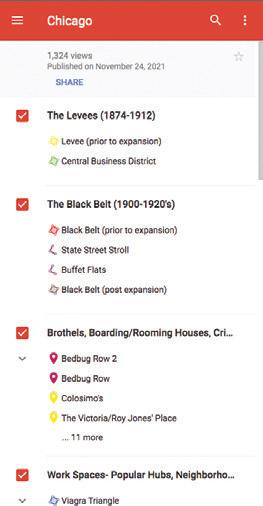

“It’s all racialized,” Cunt said. “For instance, the further south and west you go, the further deep into Black communities, you see more loitering laws that they are bringing back that are aimed at prostitutes and prostitution. This trickles down. Justice lives in certain neighborhoods and particular areas but I want people to see that there is literal terrain, there is a line in the sand.”

While a lot has changed in Chicago since the late 19th century, acceptance and respect for sex workers in the city has arguably not increased. There are multiple memorial sites listed in Red Maps to honor the over 75 women, many of whom were sex workers, who have been found murdered in the last 20 years. The majority of the cases are still open.

And Red Maps is also for them, to remember the missing and murdered sex workers Chicago hasn’t taken the time to get to know and continues to erase.
Peech says this erasure in the past and present is purposeful. While Peech is a feminist themselves, some feminist circles don’t consider sex work a feminist issue due to stigma.
“Everything begins and ends with the stigma that is around us, its puritanical nonsense about sex. But when I hear people and talk with people about it with this kind of passion that shows the fullness of the situation, that’s a really beautiful thing. We can only hope we continue to normalize erotic labor and talk about it.” v
AUGUST 18, 2022 - CHICAGO READER 23
ARTS & CULTURE R HEAUX HISTORY
@samstroozas
@heauxhistory on Twitter and Instagram
Peech (le ) and Rebelle Cunt (right, in Washington Park) coordinate their efforts to build the Red Maps Project. COURTESY
A recent screen capture of the Chicago Red Map shows neighborhoods of historic signifi cance layered with current hubs of sex work. COURTESY THE ARTIST visit www.BacklotBash.com for a full schedule! 16 bands over 3 days on 2 stages, including: Friday–Sunday August 26–28 ADMISSION FREE! SKOKIE DOWNTOWN Sunday 6:30 p.m. Tributosaurus becomes The Kinks Kid ‘n Play Saturday 8:45 p.m. Vertical Horizon Michael McDermott Carnival • Bingo • Car Show 5K & Kids Color Fun Run Family Entertainment • Food & Beer
THE RED MAPS PROJECT
SOLO PERFORMANCE
Maybe we’re crazy
Kellye Howard’s new one-woman show about mental health moves beyond stand-up.
By WANJIKU KAIRU
Have you ever been playfully called “crazy” and laughed, only to cry silently in the basement bathroom for two hours? No? Just me? Well, if you’ve ever stared into the abyss and questioned your own sanity for more than a hot second, Kellye Howard’s latest one-woman show, Crazy or Nah?!, running this weekend as part of Steppenwolf’s LookOut series, might be just what you need. Howard uses storytelling, poetry, and stand-up comedy to tell a winding story exemplifying resilience, the importance of introspection, and how to accept life’s greatest challenges. I connected with Howard to talk about the show. This is an edited version of our conversation.
Wanjiku Kairu: What has been your journey with comedy?
Kellye Howard: I’ve been doing stand-up for 16 years. I originally started as an actress

and went to Columbia for a while. While I was working at Foot Locker, someone said, “You’re really funny, you should try stand-up!” and I’ve been doing it ever since. Honestly I kinda tripped into it. I mean, I only knew about comedians like Lucille Ball, Richard Pryor, and Bernie Mac. I knew maybe three or four comedians. I thought Eddie Murphy was just an actor! While doing comedy, I found it to be very therapeutic. When it comes to stand-up, I’m trying to inch out of the scene. Crazy or Nah?! is more my speed. I like the space to entertain, educate, empower, and uplift. Comedy is one of those spaces that you can uplift and probably be funnier if you’re petty.
How did you evolve into theater performances?
Further into my comedy career I got into a bunch of di erent things which led me to writing. I played at ImprovOlympic [now known as
Howard COURTESY THE ARTIST
discovered we’re sad in some way and don’t have the answers we seek. I talked about the entire experience of being diagnosed.
How is Crazy or Nah?! similar and different to your earlier one-woman shows Unmarried and Transparent?
iO] and Second City for a while. I was always trying to find other spaces to create more storytelling. One of my favorite actors to work with onstage is [UK comedian] Gina Yashere. I just love being in theater spaces with her. She’s so genuine in how she tells a story, so authentically Nigerian. Gina is authentically lesbian, and she doesn’t give too many fucks. She’s older than me, and as you get older you really stop giving that many fucks. I’ve always valued being in theaters with her where I can adopt the same attitude.
What was the inspiration behind Crazy or Nah?!
Crazy or Nah?! is the summation of the journey I went on after being diagnosed with a mental illness. I began questioning the diagnosis’s accuracy, going through di erent journeys for someone to a rm or deny my experience. Waiting for “yes, you have it” or “no, you don’t,” I was not feeling confident. That process turned into a really powerful time of introspection for me. I began questioning the lasting e ects of childhood trauma and how much control we have over changing the narrative or falling in line with the summation of what you are now. Believing you are one way and now you’re another, versus going against the grain and asking how much control you have over a disease. You have the answers you seek.
CRAZY OR NAH?!
8/ 18 -8/21: Thu-Sat 8 PM, Sun 3 PM, Steppenwolf 1700 Theater, 1700 N. Halsted, 312 335 1650, steppenwolf. org, $27
Since 2013 I’ve been questioning if I’m crazy; that’s nine years! Asking, “Am I crazy? Well, am I?” I had a need to find the answer for myself and was not really satisfied. This show traverses my journey to try to find those answers. I’m telling stories to lead a person to believe whether they are crazy or not. I was going through all of these things within me at the time, and it really wasn’t received as well in a stand-up space. Nowadays people are way more open to talk about the hard shit. We all
Unmarried and Transparent were comedy-driven. I felt like, “I gotta get the joke in, I gotta make them laugh.” My new show is less about making you laugh and more about exploring what you feel. As an audience, I want you to be with me in certain moments. You will laugh, but feeling is way more important to me than in any other show I’ve written. I’ve built the show about the moments rather than the comedy. Besides, Unmarried was unprocessed. I was not processing what I was going through. I’m at the other side of the trauma and was going through the infidelity of my husband. I was writing the show in that zone, and it was all driven from this anger and emotion. It was not introspective, it was more vindictive, like, “I’ll show you.” Now, I have nothing to prove to anybody other than my better self in this show.
How have you held yourself accountable during this production?
This process has been very interesting; it’s been a lot of writing and rewriting and writing again. Did I mention that I wrote a lot? I have a very Jay-Z attitude, one and done. For this show, I told myself, “I got this,” but it has been new for me to have to rewrite so much. It’s been scary too, which has been fun. The fear has been very moving. It’s made me cry, it’s made me yell at my husband. It’s made me do so much. I’m learning about me—what works and what doesn’t. Respecting boundaries, respecting the people in the space. Being accountable for how I show up in these spaces. You know, just because you’re nervous or uneasy doesn’t mean you can treat people di erently. I’ve had to apologize many times in this show and it’s beautiful. As artists, sometimes we think we get a pass for being rude because we’re creating. I don’t think that’s fair. We have to be accountable for how we show up. Kindness is key, and you can’t treat anyone shitty because we’ve all had shitty days. If we were more accountable for how we show up, I think the world would be better because we’ll be checking ourselves constantly. v
@HolyBarbie
24 CHICAGO READER - AUGUST 18, 2022 ll THEATER
Kellye
R READER RECOMMENDED b ALL AGES F




































































































































































































































































































































































































































































































AUGUST 18, 2022 DER 25 Tickets start at just $20 | steppenwolf.org | 312-335-1650 | THE MOST SPECTACULARLY LAMENTABLE TRIAL OF MIZ MARTHA WASHINGTON SEPTEMBER 1 - OCTOBER 9 By
Directed by Whitney White Featuring ensemble member Celeste M. Cooper Don’t miss this bold, fantastical and daring remix of American history and celebrate the start of the season with a drink at our new Tap House patio! 2-FOR-1 TICKETS SEPTEMBER 1-10 WITH CODE READERBOGO GENESEE THE SPOTLIGHT IS CLOSER THAN YOU THINK THE 22_002287_GEN_Chicago_Reader_Randy_Rainbow_Ad_AUG_SEP_JT01Mod:August8,202211:12AMPrint:08/08/221:24:46PMpage1v7 203 NORTH GENESEE STREET, WAUKEGAN, IL BOX OFFICE HOURS: TUE – FRI 11 AM – 4 PM, SAT 10 AM – 2 PM TICKETMASTER: 800-982-2787 • PH: 847-263-6300 WE'RE SERVING UP THE LAUGH S! GENESEETHEATRE .COM SOMETHING READER FOR EVERYONE! store.chicagoreader.com
James Ijames
THEATER
RCAMPAIGNS, INC.
Through 9/ 18 : Wed-Thu 7: 30 PM, Fri 8 PM, Sat 4 and 8 PM, Sun 2 PM; Sun 8/21, 4 PM only; TimeLine Theatre, 615 W. Wellington, 773 281 8463, ext. 6, timelinetheatre.com, $ 42-$ 57 ($25 U.S. military personnel, veterans, first responders, spouses, and family; 35 percent off for students with valid ID)
Tyler Meredith and Yuriy Sardarov in TimeLine Theatre’s Campaigns, Inc. JOE MAZZA/BRAVELUX
pieces while creating the one-stop shop of political consultancy as a profession. Add in the American fear of the S-word in politics, and it’s not surprising that Sinclair lost to GOPer Frank Merriam.
and Grandt again) to back his latest attempt at a talkie, Modern Times, and also finds Sinclair’s socialism at odds with his own even leftier political stances—balks at first.
REVIEW
Screwball smear tactics
Campaigns, Inc. explores the origin of dirty tricks.
By KERRY REID
Politics has always been a “smelly kitchen,” to borrow a phrase from Jean Anouilh’s version of Antigone . But in 1933, two new cooks entered that kitchen. And the recipes they came up with continue to befoul the air of American elections.
Leone Baxter and Clem Whitaker (a widow and a married man who eventually became wed to each other) formed Campaigns, Inc. that year, and soon focused on the singular goal of stopping the Democratic candidate for California governor, writer Upton Sinclair, from taking office in Sacramento. At first glance, it would seem unnecessary: California was a ruby red state where no Democrat held statewide o ce, and nearly all of the members of the state legislature were also GOP. But Sinclair, an avowed socialist and previous two-time election loser who had decided for pragmatic reasons to run as a Dem (sound familiar?) won more votes in the primary than any candidate—red or blue—in state history. It was almost as if he were conjuring into reality the vision he laid out in his 1933 essay “I, Governor of California, and How I Ended Poverty,” written as his opening salvo. With the growth of pro-Sinclair EPIC (End Poverty in Califor-
nia) organizations across the state, as well as the new power held by Dems under FDR in Washington, conservatives were nervous.
But he who rises by his words can be undone by his words. That’s just one of the lessons contained in Will Allan’s history-play-by-wayof-screwball-comedy, Campaigns, Inc. , now in a world premiere with Timeline Theatre Company under Nick Bowling’s direction. Baxter and Whitaker, as played by Tyler Meredith and Yuriy Sardarov, are kinda like what you’d imagine Mary Matalin and James Carville would be like if both were conservative, and they were played by Irene Dunne and Cary Grant.
But the awful truth promoted by the two hungry operatives is really the product of what Sinclair called “the Lie Factory.” By taking sentences out of context from Sinclair’s fiction (“The sanctity of marriage. . . . I have had such a belief . . . I have it no longer”—lifted from Sinclair’s 1911 novel Love’s Pilgrimage ) and running them as ads in conservative media outlets like the Los Angeles Times and William Randolph Hearst’s papers, the two made the upright Sinclair sound like a flaming advocate of free love. They also used direct-mail hit
The strength of Allan’s script lies in its ability to go beyond easy binaries of Sinclair as a sinned-against political innocent and Merriam and the GOP as rapacious monsters. As played by Anish Jethmalani, Sinclair is an obviously decent man, but one more comfortable with the written word than public speaking (he apparently had a stutter, which carries echoes of the attacks on our current POTUS’s elocution). And though he’s running as a Dem, he’s reluctant to endorse FDR’s New Deal, even as he seeks the endorsement of the man himself, because, he says, “It’s not good enough.” That proves fatal in the end. Many candidates have found themselves hoist upon the petards of their own purity and their inability to suss out the need for compromise and coalitions to get where they’re going.
By contrast, Terry Hamilton’s Merriam is a red-faced blusterer straight out of a Preston Sturges comedy. He wants power for its own sake and isn’t particular about how to get it. However, even though it’s Meredith’s Baxter who comes up with the most e ective attacks on Sinclair (especially once the studios, fearful of writers unionizing, cooperate with smear newsreels), Merriam worries that his victory will be seen as riding the skirts of a woman. He demands that Baxter make peace with Whitaker after the two fall out over the latter’s family friendship with Sinclair. (Whitaker, stuck in what he claims is a loveless marriage, is clearly smitten with Baxter, like Grant’s Walter Burns trying to win back Rosalind Russell’s Hildy Johnson in His Girl Friday.) Meredith’s nearly palpable rage at her talent and vision being overlooked by men in charge sets the stage for the paradox of women in the GOP who succeed in a man’s world while pushing traditional gender roles. (Hello, Phyllis Schlafly!)
Meantime, Sinclair is trying to enlist the aid of both Roosevelts (David Parkes as FDR and Jacqueline Grandt as Eleanor, more popular than her husband and thus a thorn in his side). He’s also trying to get his old friend Charlie Chaplin (Dave Honigman) to come out for him publicly. But Chaplin—who’s trying to get Douglas Fairbanks and Mary Pickford (Parkes

So there are a lot of narrative balls in the air in Campaigns, Inc., sometimes to the detriment of the character development. But as a comic guidebook to how propaganda works, and how even the best candidate on paper can be demolished in three dimensions, it’s a peach. Allan has a sharp ear for ironic aphorisms—“They’re not lies. They’re different versions of the truth,” being one pungent example. (He also has fun dropping in references to steak as a nod to Sinclair’s most famous book, The Jungle, set in Chicago’s stockyards.)
Bowling, always a dab hand at midcentury pieces, brings the same sensibility and energy to a play that’s obviously paying homage to the films of the era. The ensemble is tight, with moments of gritty poignancy provided by Grandt as a pro-Sinclair waitress. Anthony Churchill’s black-and-white projections and Sydney Lynne’s flexible set bring flash, verve, and a visual reminder of just how fast the tides can change in politics.
In the end, it’s an open question as to how good a governor a rigid idealist like Sinclair would have been. But what’s absolutely beyond doubt is that Whitaker and Baxter set the low bar for political dirty tricks that have plagued us ever since. Campaigns, Inc. is a comedy, but given recent historic events, we know that tragic outcomes wait in the wings. v
@kerryreid
26 CHICAGO READER - AUGUST 18, 2022 ll
THEATER
OPENING
RThe Bechdel test


Fun Home gets a sublime intimate production in Aurora.


Alison Bechdel’s 2006 graphic memoir Fun Home, which became a Tony Award-winning 2015 chamber musical (music by Jeanine Tesori, book and lyrics by Lisa Kron), feels right at home on the intimate Copley Theatre stage in downtown Aurora. Presented as part of Paramount’s “Bold” series of seemingly more challenging fare than that at the flagship theater across the street, Jim Corti and Landree Fleming’s staging is practically note-perfect—as emotionally rich an experience as you’ll find anywhere onstage right now.



Three actors portray the budding cartoonist at different times of life: Emilie Modaff ’s grown-up Alison serves as narrator and tour guide, looking back on life in small-town Pennsylvania with her closeted and mercurial father, Bruce (Stephen Schellhardt), who teaches high school English and runs the family funeral home (hence the title), and mother Helen (Emily Rohm), who seemingly keeps her emotions buttoned up until it’s time to go onstage at the local community theater. (Shades of Revolutionary Road.)
















Small Alison (Maya Keane on the night I attended, alternating in the role with Milla Liss) tries to make sense of all the things that aren’t said in the family’s beautifully renovated vintage home, where everyone operates at a distance from each other, and where her “tomboy” ways and nascent artistic instincts are both smothered by her father’s obsession with order. He can’t control the chaos of family life, though, any more than he can control his attraction to younger men and boys. “We can make it better than a cartoon,” Schellhardt’s Bruce hollers at his daughter as she tries to explain why she chose that genre for a school project. He’s both proud of her talent and utterly dismissive of how she chooses to apply it, and that paradox runs throughout their relationship.



Fri 8 PM, Sat 2 and 8 PM, Sun 1 and 5:30 PM, Copley Theatre, 8 E. Galena Blvd., Aurora, 630-896-6666, paramountauroracom, $67-$74
When the swash buckles
Zorro: The Musical surrenders to tired stereotypes.
There’s a reason you rarely see Zorro: The Musical, the 2008 show inspired by a masked Spanish hero (conceived of by Johnston McCulley in 1919 and since the subject of numerous books and movies) who defeats evil and tyranny by expert swashbuckling. Scratch that. There are myriad reasons. Among them:
The musical (score by John Cameron and the Gipsy Kings, book by Stephen Clark and Helen Edmundson, lyrics by Clark) offers a deeply racist take on “gypsies,” reducing a complex culture and ethnic identity to a slur and a series of stereotypes centered on fluttering scarves, flowy skirts, and cartoonishly seductive women. The score is almost as monotonal as Gregorian chant. The plot is incomprehensible.


But perhaps the most glaring issue with Music Theater Works’s production, directed by Adrian Abel Azevedo, lies in the way it juxtaposes grimness with guffaws. As to the latter, Zorro offers a dictator who ruthlessly imprisons anyone who questions him and uses the military against peaceful citizens. There is an attempted gang rape. In one prolonged scene, we see the Guantánamo-like specter of a hooded prisoner, hands bound. But all the day is, we’re to believe, repeatedly saved by Zorro (Cisco Lopez), a Hamburgler-like clown who is as believable a hero as a week-old cheeseburger. Further, watching Nick Sandys’s fight choreography is akin to watching children trying out their new souvenirs from the Medieval Times gi shop.
The technicals in MTW’s production don’t help. The cast is swallowed up by the stage, leaving the impression that Jacqueline and Richard Penrod’s expansive set is vastly underpopulated. The ensemble o en seems to be singing in a different key than music director Justin Akira Kono’s nine-person pit orchestra. As for the flaming “Z” Zorro is known for, it’s about as fiery as a wet bag of Flamin’ Hot Cheetos. The entire endeavor clocks in at two hours and 45 minutes, including one 15-minute intermission and too many laborious scene changes to count.
—KERRY REID FUN
Medium Alison (Elizabeth Stenholt) acts upon her own closeted yearnings at Oberlin when she meets a woman, Joan (Devon Hayakawa), who turns her topsy-turvy, as expressed in the lyric, “I’m changing my major to Joan.” Music director Kory Danielson’s seven-piece band brings lovely texture and nuance to Tesori’s gorgeous score. If you’ve never seen this show, or have only seen it on a big proscenium stage, it may well be worth the trip to Aurora for this bountiful, aching embodiment of Bechdel’s story.

HOME Through 9/18: Wed 1:30 and 7 PM, Thu 7 PM,
—CATEY SULLIVAN ZORRO: THE MUSICAL Through 8/21: Wed 1 PM, Fri 8 PM, Sat 2 and 8 PM, Sun 2 PM, North Shore Center for the Performing Arts, 9501 Skokie Blvd., Skokie, 847-673-6300, musictheaterworks.com, $19.50-$106 v
AUGUST 18, 2022 - CHICAGO READER 27
Fun
Home LIZ LAUREN
NOW PLAYING THROUGH SEPTEMBER 18 615 W. Wellington Avenue (at Broadway), Chicago 773.281.8463 timelinetheatre.com
August 26 -September 1
Music Box Theatre, 3733 N. Southport
Full schedule and pricing at musicboxtheatre.com/events/noir-city-chicago-2022
‘Sexy and sinister’
Noir City: Chicago returns to the Music Box a er pandemic postponement.
By YOLANDA PERDOMO
Film historian, author, and Film Noir Foundation treasurer Alan Rode hosts Noir City: Chicago August 29 through September 1 at the Music Box Theatre. As told to Yolanda Perdomo, here’s what he had to say about the lineup and why it shouldn’t be missed:
MONDAY, AUGUST 29
The Sniper (1952) Dir. Edward Dymtryk
The Sniper is really the first Hollywood mainstream film about a serial killer. And it’s all set in San Francisco. It is one of the early films that delves into psychology and kind of what is retrospectively a ham-fisted manner with censorship and so on, but it’s really a serious movie.
The Face Behind the Mask (1941) Dir. Robert Florey
This stars the great Peter Lorre in what is really kind of a bookend performance to his
unforgettable turn in Fritz Lang’s M, where he plays an immigrant coming to New York, passing the Statue of Liberty, and he gets horribly scarred in a fire, and he has to turn to crime to make a living. It’s like the American immigrant story, turned on its head.
TUESDAY, AUGUST 30
All the King’s Men (1949) Dir. Robert Rossen
Now there’s a film that has relevance. Someone could flip a coin and say maybe Willie Stark (Broderick Crawford) is preferable to what we’ve had in the White House recently. All the King’s Men was the Best Picture winner for 1949. Crawford won the
It’s been a few years since Noir City: Chicago emerged from dark alleyways celebrating film noir, movies that embody the seedier side of everyday life. The pandemic paused the festival, an event that showcases a slate of films where the lines of good and bad are stylishly blurred in postwar America, but this year it’s back at the Music Box Theatre.
Noir City: Chicago returns on August 26 with amiable Film Noir Foundation (FNF) founder Eddie Muller (of Turner Classic Movies’s Noir Alley) hosting an opening-night tribute to the late James Caan ( Thief from 1981, 1993’s Flesh and Bone). After the weekend, film historian Alan Rode takes over presenting a week of movies, including several rarely seen noirs. Fans have welcomed the event’s return with open arms this year in Boston, Hollywood, Seattle, and the Bay Area.
“It’s very gratifying. A lot of people tell me that the Noir City shows are the first thing that they’re going back to a theater to see,” Muller says, adding the appeal of noir serves as a “gateway” to classic movies for people who don’t typically watch black-and-white films.
“They’re sexy and sinister,” Muller says. “They’re hard-edged and witty without being dopey.”
Anne Hockens, director of communications for the FNF, says female characters in
Oscar for best actor. Mercedes McCambridge, in an unforgettable performance, won best supporting actress. It’s really a great, dark film.
Scandal Sheet (1952) Dir. Phil Karlson
Another Broderick Crawford film, Scandal Sheet was really the emergence of one of the great action directors of the 1950s, Phil Karlson. Scandal Sheet was adapted from Sam Fuller’s novel The Dark Page, starring Broderick Crawford and John Derek. Karlson made a whole slew of really gritty, violent film noirs in the 1950s. After Scandal Sheet there was Kansas City Confidential , 99 River Street , Hell’s Island . . . One of his last movies was the 1973 film Walking Tall, which set new standards for violence. And made him a millionaire in his retirement.
noir films attract people as well, because the women aren’t ornaments or in need of rescuing.

“I think people tend to say they are either the femme fatale or the good girl, and they go way beyond that [in noir films],” says Hockens. “They’re not just there in relation to the male characters. They have a purpose and a story arc. And there’s a lot of film noir where women are the central characters.”
According to Rode, it’s easy to appreciate movies serving as a time capsule for midcentury aesthetics and themes we’re all familiar with.
“The stories are basically about the human condition. Lust, larceny, people who know what they’re doing is wrong. And they do it anyway,” Rode says.
This year’s films include political corruption ( All the King’s Men , 1949), mob-rigged gambling operations (711 Ocean Drive, 1950), a paranoid invalid no one believes (1948’s Sorry, Wrong Number ), an angry cop frustrating everyone (Detective Story, 1951), a newspaper with shady reader-baiting practices (Scandal Sheet, 1952), and of course, murder.
Although the FNF team loves showcasing noir films at screenings and events, their real mission is preservation; they’re dedicated to rescuing, restoring, and presenting Hollywood’s lesser-known noirs. To date, the FNF
WEDNESDAY, AUGUST 31
Detective Story (1951) Dir. William Wyler
That was based on a very famous Broadway play, directed by William Wyler, and includes great lead performances by Kirk Douglas, who’s turbocharged in this, and Eleanor Parker, who was nominated for best actress for her performance. The thing that Wyler did is that it’s a filmed play, but he took it and he let it breathe. He also used a lot of the original Broadway cast, including Lee Grant, who is still with us, who was blacklisted shortly after this movie.
711 Ocean Drive (1950) Dir. Joseph M. Newman
Kind of a weird title, but it’s really something that gave birth to the 1950s Kefauver hearings on organized crime. It’s where Edmond O’Brien is this electronic phone company whiz
28 CHICAGO READER - AUGUST 18, 2022 ll FILM
NOIR FOUNDATION
All the King’s Men FILM
FESTIVAL
CITY: CHICAGO
NOIR
has restored 14 movies, funded the striking of 15 new 35mm prints, and fostered the return of seven more. The Argyle Secrets, a recent restoration project, will be screened in a B-movie marathon on Saturday, August 27.
“We’re preserving the communal experience of being together in the dark watching these films on the big screen,” Rode says, “the way that they were intended.”









Muller says creating the FNF came out of necessity, when he was first asked to program festivals decades ago.
“I would say, ‘Wow, here’s a great movie that people don’t know about. We’ve got to show this,’” Muller says. “And then there wouldn’t be a print of that film.”



He thought asking the studios would make them available, but that wasn’t the case.
“Then it became, ‘Why are we not using the profits from our film festival to find these films and restore them, so they don’t vanish?’”




While the FNF focuses on film noir, Muller hopes others can create a space for films facing obscurity.




“I kind of wish somebody [would do] this for westerns and screwball comedies and 50s science fiction movies, because the same thing is going to happen with those movies as well,” laments Muller.
He’s introducing a double bill on Sunday the 28th, Flesh and Fantasy (1943) and Destiny (1944), as an example of an altered movie, now on the big screen in its intended form.





“It’s an anthology. Flesh and Fantasy has


three chapters, and there was a fourth chapter, but the studio removed the fourth chapter and released it a year later as a standalone movie. And so this is the only way you can see all four chapters together,” Muller says.
Along with the festivals, the FNF draws people into the noir experience with a quarterly digital and print magazine, a website highlighting noirs on TV, interviews with Muller, and other noir-soaked stories.
In June 2020, when COVID closed theaters everywhere, Hockens and Muller started a bimonthly “Ask Eddie and Anne” Facebook Live conversation that continues today.
“It’s supposed to be sort of just a way to keep in touch with people, since we weren’t doing the festivals. Then it sort of snowballed,” Hockens says.
“We don’t approach it like scholars, knowit-alls trying to impress each other,” adds Muller. “I love hearing the weird questions that people come up with. It’s just fun.”
But the live events are special for Muller, where he holds court with fans between movies.
“When I got into all this stuff back in the early 70s, if somebody did what I do now, they would have had him arrested. Right? People would go to the manager and say, ‘There’s some nut up here talking all about this movie. Can you have him removed from the theater, please?’” v
@yolandanews
who parlays his talent into running a wire service for the Mafia in Los Angeles. He climbs to the top of the heap and finds out it’s a long fall down to the bottom. It was shot all over Los Angeles on location and also shot in Palm Springs. A lot of great location photography, and it ends with this spectacular climax filmed at the Hoover Dam.
THURSDAY, SEPTEMBER 1
Playgirl (1954) Dir. Joseph Pevney
We close with two films that are not on DVD, Blu-ray, or streaming. One is called Playgirl with Shelley Winters as a chanteuse in New York trying to protect her friend—from the heartland of America—from the predatory designs of all these bad New Yorkers. This is really Shelley Winters unbound. You want to see the ultimate Shelley Winters scen-
ery-chewing performance? This is it. This film was essentially in a vault until 2019, when I was able to talk to Universal and they made a DCP (digital cinema package) for us to show. We screened it in Hollywood at Noir City there and I screened it in 2021 in Palm Springs. And that’s been it. It’s not anywhere else, but it’s quite a picture.

The Cruel Tower (1956) Dir. Lew Landers
This is another overlooked, forgotten movie with John Ericson and one of my favorite noir actors, Charles McGraw, as steeplejacks cleaning the tops of churches. You’ve got a love triangle, double crosses, and everything just piles up like a blender running on high speed. It’s a campy, fun movie. And so I’m excited that the audience in Chicago is going to be able to see both of these movies that are not available to be seen presently anywhere else. v
AUGUST 18, 2022 - CHICAGO READER 29 FILM PIONEERSOF PIONEERSOF QUEERCINEMA QUEERCINEMA P P Q Inpartnershipwiththe UCLAFilm&TelevisionArchive THRUSEPT.4 SISKELFILMCENTER.ORG/QUEERCINEMA PARISISBURNING•PARTINGGLANCES(35MM)•THETIMES OFHARVEYMILK(35MM)•COMINGOUTUNDERFIRE• TONGUESUNTIED•DESERTHEARTS•NITRATEKISSES(16MM) GENESEE THE SPOTLIGHT IS CLOSER THAN YOU THINK THE 22_001749_Chicago_Reader_Afrique_en_Cirque_Ad_GEN_JT01Mod:July11,20223:54PMPrint:07/26/224:14:15PMpage1v7 203 NORTH GENESEE STREET, WAUKEGAN, IL BOX OFFICE HOURS: TUE – FRI 11 AM – 4 PM, SAT 10 AM – 2 PM GENESEETHEATRE.COM TICKETMASTER: 800-982-2787 YOU WON'T WANT TO MISS THIS SHOW! Daring Acrobats • Stunning Contortionists • Colorful Costumes THURSDAY, SEPTEMBER 29 7:30 PM Kalabanté Acrobats Presents
‘Little things make a huge di erence’
By SHERI FLANDERS
As the national conversation around police reform has gained momentum, the general public is slowly being introduced to the massive shortcomings of the criminal justice system. The intent of the system has never truly been to rehabilitate, and that is no more acutely apparent than when incarceration intersects with folks struggling with mental illness. Filmmaker Margaret Byrne’s new documentary Any Given Day aims to shine a spotlight on this overlooked and vulnerable population.

Produced by Beti Films, Any Given Day follows the story of three Chicagoans struggling to succeed despite mental health challenges. As the blunt instrument of the carceral system is used as an ine ective proxy for mental health care, their troubles are compounded.
Byrne gives a short overview of the people at the center of the film—Angela, Daniel, and Dimitar, whom she observed over eight months—and shares a little bit about each of their journeys.
“Angela is a single mother of four children, two adult children and two minor children . . . Her journey is about getting custody of her son back while trying to manage life after being incarcerated.” Byrne muses, “I think that’s something me and Angela very much
have in common as single moms—when you fall apart, everything else falls apart. You are essential to the well-being of other people.
I think we learned that we have to take care of ourselves. And it’s a simple lesson, but it’s also a very di cult lesson, I think, for a lot of people.”
She continues, “Daniel was homeless for years. He was diagnosed with schizophrenia in Cook County. He’s in his early 30s. And it was through the mental health court program that he got into a program that NAMI (National Alliance on Mental Illness) runs called the Moving On Program, where you can move from a residential home into an independent apartment. And then the question is, are you getting the right services to be able to maintain your first apartment?”
She goes on to describe the third person in the film. “Dimitar immigrated here from Bulgaria as a child. He also went to UIC and graduated with a degree from UIC in anthropology. It was the summer after his graduation that he had his first manic episode. He didn’t end up getting arrested until a couple years later, and that’s what led him to the mental health court.
His mom, Gina, is really central to his stability, because she’s his caregiver. And so it’s also about the toll this takes on people that care for those that are struggling with their mental

illness and are in crisis.”
Filming the story of any vulnerable population requires a level of sensitivity, and Byrne took care to try to respect their stories. Byrne reflects, “You know, there are definitely times where I’d show up with the camera and not film, because it just wasn’t a good time.” Garnering that level of intimate access took time and trust, leading Byrne closer; it blurred the traditional sharply defined line between filmmaker and subject. Byrne says, “I mean, I think, for me, personally, documentary filmmaking is all about building strong relationships, particularly if you are setting out to tell somebody’s story, and they’re in a vulnerable position. And, you know, we had a lot of conversations, we spent a lot of time together, in so many ways I became their advocate.”
That necessary closeness meant that Byrne was also forced to look inward at her own personal mental health struggles. During the course of the film, the subject matter triggered her own mental health crisis, and she had to decide whether or not to include herself in the story or not. Byrne shares, “It became relevant, you know. It really became about all of us, and my intention in telling their stories was to help destigmatize mental illness. And so I felt that if I didn’t include something of myself, and my own history of mental illness,
that it wouldn’t be honest, and it wouldn’t be doing the work. I worked with a wonderful editor, Liz Kaar, who really helped to direct those parts of the film and make all that make sense.”
When asked how anyone can support those struggling with mental health, and how we can strengthen the fabric of our communities, Byrne says, “I think the film shows that little things make a huge difference, you know, just to pick up the phone for somebody, even though you’re tired—I’m going to show up for this person. And that’s a decision you have to make for yourself, but I think you just can’t look away from the things that are difficult and challenging, because that’s how people slip into crises. I think when you isolate, when you’re not in contact with other people—and I think that’s another lesson in the film is that being connected to other people really is important for everybody’s mental health.”
Though the film highlights the lack of resources for mental health, there are also some lifelines for those in crisis. In July the 988 health crisis number launched nationwide, a connection to the National Suicide Prevention Hotline. When the number is dialed, instead of dialing the police, callers will be connected to trained mental health counselors at the NAMI chapter in Chicago. Additionally, NAMI o ers a helpline for those seeking support and resources, including housing and legal help. NAMI can be reached at 833-626-4244. v
Any Given Day will air on Thursday, September 8, at 7 PM on America Reframed on the WORLD channel. A free streaming window will be activated September 8-22 at worldchannel.org/episode/ america-reframed-any-given-day/
30 CHICAGO READER - AUGUST 18, 2022 ll
@SheriFlanders
Margaret Byrne fi lms Angela near her Chicago apartment; a close-up of Angela ANJALI PINTO
LOCAL DOCUMENTARY
Chicago filmmaker Margaret Byrne’s intimate documentary Any Given Day aims to destigmatize mental health.
FILM
Find new film reviews every week at chicagoreader.com/movies

NOW PLAYING
R
Bodies Bodies Bodies
I liked DC League of Super-Pets, and I’m a fan of a lot of sophomoric slasher films. So I don’t necessarily need every movie to be aimed at my own demographic of aging fuddy-duddies. Still, and unfortunately, I really do seem to be too old for Halina Reijn’s black comedy
Bodies Bodies Bodies
The movie is set at a house party at a remote mansion, where a bunch of twentysomething slackers drink, do drugs, have drama, and play a murder party game. Then dead bodies start turning up for real, and the young people turn on each other and themselves like particularly narcissistic and incompetent dogs.
The target audience here, I think, is people who are peers of the partiers/victims. Viewers are supposed to recognize the would-be podcasters and the vapid codependents as friends they hate to love and love to hate. You’re meant to enjoy it the way you’d enjoy a really nasty gossip session.
I’m not the age of the protagonists, though. I’m the age of their parents. And it’s hard for me to get a lot of entertainment value out of watching recent college grads make some fairly understandable foolish choices and then immediately suffer horrific consequences. Yes, the partygoers here are supposed to be mostly very wealthy, and therefore fair game. But it isn’t like in Knives Out or Ready or Not where the rich are set on harming others. The protagonists—or antagonists, here—are too disorganized and hapless to damage anyone outside their own very limited circle.
The screenplay by Sarah DeLappe is witty in a mean-spirited way, and the acting is solid—Rachel Sennott is particularly good as the perpetually self-obsessed and hyperventilating Alice. I’m sure Bodies Bodies Bodies will have many enthusiastic fans. I’m just at the stage in life where I don’t take much pleasure in watching the kids hurt themselves. —NOAH
BERLATSKY R, 95 min. Wide release in theaters
R Bullet Train
Bullet Train, directed by former stuntman turned action director David Leitch, is a hyperviolent, comedic romp with an ever-expanding cast of antagonists stuck on a train hurtling toward an inevitably chaotic conclusion.
Ladybug (Brad Pitt) is an assassin who, a er a series of overly chaotic jobs, is looking to establish a new, more Zen outlook on life. Tasked with what should be a simple first mission back from some time away, Ladybug boards a bullet train from Tokyo to Kyoto, planning on a one-stop suitcase grab. Things quickly go awry as the occupants of the various train cars have violent schemes of their own.
Bullet Train’s biggest feat is its own understanding of merging its chaotically Looney Tunes-level of violence
FILM
with some genuinely interesting storytelling turns, and its use of Brad Pitt’s comedic sensibilities to their utmost. The film contains an ostensibly ensemble cast, rolling out cameo a er cameo and bringing together comedic performances from a wide-ranging set of well-known talent, including Sandra Bullock, Brian Tyree Henry, Joey King, and Bad Bunny, among others. Pitt is the star of the show, though, carrying the movie with a charisma that works so well in comedic settings, especially in the later stages of his career. —ADAM MULLINS-KHATIB R, 127 min. Wide release in theaters
R She-Hulk: Attorney at Law
The first four episodes of She-Hulk: Attorney at Law are an absolute delight. Thankfully the show dispenses with a lengthy origin story, opting repeatedly for quick and to the point, getting right to the action that audiences want to see and then making fun of itself for doing just that. This self-awareness permeates the show which stars Emmy Award-winning actress Tatiana Maslany (Orphan Black) as sometime-Hulk Jennifer Walters, a lawyer focused on superhero-centered cases. Maslany is superb as the sharp, funny Walters who, in keeping with the comic, o en breaks the fourth wall to address the audience and acknowledge what everyone expects of a show like this, such as cameos from the likes of Bruce Banner/The Hulk (Mark Ruffalo), Emil Blonsky/Abomination (Tim Roth), and Wong (Benedict Wong) as well as one surprise teased in the trailer, fellow superhero lawyer Matt Murdock/Daredevil (Charlie Cox). Walters struggles with her desire to be a lawyer against her inability to ignore that she can change back and forth into a tall, green, musclebound superhero who constantly garners unwanted attention. She laments that she gets hired because she is She-Hulk instead of for her legal prowess, and the show does a fine job of integrating salient issues of feminism and tokenism with humor without ham-handed preachiness. She-Hulk is the kind of smart, funny production that proves that like Ms. Marvel, Thor: Ragnarok, or Guardians of the Galaxy Marvel is at its best when it combines self-conscious humor with great storytelling. —JOSHUA FLANDERS TV-14, nine 30-minute episodes, dropping weekly on Disney+ v

AUGUST 18, 2022 - CHICAGO READER 31
She-Hulk: Attorney at Law MARVEL STUDIOS
R READER RECOMMENDED b ALL AGES N NEW F
PRESENTED BY
The man who built lasting cathedrals inside Black music
Brilliant Chicago arranger Charles Stepney gets his flowers at an ambitious Millennium Park concert that doubles as a celebration of his first-ever solo album, released 46 years a er his death.
By AYANA CONTRERAS
In 1970, DownBeat magazine called Charles Stepney “one of those unseen workhorses whose business is other people’s success,” and I’ve never heard this supremely creative soul described more succinctly. Born and raised in Chicago, Stepney was a brilliant composer, producer, and arranger, and though he got his start playing the vibraphone, he grew into an exceptionally prolific multi-instrumentalist. He reportedly heard fully fashioned orchestrations in his head, almost like magic.

Stepney shaped indelible sonic foundations for a who’s who of Chicago-based artists, among them Minnie Riperton, Ramsey Lewis, Muddy Waters, Howlin’ Wolf, the Dells, Terry Callier, the Emotions, Rotary Connection, Eddie Harris, Little Milton, Deniece Williams, and Earth, Wind & Fire. He did much of this work as an in-house arranger and producer for the vastly influential Chess Records family of labels, a gig he began in 1966.
Because Stepney died in 1976 at the tragically young age of 45, the world didn’t get to hear the music he made himself. During his life-
time, he never saw the recognition he brought to others. This fall, Chicago-born record label International Anthem hopes to pull back the veil, so to speak, with the first-ever Charles Stepney solo release. Due on September 9, the double LP Step on Step consists of tracks he created alone, in a basement studio in his south-side home, in the late 1960s and early 1970s.
Among Stepney’s key collaborators was mythic jazzman Ramsey Lewis, who worked with him for many years on astonishing albums such as Sun Goddess (1974), Maiden Voyage (1968), and Mother Nature’s Son (1968). “Charles Stepney could take music paper, manuscript paper, and write a full score for symphony orchestra, or big band, or for trio, like we would write a letter,” Lewis said in a 2009 trailer for a documentary called Interrupted Greatness: The Charles Stepney Story . “Sometimes with a piano, sometimes not. Sometimes on an airplane with just manuscript paper, and you would see him just writing away.”
Those “letters” included the arrangements
for an eclectic assortment of forward-leaning 1960s and 1970s Chicago music: to name just a few, the title track of the 1968 Junior Wells album You’re Tuff Enough , the 1969 record Upchurch by jazz guitarist Phil Upchurch, the infamous plugged-in Muddy Waters LP Electric Mud , the output of soul quintet the Dells for Chess imprint Cadet, soul-folk work with Terry Callier, and Deniece Williams’s 1976 debut album (which followed a handful of singles on small local labels such as Toddlin’ Town, recorded as Deniece Chandler).
Stepney played a huge role in Rotary Connection, a psychedelic, interracial rock-soul band fronted at one time by Minnie Riperton and Sidney Barnes. It formed in 1967 when Marshall Chess, son of Chess founder Leonard, recruited Stepney as the arranger for a new group that would help anchor the adventurous new Cadet Concept imprint. Stepney found his way into the group photo that graces the cover of their final album, 1971’s Hey, Love (he’s the one sitting down with a cigarette in his hand).
Though probably best known as a launching pad for Riperton, Rotary Connection is also re-
membered for the ornate, o -kilter orchestrations Stepney supplied for tracks such as “I Am the Black Gold of the Sun,” “Memory Band,” and “Peace at Least.” Written for the band’s Christmas album by Artie Feldman (then a 23-year-old student), “Peace at Least” exults in the notion that Santa must be high “’cause he smokes mistletoe.” Though Stepney was pretty straitlaced, his arrangement evokes the image of Santa catapulted into the air, filled to the brim with joy . . . and high as a kite.
In 2008, Marshall Chess shared with me how the grand experiment of Rotary Connection came about—he’d had “the keys to the recording studio” and could do as he pleased at night. Stepney told DownBeat the story in 1970: “I arranged related percussion and some new-stream vocal,” he said. “[Marshall] Chess was so impressed with the thing, we took the studio kids that did the work and gave them a name—I think it was Chess’ idea—Rotary Connection. We did a whole album of the stu , a little Moog, a little electronic alteration, and the style caught on instantly.” According to Marshall, the name actually came from a

32 CHICAGO READER - AUGUST 18, 2022 ll
MUSIC
CHARLES STEPNEY: OUT OF THE SHADOWS Rotary Connection 222, a large ensemble led by bassist Junius Paul, will perform music from the catalog of Charles Stepney under the creative direction of the Stepney family and Chicago record label International Anthem. Damon Locks & Black Monument Ensemble open. Thu 8/18, 6:30 PM, Pritzker Pavilion, 201 E. Randolph, free, all ages
young ad executive named Roland Binzer. Stepney’s arrangements have often been classified as “baroque soul,” towering high above earthly things. Guided by a copy of the 1930 book New Musical Resources by Henry Cowell, which was at the time out of print, Stepney developed an a nity for polyrhythms, syncopation, tasteful overmodulation, and judiciously deployed electronics. His distinctive aesthetic and expansive sound—exemplified by myriad iconic tracks, including “Can’t Hide Love” by Earth, Wind & Fire, “Free” by Deniece Williams, “Les Fleur” by Minnie Riperton, and “Stay in My Corner” by the Dells—continue to enchant generations of listeners, many of whom don’t know his name.
The release of Step on Step promises to introduce lots of new people to Charles Stepney, and I know the joy of that discovery deep in my heart. The first time he made his presence known to me was decades ago.





It was the mid-1990s, and I was barely 16 when a record-store owner, sitting behind the counter, told me he had a record I had to hear. He dropped the needle and played “Dancing Girl” by Terry Callier. We sat silently for the duration of the track, nearly nine minutes. Everything after that moment was di erent. I was different. That record sounded like a self-assured freedom I had yet to know. I wanted to live in that song.
Because “Dancing Girl” appeared on the 1972 LP What Color Is Love , recorded and released in Chicago by Chess subsidiary Cadet, I realized that Stepney could quite possibly still be with us—he could even be in my city. This was pre-Google, so the mystery swirled in my head for a year or so before the answer manifested in my grandmother’s basement: the notes on the orange, blue, and black inner sleeve of Earth, Wind & Fire’s 1976 album, Spirit, listed Stepney as cowriter, coproducer, and arranger, as had EW&F’s three previous albums. But unlike those other records, this one was dedicated to him too.
“With every band, the departure of spirit must take place. It is a destiny that is inevitable,” read the liner notes. “We, Earth, Wind & Fire, were blessed to have had a gifted spirit work among us. He has now departed to the next plane. He left us with much beauty and inspiration for humanity to feed upon. The
works in this album are dedicated to Brother Charles Stepney (1931-1976). May God embrace his spirit with love.” My heart dropped.
In his posthumous 2016 memoir, Earth, Wind & Fire founder Maurice White detailed the role Charles Stepney played in crafting what White called the “EW&F mystique.” Discussing “Can’t Hide Love,” White noted that “it’s the end vocal arrangement in the vamp of the song that people seem to remember. Charles had the strings playing a haunting, almost monastic melody, and Philip and I topped it o . To our fans, it sounded like Philip and I were monks chanting in an old monastery.”

The 1975 smash “That’s the Way of the World,” White wrote, started as a basic track Stepney gave him, and its “melancholy yet hopeful chords set the tone” for the lyrics, which White composed with his brother Verdine. And now, nearly 50 years later, we can hear that historic tape—the original track Stepney gave to the band, recorded in his basement—on the forthcoming Step on Step. Hearing it is a way to parse out the musical essence of a man who was all too often rendered invisible, standing in the shadows of his larger-than-life output.
It’s nothing short of startling to hear this classic jam laid out in its embryonic formation—just a Moog solo and overdubbed keys supported by a Latin-tinged drum-machine cadence. The rest of Step on Step (for which I wrote the liner notes) is just as surprising and revelatory. Stepney’s three daughters—Eibur, Charlene, and Chanté—note that before his untimely death, he intended to release a solo album, to finally foreground himself after so much work in the background.
That’s not to say Stepney thought his name needed to be on the cover of every record he touched—he thoroughly understood the significance of his behind-the-scenes musical contributions. Maurice White divulged in his memoir that Stepney “often” told him that “the Beatles without George Martin would have just been a bar band.”
Stepney clarified the point in his 1970 DownBeat interview. “I guess it’s no mystery who the real talent behind a group like the Beatles always was—George Martin, their producer!” he said. “Hate to shatter so many balloons, but no way could those four have pooled all the instrumental and electronic complexities involved in ‘Day in the Life’ or ‘Eleanor Rigby’ or ‘I Am a Walrus.’ Any trained ear can easily spot the songs the Beatles produced alone. They’re repetitive and shallow—you know, same three
AUGUST 18, 2022 - CHICAGO READER 33
Charles Stepney started out playing vibraphone and grew into a prolifi c multi-instrumentalist. PHOTOS BY RUBIE STEPNEY (LEFT) AND COURTESY THE STEPNEY FAMILY
Vintage photos of Charles Stepney and his family, used as artwork for digital singles from Step on Step : from top, Charles setting up drums for daughter Eibur, Eibur and Charles, daughter Charlene and Charles, daughter Chanté, Charles and wife Rubie ALL PHOTOS BY RUBIE STEPNEY EXCEPT CHARLES AND RUBIE COURTESY THE STEPNEY FAMILY
MUSIC 9/7 Yehya Khalil 9/14 La Temática 9/19 Bnat Al-Hourayiat & Esraa Warda WORLD MUSIC WEDNESDAY SERIES FREE WEEKLY CONCERTS, LINCOLN SQUARE OLDTOWNSCHOOL.ORG 4544 N LINCOLN AVENUE, CHICAGO IL OLDTOWNSCHOOL.ORG • 773.728.6000 THURSDAY - SATURDAY, AUGUST 25 - 27 Fretboard Summit 2022 with performances by Milk Carton Kids, Molly Tuttle with Courtney Hartman, Julian Lage, Bobby Broom & Fareed Haque, and more! SATURDAY, SEPTEMBER 10 8PM Josh Rouse In Szold Hall SATURDAY, SEPTEMBER 17 8PM Big Bad Voodoo Daddy In Maurer Hall SUNDAY, SEPTEMBER 18 3 & 7PM Jake Shimabukuro In Maurer Hall FRIDAY, SEPTEMBER 23 8PM Joe Purdy In Maurer Hall SATURDAY, SEPTEMBER 24 8PM SUNDAY, SEPTEMBER 25 7PM Watkins Family Hour In Maurer Hall SUNDAY, OCTOBER 2 7PM Mississippi River Suite written & directed by Michael J. Miles featuring Zahra Glenda Baker with Lloyd Brodnax King & Jill Kaeding • In Maurer Hall FRIDAY, OCTOBER 7 8PM Dar Williams All Request Show • In Maurer Hall FRIDAY, OCTOBER 7 8PM Trace Bundy In Szold Hall SATURDAY, OCTOBER 8 7:30PM David Wilcox with special guest Jean Rohe • In Szold Hall UPCOMING CONCERTS AT NEW SHOWS ANNOUNCED • ON SALE NOW 11/10 Abigail Washburn & Wu Fei 11/20 Zoë Keating
World Music Wednesday Season On Sale Now!
Fall
MUSIC
chords and that unmodified beat.” Shots fired! A product of Wilson Junior College’s music theory program, Stepney was a big booster for the arts of arrangement and production. “These Sinatras and the rest need to be played like instruments into the whole musical picture, even though that picture may exist around them,” he concluded. The same year as that interview, while Stepney was arranging and producing Minnie Riperton’s 1970 solo debut, Come to My Garden, he also composed a classical-jazz symphony titled Cohesion. It was performed by Riperton, the Minneapolis Symphony Orchestra, and the Ramsey Lewis Trio.
For the Stepneys, releasing Step on Step has been a labor of love—the culmination of many years of work by his daughters and by his widow, the late Rubie Stepney, to keep Charles’s spirit and legacy alive.

In May, I moderated a conversation on the porch of the Hideout with Eibur, Charlene, and Chanté, organized by International Anthem as the first event in a series the label called the Summer of Stepney. “I didn’t know about how long-standing the work would be, but I thought it was amazing and beautiful work, and my mother did too,” recalled Eibur, Stepney’s oldest daughter. “My mother complimented him all the time on his effort and the caliber of the work that he was doing. So I think that honoring his work was a family tradition.
“We did know that, at that time, the level of orchestration that he committed to was not necessarily marketable. And I remember when he released the Come to My Garden album for Minnie Riperton, it was a big dispute between him and the marketing department [of GRT Records], because they did not know where to place it and they didn’t push it. And my father wrote a letter saying, ‘I painstakingly wrote every note for every instrument, and the least you could do is give it the respect it deserves so that people can hear it.’”
A few years after Come to My Garden came out, Stevie Wonder coproduced Riperton’s second album, Perfect Angel, which featured her breakthrough single, “Lovin’ You.” He was also a huge fan of Stepney’s work on her debut. “Stevie Wonder wrote my dad a letter and said, ‘I’ve worn out so many copies of this album. It’s brilliant,’” Eibur said. And many years later, “Les Fleur,” a noncharting single from Come to My Garden , enjoyed a renais-
sance of sorts: most recently it was prominently featured at the conclusion of the 2019 horror film Us, in the fourth episode of season three of Atlanta, and in episode three of the 2021 horror drama series Them
Much of Stepney’s music is lauded today primarily by crate diggers, but he also contributed to so many solid hits that his work—and in some ways his spirit—has never left the atmosphere. His youngest daughter, Chanté, was only a toddler when he passed away, but his brilliance reached her anyway. “My experience is so di erent from [Eibur and Charlene’s], and knowing that, did [I] know it was going to be great?” she said at the Hideout. “Well, it was just always great for me. It was ever-present. It was on in the house, it was on in the grocery store, it was on in the elevator, and ‘Oh, that’s daddy. Oh, that’s daddy.’ Those are my earliest memories of my father, are sound clips, the soundtracks of our lives everywhere you go, followed by, ‘That’s daddy. That’s daddy.’”
Chanté also had a unique vantage point on the resurrection of Charles Stepney’s music by DJs. “During my time at Howard University, it was the 90s,” she said. “It was the height of hip-hop and oh my gosh, were they in my daddy’s crates? I had no idea. So I’m at a party and I’m having a ball because Biz Markie is the DJ, and he was just everything . . . and ‘Bonita Applebum’ comes on, and of course the crowd goes crazy, having the time of our lives.” For that track, A Tribe Called Quest had prominently sampled “Memory Band” by Rotary Connection. “And I think six months later, when Charlene’s dealing with the attorney trying to get paid for that sample, they’re like, ‘You mean you knew this song?’”
Charlene interjected, “It was paying your college tuition.”
Not only did the family know about the song, Charlene and Eibur are among the children singing on it. Charlene has told me it was dedicated to the children of the band.
At a Summer of Stepney talk I moderated at Kenwood Gardens on Father’s Day weekend, Charlene shared that their father was “stern, but he was so much fun. He loved magic tricks. He loved to make pallets in the summer so we all slept on the floor with him, under the fan. . . . We would wake up with a cold, but it didn’t matter because we were with daddy.”
A few weeks back, I was breaking bread with Alex E. Chávez of Chicago band Dos Santos, who’s also an associate professor of anthropology at Notre Dame. Over patatas bravas, pan con tomate, and olives, the conversation veered toward Charles Stepney. I told him about a story Maurice White had relayed in his memoir: after Stepney su ered his first major heart attack in early 1976, he told White that if anything happened to him, fellow Chicago arranger Tom Tom Washington was the only one who could complete the work.
Chávez comes from Texas, but even as an outsider he immediately recognized the tale as a perfect illustration of what he called the “work ethos of Chicago.” Stepney was near death and was still concerned with making sure that the work, which is eternal and bigger than him (bigger than all of us), would be seen through. After Stepney succumbed to a second catastrophic heart attack in May 1976, White reached out to Washington, who ultimately
took over arranging duties for Earth, Wind & Fire as well as the Emotions.
Every time someone plays Earth, Wind & Fire’s “Reasons” at a wedding or even the Fugees’ “Killing Me Softly” at the grocery store (it also samples “Memory Band”), Stepney’s singular magic is reanimated. And even before Step on Step comes out, his legacy will be further uplifted by a concert in the Millennium Park Summer Music Series called “Charles Stepney: Out of the Shadows.”
The Summer of Stepney culminates on Thursday, August 18, at Pritzker Pavilion, with International Anthem labelmates Damon Locks & Black Monument Ensemble opening for Rotary Connection 222, a new band led by bassist-composer Junius Paul and created in collaboration with the Stepney family.
Rotary Connection 222 began this spring as a modest combo with drummer Makaya McCraven, keyboardist Alexis Lombre, guitarist Jackson Shepard, and vocals by Meagan McNeal and Stepney’s granddaughter Brandice Manuel. For this concert, however, it will grow to nearly two dozen members—including seven string players, five vocalists, and a fivepiece horn section—performing new arrangements by Paul, saxophonist De’Sean Jones (who’ll also be in the ensemble), and guitarist Je Parker. As the group’s full, rich orchestrations ring out under a summer Chicago sky, Stepney’s indomitable spirit will live on. v
34 CHICAGO READER - AUGUST 18, 2022 ll
@ReclaimedSoul
continued
33
from
Members of Rotary Connection 222 with the Stepney family: De’Sean Jones, Jackson Shepard, Junius Paul, Brandice Manuel, Charlene Stepney, Chanté Stepney, Eibur Stepney, Alexis Lombre, Makaya McCraven, and Meagan McNeal BRIAN ASHBY






























AUGUST 18, 2022 - CHICAGO READER 35 Let’s Play! Make time to learn something new with music and dance classes at Old Town School! We offer flexible schedules for all skill levels both in-person and online. oldtownschool.org Sign up for classes today at MUSIC CLASSES FOR ADULTS & KIDS LINCOLN SQUARE LINCOLN PARK SOUTH LOOP & ONLINE OTS_1_2V_ClassAd_072921.indd 1 7/23/21 2:21 PM (847) 673-6300 WWW.MUSICTHEATERWORKS.COM AUGUST 11, 2022AUGUST 21, 2022
MUSIC
Patrixia, in-person and livestream DJ
As told to MICCO CAPORALE
Patrixia reigns supreme in digital clubspace. It’s where the 29-year-old DJ feels empowered to be her spookiest, silliest Latinx self. Locally, she’s known for DJing goth and industrial parties at venues such as Berlin and House of Vans, but online she has a rabid Twitch following who tune in three days a week to hear her blend reggaeton and cumbia with industrial and techno. What started as an eleventh-hour attempt to make extra money during the pandemic has become Patrixia’s full-time job, and

she expects digital performances to become the future of clubbing.
Patrixia was born in Chicago, and her DJing draws on her emotional journey growing up in the Belmont Cragin neighborhood—which led to a love affair with all things danceably macabre. Now she shares that passion with people across the world, performing in games like Final Fantasy and Animal Crossing . She also has a less formal music project, Choke, with her partner, Garrett Vernon of Replicant.
Thu 8/18, 8 PM, Sleeping Village, 3734 W. Belmont, free, 21+
Patrixia plays Sat 8/20 at 4:30 PM on the Fiesta Stage. The festival runs Fri 8/19 through Sun 8/21. Union Park, 1501 W. Randolph, single-day passes $105.74-$260.24, three-day passes $208.74-$620.74, all ages
COURTESY THE ARTIST
Iwas always fascinated with synthesizers. When I was little, I fell in love with Selena. She was my idol. To this day, I love Selena. A lot of her music has synthesizers. My dad’s side of the family were Tejano musicians, which is that same genre of music. So synthesizer music was always around me. I’ve always loved Depeche Mode, and by high school, I was really into bands like Ladytron, CSS, and the Faint. And that set me on a path for minimal wave and goth. I didn’t find Wax Trax! until I was 25—which I hate admitting, but it’s true!
When I was about ten, I got into emo, and I was in an emo band in middle school. I played bass and sang. It was hard to keep a band going that young, though. Our guitarist moved to the suburbs. We couldn’t find a drummer. As much as I wanted to keep being in a group, I really couldn’t.
Growing up, it was just me and my mom. My older brother and sister had moved out. We didn’t have a lot of money. I started experiencing depression around 12, and when I got to high school, that was hitting really hard. I was in AP courses, so I was swamped with homework all the time. I tried to keep my schedule full so I wouldn’t have any time to think.
I think my mental health was so bad from living in poverty. Belmont Cragin is a predominantly Latinx neighborhood. It’s poor and working-class. A lot of us grew up very fast. We saw friends get hurt or die from being in gangs. I didn’t have a good relationship with my dad. . . . I had a lot clouding my mind. I also didn’t have the means to find new bandmates. I couldn’t just go out looking for people or jump across town to practice. If I couldn’t access it through my school or neighborhood, it wasn’t going to happen for me.
I went to a vocational high school, and me and my friends would sit in our graphic-design class listening to Pandora. That led me to this whole world of electroclash. I found Peaches— Peaches was so influential on me! Like, I was a virgin listening to “Fuck the Pain Away,” but it was just such a jam!
This was around 2007. The only dance music I had heard was house, footwork, and Detroit techno. This was such a different sound. It just exploded my brain. I’d sit there trying to pick stu apart, like, “OK, what’s making this
sound?” And then, “Ooh, this sounds like this.” Those were some of my best days as a kid. When I was 22, I graduated from UIC and got a social media internship at JBTV . I learned how the music industry works and met my mentor, Greg Corner. He was the music director and programmer at JBTV, and he was DJing an indie night at Beauty Bar at the time. I remember dancing there one night, and I was already imagining mixing what I was hearing into other songs. I approached Greg and was like, “I want to be a DJ.” And he was like, “Yes!” In 2017, he got me a Wednesday-night spot at Debonair, and I learned as I went.
It’s funny. I was never super confident in my DJing and never expected to support myself with it. I thought I’d always be a behind-thescenes music worker. After my time at JBTV, I started working in music, doing pretty much anything that’s part of concerts. When COVID19 hit, I was set to go on tour doing merch for a band. Five days before shutdown, our tour gets canceled, and I lose all my DJ gigs. I was like, “What am I going to do?”
I got a couple grants for music workers, but by August 2020, I was burning through my savings quickly. I was horrified. I knew a lot of DJs had gone on Twitch, and some of them were getting paid for it. I was like, “Well, I know how to DJ. . . . ”
Before Twitch, I wasn’t a very interactive DJ. I figured I’d spin while people worked from home, then get on the mike and be like, “Drink your water,” “Get up and stretch”—stu like that. If you have Amazon Prime, you can get one free Twitch subscription per month, but it still puts money in the streamer’s pocket. So I advertised that on Instagram, and immediately I got $50 worth of subscriptions. Then a month later I got to $100 in subscriptions. People would Venmo tips during my sets too, so I made about $200 that September.
In October, a friend hooked me up with a warehouse job. It was part-time, so it wasn’t enough for rent. I’d work at the warehouse, then come home and stream. One day this girl emails me like, “Hey, I saw you on Twitch. I play this game called Final Fantasy, and I was thinking of opening a nightclub in the game and having a DJ. Would you be interested?”
I don’t want to say I was weirded out, but I
36 CHICAGO READER - AUGUST 18, 2022 ll
CHICAGOANS OF NOTE
“DJing online has opened my eyes a bit. There’s a lot of people who club online for different reasons.”
PATRIXIA X DJ BABY BERLIN
RUIDO FEST
definitely was suspicious. She was like, “We get together virtually. We’re happy to pay you.” And I was like, “Logistically, I don’t know what you mean, but if you’re willing to pay me, yes, absolutely!” She paid me $150 to DJ for a couple hours on Twitch while her and her friends hung out in the game. I didn’t even have the game.
Fifty or 60 people showed up to my stream, and I was like, “Whoa, this girl brought me a lot of viewers and she’s paying me!” I was playing darkwave and just . . . goth music, and these people were like, “Oh my god, what is this? It’s so cool.” They started throwing down money on my channel. That first night, I made about $400. I was sobbing on camera—just mascara running. And they were like, “This is awesome, do you want to do it again next week?” About a month later, I was making more money online than I was making at the warehouse, so I quit. Playing for that girl and her club didn’t last very long, but she kept encouraging people to come to my channel and book me for their clubs. Then people who’d seen me play for her would reach out. I’m on a break from playing virtual clubs right now, but gamers have always brought me a lot of viewers, and then some of those become subscribers.

We have a whole community with inside jokes. I’m really interactive on Twitch, like dressing up in different outfits and using props and Snapchat filters. Just being silly. I’ll say, “It’s techno cumbia time,” and that means I’m going to mix Selena’s “Techno Cumbia” with Nine Inch Nails and play this video that mixes Selena clips with Nine Inch Nails clips. I have specific emojis for it and everything. People get really excited. I love mixing Latinx music with darkwave and industrial.
Twitch is my bread and butter now. I’ve had nights where I’ve made $1,000. One time in January, I made $8,000. It still freaks me out



thinking about it, because I grew up with no money. Seeing that amount . . . it was surreal.
A lot of times I’m only making $120 a stream, especially in the summer. I get more money from streaming during the winter, but this has opened up a lot more in-person opportunities.


I’m playing festivals for the first time. A lot of that has come from showing I have over 4,000 followers on Twitch. Actually, I just hit 4.5k, and I have over 500 subscribers.
I feel much safer online. If someone’s acting up, I can just ban them. When I was DJing in person, people would grab me. They’d linger around the DJ booth or try to get my number or refuse to leave. People you don’t know bring you drinks and try to pressure you to drink them. It makes me nervous. Are they gonna be waiting for me outside the club at five in the morning? Will this person follow me home?
A lot of shitty things have happened DJing in person, and you can’t always count on the club to support you.
DJing online has opened my eyes a bit. There’s a lot of people who club online for di erent reasons. I have parents who put their kids down and online clubbing is their night out. Some people have been like, “I have autism, so I don’t feel comfortable at clubs. I club in Final Fantasy.” A ton of people tuning in are immunocompromised, or they live in the middle of nowhere. I’m like, man . . . we should’ve had these options a long time ago.
I think in-person clubs should be aiming for hybrid scenarios, because I think this could be the future of clubbing. Of course, clubs would have to change their infrastructure. There’s a lot of technical aspects and showmanship involved. But places like Lollapalooza and Tomorrowland do big livestreams. It’d be cool to see them utilize that to its full capacity. v
AUGUST 18, 2022 - CHICAGO READER 37
Patrixia (facing forward at center, with wings and horns) livestreams a DJ set in Final Fantasy. COURTESY THE ARTIST
@JuggaloReporter
PATRIXIA
TBD.
Other acts and cover charge
Thu 8/25, 10 PM, Berlin, 954 W. Belmont, 21+
ARC MUSIC FESTIVAL
a day and time to be announced. The
runs Fri 9/2 through Sun 9/4. Union Park, 1501 W. Randolph, single-day passes $129-$179, three-day passes $279-$1119, 18+ 3730 N CLARK ST METROCHICAGO.COM @METROCHICAGO SMARTBARCHICAGO.COM 3730 N CLARK ST | 21+ SATURDAY AUG 20 Manifest presents SCUBA / STEVE NOAH ZOOEY GLASS / ABIGAIL FRIDAY AUG 19 Diamond Formation BORED LORD ARIEL ZETINA / FUJ FRIDAY AUG 26 Obscure + Format present LINDSEY HERBERT ANGELO RIZZO JASON MENDELKE SUNDAY AUG 21 / 9PM / 18+ A METRO 40TH ANNIVERSARY CELEBRATION PEACHES + Sophie Powers SATURDAY SEPT 10 / 8PM / 18+ A METRO 40TH ANNIVERSARY CELEBRATION THE AFGHAN WHIGS + Pink Mountaintops THURSDAY AUG 25 / 7PM / ALL AGES IDKHOW
JOYWAVE The Welcome to Hellvetica Tour + Savannah Conley FRIDAY SEPT 16 / 11PM / 18+ RIOT FEST LATE NIGHT SUNNY DAY REAL ESTATE + The Appleseed Cast SUNDAY AUG 28 / 8PM / 18+ HEAR IN
Celebrating the Life and Music of Joe Cassidy, from Belfast to Chicago Hosted by Joe Lindsay + Jill Hopkins PERFORMANCES BY: Ashley Campbell Assassins / Ben Hughes (MARVEL KIND) Blake Smith (CAVIAR / FIG DISH) Chris Connelly (SONS OF THE SILENT AGE) Chris Kostrzak and more! TR/ST COLD CAVE THE REVOLTING CORPSE TRENTEMØLLER NOVO AMOR THE AVALANCHES HARU NEMURI OLIVER SIM (OF THE XX) DECLAN MCKENNA SEPT 22 SEPT 23 SEPT 24 SEPT 27 SEPT 28 OCT 01 OCT 04 OCT 05 OCT 06 FRI AUG 26 EAT + 1833 PRESENT THE BIG PAYBACK ft. Twista / Do Or Die Crucial Conflict / Shawnna SAT AUG 27 CARPENTER BRUT + SIERRA FRI SEPT 09 TINARIWEN + Garcia Peoples Laid Back | Cold Beer | Live Music @GMANTAVERN GMANTAVERN.COM 3740 N CLARK ST 21+ Jul 8 Fri v GLOBAL PARTY GARRETT Jul 9 SUN SEPT 11 BORIS + Nothing AT RAVINIA!
Patrixia plays b2b with Greg Corner on
festival
/
HEAVEN:
MUSIC
PICK OF THE WEEK
Guitarist Eli Winter taps into Chicago’s musical resources

Sat 8/20, 8:30 PM, Constellation, 3111 N. Western, $15. 18+
PEOPLE PICK THEIR COLLEGE for a lot of reasons beyond education. In Eli Winter’s case, one of the factors that persuaded him to choose the University of Chicago was the chance to engage with the city’s music scene. While growing up in Houston, Texas, the guitarist was particularly drawn to the way Chicago musicians from disparate backgrounds worked together. On his latest solo LP, Eli Winter (Three Lobed), he applies that principle to his own music. His earlier releases are mainly solitary endeavors, but this record contains six ensemble performances, drawing upon a mostly Chicago-based selection of players whose own work encompasses country, classical, jazz, ambient, and heavy rock. Winter’s compositions synthesize those elements into a musical travelogue that evokes physical locations and emotional states. “For a Chisos Bluebonnet” expresses a restless yearning to head for the hills by bringing Tyler Damon’s drumming and Sam Wagster’s arcing steel guitar licks to a near boil, and on “Davening in Threes” the bobbing rhythms in the three interlocking guitar parts (by Winter, Yasmin Williams, and Cameron Knowler) articulate the connection of a shared spiritual experience. “No Fear” uses Jordan Reyes’s fuzzy synthesizer outbursts and Ryley Walker’s disruptive electric guitar to impart the thrill of riding the edge of chaos. Most of Winter’s contributors will join him onstage at this record-release show; he and Knowler will open with a set of electric-guitar duos. —BILL MEYER
CONCERT PREVIEWS FRIDAY19
Bitchin Bajas Tim Kinsella & Jenny Pulse open. 10 PM, Empty Bottle, 1035 N. Western, $15, $13 in advance. 21+
Last fall Chicago drone explorers Bitchin Bajas released a cassette of synthesizer-only Sun Ra covers called Switched on Ra (Drag City). The trio of Cooper Crain, Rob Frye, and Dan Quinlivan combine feel-good vibes with versatility and flexibility—they’ve shape-shifted into a free-jazz-inspired combo on Frye’s 2021 solo LP, Exoplanet (Astral Spirits), and leaned into their over-the-top glampop side on 2020’s Jacqueline (Drag City), the second album Haley Fohr of Circuit des Yeux released as her Jackie Lynn alter ego. It was inevitable that they’d eventually get around to paying homage to the ultimate upli ing sonic experimenter. Though Bitchin Bajas sharpened up their Ra set live during a short European tour in April 2022, up till now they’ve only performed the material once in town— in October 2021 at the Hungry Brain. According to Crain, this is the last scheduled performance of the Switched on Ra material, which makes this show unmissable for serious fans, heads, rockers, jazz freaks, and curiosity seekers.
—STEVE KRAKOW
Ruido Fest day one See also Sat 8/20 and Sun 8/21. Ruido Stage: Cuco, Él Mató a un Policía Motorizado, Bruses, Los Aptos, Carmen de Leon. Noise Stage: Babasonicos, Ed Maverick, Estereomance, J Güero. Fiesta Stage: Nortec Collective (DJ), C-Kan, Kinginesse, La Colocha. 3:30 PM (gates at 2:45 PM), Union Park, 1501 W. Randolph, single-day passes $105.74-$260.24, three-day passes $208.74-$620.74. b
Ruido Fest stands out as more intentional and visionary than most of Chicago’s destination festivals. When it launched in 2015, it was billed as the country’s only three-day outdoor music event focused entirely on Latin alternative music, though that description only hints at what to expect. Ruido Fest’s eclectic international lineup crosses generations and genres, mixing indie pop, punk, rock en español, hip-hop, cumbia rock, electronic DJs, and more—and this year’s bookings could introduce everyone in Union Park to a new favorite artist or ten. The headliners include 80s and 90s stalwarts such as hip-hop experimenters Cypress Hill, ska and Latin dance greats Los Fabulosos Cadillacs (making their triumphant return to Chicago after the pandemic forced them to pull out of Ruido Fest 2021), rock en español legends Maldita Vecindad, and shoegaze-tinged Argentine “sonic” rockers Babasónicos (who released their latest album, Trinchera , in April). But Ruido Fest doesn’t wear nostalgia like a ball and chain—it’s more like a friendship bracelet. Bedroom-pop star Cuco, who’s just 24 years old, is among the marquee names, as is esteemed indie-pop songwriter Carla Morrison (and both of them put out new albums earlier this year). The bill also features plenty of underground favorites and fresh faces from Chicago and beyond, such as Los Angeles-based Doris Anahí,
38 CHICAGO READER - AUGUST 18, 2022 ll
ELI WINTER RECORD-RELEASE SET, ELI WINTER AND CAMERON KNOWLER DUO
18
Recommended and notable shows and releases with critics’ insights for the week of
August
b ALL AGES F
JULIA DRATEL
an activist and music manager turned pop star. To get your dance on, check out local DJs La Colocha and Angelfuk, and for maximum noise (the English translation of “ruido”) feast your ears on a couple of Mexico City bands: overdriven heavy rockers Cardiel and my new favorite fuzzed-out power trio, Mengers. —JAMIE LUDWIG
SATURDAY20
Ruido Fest day two See Fri 8/19. Ruido Stage: Los Fabulosos Cadillacs, Siddhartha, Porter, Elis Paprika, Making Movies, Eschicano. Noise Stage: Carla Morrison, Kevin Kaarl, Beach Goons, Mengers, Immasoul. Fiesta Stage: Silverio, Aczino, Doris Anahí, Patrixia, Manú, Mr Bobby. 1:30 PM (gates at 12:45 PM), Union Park, 1501 W. Randolph, single-day passes $105.74-$260.24, three-day passes $208.74-$620.74. b

Eli Winter See Pick of the Week at le . Winter and Cameron Knowler open with a duo set. 8:30 PM, Constellation, 3111 N. Western, $15. 18+
SUNDAY21
Peaches Sophie Powers opens. 9 PM, Metro, 3730 N. Clark, $35-$149. 18+
After COVID quashed touring for much of 2020 and 2021, we seem to have collectively agreed that anyone celebrating a significant album anniversary could do their victory lap whenever they damn well pleased. Of course, Berlin-based Canadian musician and artist Merrill Nisker has never asked for or needed anyone’s permission, not even before she dropped her 2000 debut album as Peaches on the indie scene 20 (ahem) years ago. The Teaches of Peaches stood out for its unrelenting sexual frank-
ness and became one of the defining documents of the electroclash boom of the late 90s and early 00s; “Fuck the Pain Away” and “AA XXX” straddled the underground and mainstream to make dance floors in clubs of every caliber horny and hazardous. Defiantly filthy, sly, and playful, The Teaches of Peaches was a statement for a generation shaped by riot grrrl, homocore, and Queer Nation. Move over, cock rock—the clit is it.
Peaches has continued to push boundaries in her songwriting and in finding new ways to combine her passions for music, performance, and sexual freedom. In Berlin in 2010, she debuted her one-woman show Peaches Christ Superstar (a stripped-down spin on the Andrew Lloyd Webber musical that’s as loving and earnest as it is campy and subversive), and in 2012 she released the semi-autobiographical musical Peaches Does Herself. She also sells a signature massage oil via her website. Her sixth and most recent full-length, Rub (2015), features guest appearances by the likes of Kim Gordon and Feist, and it’s as raunchy as anything Peaches has done, holding its business open like a sheela-na-gig—she refuses to fade into invisibility and decorous middle age. Last year, she took on the pandemic and U.S. politics with the hilarious single “Pussy Mask” (Third Man), which she released with a ridiculously fun animated video that has to be seen to be believed.
On her Teaches of Peaches anniversary tour, Peaches performs the record in its entirety with a jaw-dropping visual spectacle. Twenty-plus years since its release, the album doesn’t just hold up as entertainment—I’d argue it’s more important than ever. Peaches lit the torch for so many artists who’ve emerged since, and the hysterical overreaction to Cardi B and Megan Thee Stallion’s 2020 hit “WAP” proves her music still has the capacity to shock. Right-wing culture warriors will always attack reproductive autonomy, protections for sex workers, and the right of self-determination for everyone across the gender spectrum, but with her message to live freely, authentically, and sexually in one’s own body, Peaches drowns that shit out.
—MONICA KENDRICK
Ruido Fest Day three See Fri 8/19. Ruido Stage: Cypress Hill, Goyo, Hello Seahorse!, Sgt Papers, Mila La Morena, Código Verde. Noise Stage: Maldita Vecindad, Ely Guerra, Cardiel, Pahua, George Arthur Calendar. Fiesta Stage: Bonnz, El Dusty, Lng/Sht, Gabylonia, A.M. Early Morning, Angelfuk. 1:30 PM (gates at 12:45 PM), Union Park, 1501 W. Randolph, single-day passes $105.74-$260.24, three-day passes $208.74$620.74. b
THURSDAY25
Snow Ellet Ogbert the Nerd headlines; Arcadia Grey, Snow Ellet, and Superkick open. 8 PM, Beat Kitchen, 2100 W. Belmont, $12. 17+
Last year Chicagoland multi-instrumentalist Eric Reyes broke out in emo and pop-punk circles with his debut as Snow Ellet, the EP Suburban Indie Rock Star. It injects the sugar rush of pop punk and emo into crisp, straightforward power-pop hooks, a balanced approach that lets fans indulge their sweet tooth without getting cavities. A er the release of Suburban Indie Rock Star, Reyes mixed Kirby Grip’s November 2021 album, Portrait of Bliss, where the local four-piece shifted gears into rocket- engine ambience. That sound has bled into Reyes’s work, judging from Snow Ellet’s June EP, Glory Days (self-released under license to Wax Bodega): though its sounds stay grounded in intimate, earthly concerns, they also sparkle with space rock’s larger-than-life euphoria. Reyes’s blastoff guitars supersize the quotidian emotions around romantic missed connections and twentysomething nostalgia for teenhood until they feel as big as a starlit sky. On “Can’t Hear the Phone,” Reyes’s cross-stitched guitars and sharp, plaintive vocals convey an itchy, queasy lovesickness that’s amped up by dreamy synth melodies and brittle electronic percussion— this sleek song can trigger Proustian recollections of that particular teenage feeling where you’re convinced you’re not from the same planet as all these other people.
—LEOR GALIL
FRIDAY26
Kehlani 7 PM, Aragon Ballroom, 1106 W. Lawrence, $79.50. b
Kehlani’s second album, 2020’s It Was Good Until It Wasn’t (Atlantic), features the brooding, moody, left-of-center R&B that’s become their signature. The singer’s new LP, Blue Water Road (released this spring on Atlantic), is still le -of-center, but its musical palette is significantly lighter and more eclectic, with tinges of folk and orchestral pop. To that end, its cover art—a photo of Kehlani standing on a beach with their hair whipping in the wind—feels like a statement of purpose. Opener “Little Story” sets the record’s breezy atmosphere with strummed guitar, then slides into sweeping strings like a small sailboat pushing off into the ocean. The groove of “Up at Night” feels so relaxed you can almost forgive its somewhat uninspired Justin Bieber cameo. Kehlani gets better the more they stray from a conventional pop-radio sound. The gently hiccupping
“Tangerine” manages to be both sublimely spacedout and awkward; not many singers could deliver the line “Pollinate my love with yours” with a touch that makes you giggle as well as shiver. Kehlani’s music feels pleasingly lightweight before it pulls you into surprising depths, and on Blue Water Road they’ve come into their own.
—NOAH
BERLATSKY
ALBUM REVIEWS
Diamanda Galás, Broken Gargoyles Intravenal Sound Operations
diamandagalas.bandcamp.com/album/brokengargoyles
The most arresting facet of Diamanda Galás’s music is that it treats terror as an affecting, illuminating experience. Her 1982 solo debut, The Litanies of Satan, combines tape music with her commanding vocals to capture (as she wrote in the liner notes) the “emeraldine perversity of the life struggle in Hell.” Her landmark 1986 album, The Divine Punishment, became the first installment in a trilogy titled Masque of the Red Death that testified to the horror of the AIDS epidemic, which took the life of her brother, playwright Philip-Dimitri Galás, shortly before she completed the final recordings. Wherever Galás finds inspiration, though, her art can never be mistaken as a dilettantish exploration of the occult. “I am not a goth—I’m a Greek,” she explained in a 2008 interview with Arthur magazine. “They’re screaming all the time, it’s part of the culture that came up with Greek tragedy.” Indeed, her songs have always drawn from tradition and research, and Greek mourning rites have provided a crucial source of inspiration for records such as 1986’s Saint of the Pit
Galás’s new album, Broken Gargoyles , due later this month on her Intravenal Sound Operations imprint, is all mind-warping chaos. Originally presented as a sound installation in a sanctuary built in 1250, the record features verses by early-20th- century German expressionist poet Georg Heym that deal with yellow fever and the approach of World War I (it started in 1914, two years after Heym’s tragic death at age 24). The title of the album refers to a 1924 book by German anarcho-pacifist Ernst Friedrich that documented the horrors of war—including soldiers whose faces were so disfigured that they o en died by suicide when forced to reintegrate into society. “Mutilatus,” the first long-form piece on Broken Gargoyles, begins with an industrial clang that settles into an ominous drone. As piano melodies pound and looping noises summon a dark, looming dread, Galás’s voice soars above the noise and transmogrifies into unwieldy shrieks and howls. Her spoken-word passages sound like incantations, and the atmosphere is unrelentingly bleak. She’s always understood how to make her voice a vessel for extremely intense emotions, and when she cackles you can’t focus on anything but the fear she provokes. “Abiectio,” the album’s other long-form composition, is even more dramatic. Galás’s shrieks are awe-inspiring: at times, they’re as sharp as the metallic screeching in the backing tracks. Whirlwinding electronics and her varied vocal techniques act as a lash to keep you trudging through this world of hopelessness and rotting flesh. This is the power of Galás’s music: it
AUGUST 18, 2022 - CHICAGO READER 39
MUSIC
Kaina at last year’s Ruido Fest MIGUEL ÁNGEL GARCÍA
MUSIC
Find more music listings at chicagoreader.com/musicreviews

form “Low Tide” grows more manic and cacophonous as it unfolds (with a touch of Joy Division and maybe some Daydream Nation -era Sonic Youth), then gives way to Fat Bobby’s signature key pulses. “Paralysed” and “Solid” conjure the Oneida of yore, channeling the metronomic Krautrock pulse pioneered by Faust and Can; they add expansive synth textures and guitar squeals, and the latter ramps up the aggression with snarly multitracked vocals and pure rockist triumph. —STEVE
KRAKOW
Rat Tally, In my Car 6131 Records rattallyinanalley.bandcamp.com/album/in-my-car
Addy Harris sings with a dewy softness in her group Rat Tally, but you can hear and feel the iron will behind her performances even over a roaring rock band. On Rat Tally’s debut album, the brandnew In My Car , the Chicago native sets diaristic confessions to sometimes tender, sometimes hardedged indie-rock melodies that draw their charismatic power from folk, bedroom pop, and emo. (She’s got some experience with the latter—she previously fronted a mathy Boston-based group called Clearing, and no matter how loud her bandmates got, her powerhouse vocals matched their volume and energy.) Throughout In My Car , Harris addresses grief and heartbreak without completely surrendering to despair or helplessness— she’s a reflective songwriter, and the wisdom in her lyrics places those challenges in the rearview no matter how deeply felt they remain. On “Allston,” she recalls a springtime visit to some old Boston haunts, and her gentle singing and strummed guitar evoke the strange unease of visiting personal landmarks that hold a library of complicated memories—as well as the little things that make those memories worth remembering. —LEOR GALIL
Matt Ulery, Become Giant Woolgathering mattulerywoolgathering.bandcamp.com/album/ become-giant
written movements (and a coda added later). The unusual instrumentation combines solo violin (Zach Brock), bass (Ulery), and drum kit (Jon Deitemyer) with a string quartet (the Chicago-based Kaia String Quartet). That septet conjures the ultra-decadent sounds of turn-of-the-century Vienna (any Zemlinsky fans out there?) and the impressionistic acrobatics of Ravel’s String Quartet; Brock’s fingertwisting, earthy improvisations cut the sweetness with cathartic tartness.
Ulery, Brock, and Deitemyer have gigged together for nearly 20 years, and they recorded as a trio for 2019’s Wonderment (also on Woolgathering). Become Giant pushes their synergy to greater heights while winking at Ulery’s recent output—compare, for example, Kaia’s punchy backing rhythm in the ninth movement of Become Giant to almost identical themes from Wonderment (“Levelled”) or Delicate Charms (“The Arrival”). But while much of Become Giant feels familiar, there are also plenty of twists and turns. Brock muses in the liner notes that the album “allowed me to hear a new sound in my own playing—a sound that wasn’t one or the other, classical or jazz, but just something new.” Become Giant is new, yes, and it’s exhilarating.
—HANNAH EDGAR
Various artists, The Chicago Boogie Volume 3: Set It Out
Star Creature Universal Vibrations starcreatureuniversalvibrations.com/album/thechicago-boogie-volume-3-set-it-out
forces listeners to consider o en neglected histories of human suffering. —JOSHUA
Oneida, Success
Joyful Noise
oneida.bandcamp.com/album/success
Brooklyn is so closely associated with the American cultural zeitgeist of the early 2000s that it’s easy to forget how newly “cool” the borough was at the time. During Oneida’s late-90s infancy, the freak rockers would be met with bemusement when they told music journalists they were from Brooklyn. “People would laugh—Brooklyn was not hip,” says Oneida drummer Kid Millions. Fast forward a couple decades, and the bandmates have largely been priced out of the neighborhood, just like fellow longtime residents and starving-artist types in similarly hip locales around the country. The costof-living problem is exacerbated because some have started families: Millions is raising his kiddos in the Woodhaven area of Queens (“near a park with trees!”), while keyboardist Fat Bobby has relocated
to Boston. For several years now, any time the band has reconvened has been an event worth celebrating. The current lineup consists of Millions (who also leads Man Forever and has played with Royal Trux, Spiritualized, and the Boredoms) and Fat Bobby (also of Oneida side project People of the North) as well as guitarists Hanoi Jane (of postpunkers New Pope) and Shahin Motia (formerly of Ex Models, currently of Knyfe Hyts) and synth player Barry London (you must hear his old project Jäh Division).

Millions describes Oneida’s brand-new album, Success (Joyful Noise), as having a bit more “straight-ahead” rock sound than previous material, name-checking Jonathan Richman, the Velvet Underground, and the guitar pop associated with New Zealand’s Flying Nun label. All those influences can be heard on lead cut “Beat Me to the Punch,” but in true Oneida fashion, it turns a simple, shambly riff reminiscent of the Clean or the Chills into something sinister—the tune erupts into blasted-and-wasted howls of feedback, a la the Velvets’ “I Heard Her Call My Name.” I also hear traces of New Zealand in the catchy “I Want to Hold Your Electric Hand,” the abrasive, churning “Rotten,” and the fuzzed-out “Opportunities.” The long-
Most bassists have to be chameleons. It’s more or less in the job description when your instrument can be played upright or electric, be bowed or plucked, and appear in settings as disparate as minimal jazz trios and full-blown symphony orchestras. But few bassists shape-shi as effortlessly and as o en as Matt Ulery, a Chicago musician and composer who’s a sideman in so many projects that he sometimes seems omnipresent. Unsurprisingly, Ulery’s output as a composer and bandleader is just as multivalent. Last year’s Delicate Charms: Live at the Green Mill evokes the smoky mystique of the Uptown venue, rendered in a big-boned, romantic idiom, while the studio album preceding it, 2020’s Pollinator, is a rumbustious, blow-by-blow throwback to 1920s swing.
The music on Ulery’s brand-new Become Giant (on his own Woolgathering label) evolved during nearly five years of performances from a piece he wrote on commission for violinist Nathan Cole of the Los Angeles Philharmonic. It leans more into the harmonies and sensibilities of 20th-century classical, an inspiration evident in the album’s structure: it’s organized suite-style in ten mostly through-
I’ve long admired Chicago indie label Star Creature Universal Vibrations for its efforts to push the synth-heavy sounds of boogie and modern funk and bolster the international underground community that loves them. The label focuses on contemporary artists and releases, but it also maintains an indispensable archival project in the form of its ongoing Chicago Boogie compilation series. Star Creature cofounder Tim Zawada and his Boogie Munsters partner Hersh Singh (who DJs with the crew under the name Kool Hersh) released the first 12-inch, Attack of the Chicago Boogie, in September 2020. Its four songs bubble with the happy-go-lucky euphoria of the best boogie, and the digital edition costs just $10—not bad at all, given that you’d have to trade in a used car to afford original vinyl copies of each track. (A month a er the January 2021 release of the second compilation, Zawada became managing director for Chicago archival label Numero Group, for which I’ve been doing some contract writing—specifically liner notes and PR copy for hardcore and emo reissues.) The newest release, The Chicago Boogie Volume 3: Set It Out, adheres to the high standards of the first two installments as it further documents the fascinating and sometimes strange ways that local artists interpreted postdisco funk and soul in the late 70s and early 80s. The string flourishes in Nimbiss’s sharply funky heater “Paradise” give it an elegant, wide-screen polish. The Light Touch Band’s “Chi-C-A-G-O (It’s My Chicago)” features one of the earliest examples of rap recorded in the city—and its playful disco stomp would make it a killer song even without that distinction. The four tracks on Set It Out work together like a great 20-minute DJ set—that is, they’ll do what all top-shelf boogie cuts do and leave you wishing the party could last longer.
—LEOR GALIL v
40 CHICAGO READER - AUGUST 18, 2022 ll
MINSOO KIM
Oneida NINA WESTERVELT
continued from 39
Addy Harris of Rat Tally CHRIS STRONG








AUGUST 18, 2022 - CHICAGO READER 41 CALL 1-855-927-2570 promo code N7017 TM * Prices are per person based on double occupancy plus up to $299 in taxes & fees. Single supplement and seasonal surcharges may apply. Add-on airfare available. Free date changes 100 days before departure for all land tours and cruise tours. Deposits and final payments are non-refundable. Onboard Credit requires purchase of Ocean View or Balcony Cabin. O ers apply to new bookings only, made by 9/30/22. Other terms & conditions may apply. Ask your Travel Consultant for details. BEST OF HAWAII FOUR-ISLAND TOUR GRAND ALASKAN CRUISE & TOUR Oahu • Hawaii Island • Kauai • Maui — Enjoy a fully guided 4-island Hawaiian vacation with centrally located lodging in Waikiki on Oahu, and beachfront lodging on the “Big Island” of Hawaii, Kauai, and Maui. Guided throughout by our friendly Tour Directors—your local experts. Includes 3 inter-island flights. Vancouver • Ketchikan • Juneau • Skagway • Glacier Bay • Denali Anchorage • and more — Visit Denali National Park and Glacier Bay National Park on the same incredible trip! Cruise through the Gulf of Alaska and the Inside Passage as you discover the best of the Frontier State by land and by sea. 12 days, departs year-round 12 days, departs May - Sep 2023 FROM $2,549 * $2,299 * FROM $2,049 * $1,799 * FREE ONBOARD CREDIT PLAN YOUR DREAM VACATION Upcoming Issues: Find one near you: chicagoreader.com/map Download a free copy of any Reader issue here: chicagoreader.com/chicago/issuearchives WCT Insert Fall Theater/Arts Preview Cannabis Conversations The People Issue The Nonprofits Issue 2022 Year In Review Sept. 1, 2022 Sept. 15, 2022 Sept. 29, 2022 Oct. 13, 2022 Oct. 27, 2022 Nov. 10, 2022 Nov. 24, 2022 Dec. 8, 2022 Dec. 22, 2022
EARLY WARNINGS
9/26, 8 PM, Lincoln Hall, 18+ Petey 11/25, 8 PM, Metro, 18+
John Petrucci, Meanstreak 11/13, 7:30 PM, the Vic b Plague of Carcosa, Canyyn, Cokegoat, Nequient 9/5, 8:30 PM, Empty Bottle F Plains, MJ Lenderman 11/17, 7:30 PM, the Vic, 18+
Planning for Burial, Stander, Drowse 9/3, 9:30 PM, Hideout Queers, Don’t Panic, Capgun Heroes, Goodbye Sunshine 12/7, 8 PM, Reggies Rock Club, 17+
Rose City Band, Rosali 11/21, 8:30 PM, Empty Bottle
Jeff Rosenstock, Small Crush (Riot Fest Late Night) 9/18, 11 PM, Bottom Lounge, 17+ Scene Queen, Holy Wars 9/15, 7:30 PM, Subterranean, 17+ Sorry 11/22, 8:30 PM, Empty Bottle
NEW
The Academy Is . . . , Midtown, Jon Walker (Riot Fest Late Night) 9/17, 10 PM, Concord Music Hall, 17+
Action Bronson (Riot Fest Late Night) 9/16, 10 PM, Concord Music Hall, 17+
Ahi, Milow 10/9, 7 PM, Schubas, 18+
Alexisonfire, War on Women (Riot Fest Late Night) 9/17, 11 PM, Bottom Lounge, 17+
William Basinski, Faten Kanaan 10/5, 9:30 PM, Empty Bottle
Bazzi 11/6, 8 PM, Riviera Theatre b Beacon 9/25, 8 PM, Schubas, 18+
Jeff Beck 10/23, 7:30 PM, Chicago Theatre b
Big Bad Voodoo Daddy 9/17, 8 PM, Maurer Hall, Old Town School of Folk Music b
Bino Rideaux 10/11, 8 PM, Subterranean, 17+ Andrew Bird 12/12-12/16, 8 PM, Fourth Presbyterian Church b
Wallis Bird 1/20/2023, 8:30 PM, Hideout
Black Coffee 10/29, 10 PM, Radius, 18+
Jim Brickman 10/6, 8 PM, City Winery b
David Bromberg Quintet 9/12, 8 PM, City Winery b
Brotherkenzie 9/6, 8 PM, SPACE, Evanston b
Bully (Riot Fest Late Night) 9/17, 11 PM, Empty Bottle
Calexico, Ada Lea 10/7, 8 PM, Metro, 18+
Candiace 10/20, 8 PM, City Winery b
Ceremony, Spy 10/2, 7:30 PM, Schubas, 18+
Chai, Fanclubwallet 9/22, 7:30 PM, Garfield Park Conservatory
Chrisette Michele 10/23, 5 and 8:30 PM, Rosemont Theatre, Rosemont b
C-Kan 9/11, 8 PM, House of Blues, 17+
Cochise 10/1, 8 PM, Reggies Rock Club b
Judy Collins 10/28-10/29, 8 PM, Maurer Hall, Old Town School of Folk Music b
Albert Cummings 9/7, 8 PM, SPACE, Evanston b
Denzel Curry, AG Club, Redveil 9/23, 7:30 PM, Riviera Theatre b
Chelsea Cutler 10/28, 7:30 PM, Riviera Theatre, 18+ Damager, Superkick, Blinker 9/2, 9 PM, Gman Tavern

Stella Donnelly, Maria BC 9/22, 8:30 PM, Lincoln Hall, 18+
Dream Syndicate 11/11, 8:30 PM, Lincoln Hall
Edward & Graham 9/1, 8 PM, Schubas, 18+
Fantastic Negrito 9/11, 8 PM, Thalia Hall, 17+
Father John Misty, Suki Waterhouse 9/29, 8 PM, Chicago Theatre b
Fox Crossing Stringband 9/25, noon, City Winery b
Gabacho, Space Gators 9/3, 8 PM, Schubas, 18+
Ghost Light 10/8, 9 PM, Park West, 18+
Halloweensteen featuring Michael McDermott & the Duke Street Kings 10/29, 8 PM, Park West, 18+
Judith Hill 9/15, 8 PM, City Winery b
Homeless Gospel Choir 9/16, 8 PM, Subterranean, 17+
Ibibio Sound Machine, Terror Jr 10/13, 9 PM, Metro, 18+
Jimmy Eat World, Charly Bliss (Riot Fest Late Night) 9/17, 11 PM, Metro, 18+
Just Mustard, Been Stellar 11/10, 8:30 PM, Empty Bottle
Yehya Khalil 9/7, 8:30 PM,
Maurer Hall, Old Town School of Folk Music Fb
Kid Bloom, WizTheMc, Kevin Holliday 10/14, 8 PM, Schubas, 18+
Sophia Kourtesis, Cinthie, Vitigrrl 9/2, 10 PM, Smart Bar
Seun Kuti & Egypt 80 9/20, 8 PM, Subterranean
L’eclair, Monobody, Kolumbo 9/18, 8 PM, Lincoln Hall, 18+
Lemonheads, Juliana Hatfield, On Being an Angel 12/10, 7 PM, Metro, 18+
Looming, Kali Masi, Mush, OK Cool 9/1, 8 PM, Beat Kitchen, 17+
Joyner Lucas, Symba 9/19, 7 PM, House of Blues b
Maine (Riot Fest Late Night) 9/16, 11 PM, Bottom Lounge, 17+
Manila Killa 9/30, 9 PM, Lincoln Hall, 18+
Nora Marks, Cut Your Losses, OK Cool, Pinksqueeze 9/30, 9 PM, Gman Tavern
Cass McCombs 9/9, 8:30 PM, Thalia Hall, 17+
Me First & the Gimme Gimmes, Black Tones 10/1, 7:30 PM, House of Blues, 17+
Meat Wave, Stress Positions 11/12, 8:30 PM, Empty Bottle
Men I Trust, Feng Suave 11/10, 8:30 PM, Metro, 18+
Mightmare 10/30, 8:30 PM, Empty Bottle
Marcus Mumford 10/24, 8 PM, Chicago Theatre b
Muted Color, Scarlet Demore, Illusion of Choice 9/14, 8 PM, Subterranean, 17+
Nas, Wu-Tang Clan 9/2, 8 PM, Hollywood Casino Amphitheatre, Tinley Park b
Brooks Nielsen 9/13-9/14, 8 PM, Beat Kitchen, 17+
Obscura (Riot Fest Late Night) 9/16, 11:30 PM, Empty Bottle
Paper Kites, Rosie Carney
Special Request, Sevron, Lorelei 9/16, 10 PM, Smart Bar Squirrel Nut Zippers 11/12, 7 and 9:30 PM, SPACE, Evanston b
Sunny Day Real Estate, Appleseed Cast (Riot Fest Late Night) 9/16, 11 PM, Metro, 18+ Glenn Tilbrook 9/20-9/21, 8 PM, City Winery b
Violent Femmes 10/4-10/5, 7:30 PM, Thalia Hall b Westside Boogie 10/20, 8 PM, Reggies Rock Club, 18+ William Elliott Whitmore 9/8, 8 PM, SPACE, Evanston b Whitney 12/21-12/23, 8:30 PM, Thalia Hall, 17+ Wild Pink, Trace Mountains 11/28, 8 PM, Sleeping Village Wild Rivers 9/12, 8 PM, Thalia Hall, 17+
Dar Williams 10/7, 8 PM, Maurer Hall, Old Town School of Folk Music b
Zeal & Ardor, Sylvaine, Imperial Triumphant 9/19, 8 PM, Bottom Lounge, 17+
UPDATED
Architects, We Came as Romans, Like Moths to Flames 9/9, 7:30 PM, Riviera Theatre, canceled Steve Lacy 10/5, 7 PM, Radius Chicago, venue changed b Rag ’n’ Bone Man 9/24, 8 PM, the Vic, canceled
UPCOMING
Pepe Aguilar, Leonardo Aguilar, Angela Aguilar, Antonio Aguilar 9/30, 8 PM, Allstate Arena, Rosemont b Airbourne 9/26, 7 PM, Bottom Lounge, 17+ Altan 10/30, 7 PM, Maurer Hall, Old Town School of Folk Music b
ARC Music Festival featuring Anna, Richie Hawtin, Carol Cox, and more 9/2-9/4, 2 PM,
Union Park, 18+ Chet Faker 9/16, 7:30 PM, the Vic, 18+ Chicago Jazz Festival 9/1-9/4, Millennium Park Fb Barns Courtney 10/24, 7:30 PM, Park West b Covenant, Kite, Empathy Test, Spike Hellis, Ghostfeeder, Rare DM (Cold Waves Festival) 9/23, 7 PM, Metro, 18+ Daddy Yankee 9/4, 7 PM, Allstate Arena, Rosemont b Death From Above 1979, OBGMs 11/9, 7:30 PM, Metro, 18+
Dinosaur Jr., Ryley Walker 9/30, 7:30 PM, the Vic, 18+ Elder, Belzebong, Dreadnought 9/3, 7:30 PM, Reggies Rock Club, 17+
Florence & the Machine, Sam Fender 9/7, 8 PM, Huntington Bank Pavilion b
Iron Maiden, Within Temptation 10/5, 7:30 PM, United Center b Meshuggah, Converge, Torche 9/29, 6 PM, Radius Chicago, 17+
Oteil & Friends featuring Melvin Seals, Steve Kimock, Eric Krasno, Johnny Kimock 9/10, 8 PM, the Vic, 18+ Pavement 9/22-9/23, 7:30 PM, Chicago Theatre, 9/22 sold out b
Plack Blague, Liebknecht & Andi Harriman (Cold Waves Festival) 9/22, 11 PM, Smart Bar
Porcupine Tree 9/20, 7:30 PM, Auditorium Theatre b Willy Porter Band 10/16, 8 PM, SPACE, Evanston b Rammstein 9/3, 7 PM, Soldier Field b
Revolting Corpse, Stromkern, Rein, Haex, Cyanotic, Haloblack (Cold Waves Festival) 9/24, 7 PM, Metro, 18+ Riot Fest 2022 featuring My Chemical Romance, the Original Misfits, and more 9/16-9/18, Douglass Park b Sabaton, Epica 10/15, 8 PM, Aragon Ballroom b Sebastián Yatra 9/15, 8 PM, Rosemont Theatre, Rosemont b
Southern Culture on the Skids 10/12, 8 PM, FitzGerald’s, Berwyn
Stereolab, Deradoorian 9/29, 7:30 PM, Riviera Theatre, 18+ Vanishing Twin, Jessica Risker 10/5, 9 PM, Sleeping Village Wardruna 10/21, 8:30 PM, Auditorium Theatre b
The Who 10/12, 7:30 PM, United Center b v
GOSSIP WOLF
A furry ear to the ground of the local music scene

IN MARCH 2021 , Gossip Wolf was bowled over by the debut demo from local grindcore crew Organ Failure . The band packed four merciless rippers into three thoroughly unwholesome minutes, whetting this wolf’s appetite for even more disgusting noise to come! Late last month, Organ Failure followed up with the delightfully putrid Neurologic Determination of Death , whose 17 tracks fulfill that promise and then some. On “Recycling Gangrenous Tissue” and “Rampant Organ The ,” drummer Max Rivera, bassist Ryan Reynolds, guitarist Sean Scott, and singer Ted Soukup wield an impressive command of nail-gun blastbeats, unsavory guitar murk, and execrating vocals. The album is available on Bandcamp (name your price) and as a CD from Headsplit Records; on Friday, September 9, Organ Failure play Live Wire Lounge with Vulnificus, Deterioration, HanzXGruber, and Brilliant Behemoth.
On Thursday, August 18, Chicago musician Ava Cherry visits GMan Tavern to celebrate her recent book, All That Glitters . In the 1970s, Cherry collaborated with her paramour at the time, David Bowie, and sang backup for the likes of Luther Vandross and Chaka Khan; she also followed her own dreams of stardom. Curtis Mayfield coproduced her 1980 solo debut, the disco- inflected Ripe!!! , and she issued two more LPs for Capitol that decade. She’s still making music too! Cherry will read from All That Glitters and talk with critic and Reader contributor Aaron Cohen . Tickets are $30 and include a signed book; the talk begins at 7:30 PM.
On Sunday, imaginative multidisciplinary Chicago rapper Sol Patches dropped her first album in a year and a half, Ordinary Circles. She threads gentle house production, relaxed rapping, and audio collage into heartfelt experiments such as the tender, hiccuping “Distant Solstice”—she’s one of the boldest voices to emerge from Chicago hip-hop the past decade. —J.R. NELSON AND LEOR GALIL
Got a tip? Tweet @Gossip_Wolf or email gossipwolf@chicagoreader.com.
42 CHICAGO READER - AUGUST 18, 2022 ll
Never miss a show again. Sign up for the newsletter at chicagoreader. com/early
Bully BOBBI RICH
YOU SHOULD KNOW
IN THE
TO COME
CHICAGO SHOWS
ABOUT
WEEKS
b ALL AGES F WOLF BY KEITH HERZIK


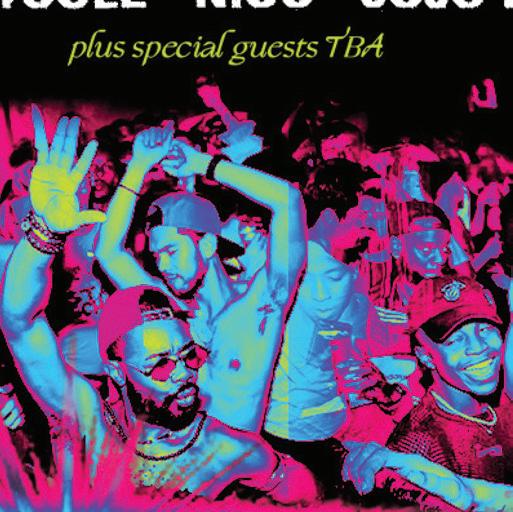
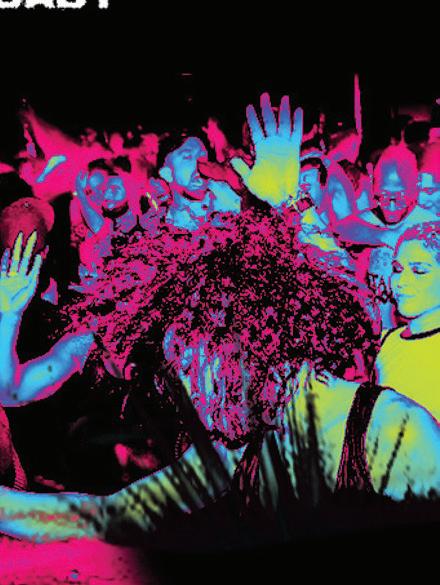


AUGUST 18, 2022 - CHICAGO READER 43 Visit Ravinia.org SATURDAY, SEPTEMBER 17, 2022 SATURDAY, SEPTEMBER 17, 2022 SATURDAY, SEPTEMBER 17, 2022
JOBS
Caregiver Responsibilities:
Assisting with personal care, Following a prescribed healthcare plan, Ensuring my Mother home is organized according to her needs. Providing mobility assistance may be required, for example helping my Mother with her motorized wheelchair, appointments, grocery. Meal and watch over. Work Schedule is 5 days a week and 5 hours per day. Salary is $26/hr. Contact by email Daniel (dajcahh@gmail. com) for more details.
Einsure Services Inc. seeks Marketing/ Business Development Associate in Chicago, IL to develop online paid search campaign in GoogleYahoo/Bing Ad Words and monitor all campaigns daily. Reqs: Master’s in Communications, Marketing, BA or rltd field. Must have gained following through edu, exp or internship: (1) Utilize paid search campaigns & marketing funds that directly impacts profitability of Company; (2) Building & subsequently review business performance to assess marketing plans; (3) Understand Company’s income statement & its impact on marketing queries; (4) Understand market trends to report or identify competitors business models; & (5) Deploy & analyze complex operation sites & marketing data, using Google AdWords Planner, Google Analytics, Google AdWords, MailChimp, Search engine Optimization (SEO), Moz, and/or SEMrush. Send resume to jobs@ einsure.com w/Job ID LSSMBDev112021.
Mechanical Engineer – Chicago, IL Golden Star Inc DBA Advance Consulting Group needs professionals: Design and develop using AutoCAD, REVIT, Carrier HAP, Bluebeam. Req. – Master’s with 1 yr exp or bachelor’s +5 yrs. Exp. Comp. salary, Travel/Relocation within USA possible. Please mail resume to Ref: Vice President, 300 W Adams St, Ste 420, Chicago, IL- 60606.
Curam Business Analyst(s)
RedMane Technology LLC seeks Curam Business Analyst(s) in Chicago, IL to gather requirements & perform Fit/Gap Analysis to determine best design approach based on out of the box functionality. May require to travel/telecommute. Email resume to yourcareer@redmane. com; reference job code D7038-00088. E.O.E.
Sullair –Data Scientist, Aftermarket – Chicago, IL. Dev., impl. & manage aftermarket prod. databases & sales tools. Collect & analyze data using BI platform. A bachelor’s or equiv in Comp Sci, IT or rld fld & 5 yrs progressive exp in Data Analytics OR master’s or equiv & 3 yrs exp. Must have 3 yrs exp w/: data modeling, DB dev., SQL, BI tools, Cloud tech., Adobe & RDBMS (SQL Server, PostgreSQL); data programming, analytical & problem-solving in matrixed env.; leading cross-functional data analytics proj.; 2 yrs exp dev. BI dashboards w/ focus on opp. mapping leveraging MS Dynamic NAV/JDE/SAP (or equiv. ERP/CRM sys.); 1 yr w/: data modeling using tool around sales, marketing & eng. data mapping w/ in defined install base seg.; dev. profit recognizing prog. w/ multiple ERP sources; dev. asset lifecycle models & dev. BI dashboards to pinpoint high lost opp. Apply at https://hitachi.wd1. myworkdayjobs.com/ hitachi (ID# R0010295).
HEALTH & SAFETY TECHNICIAN
Electronics recycling svc co. seeks a f/t Health & Safety Tech. Jobsite: Chicago, IL. Send resume to: Jenny Cheng, hr@ rdirecycling.com. RDI, Inc. EOE
Dir .Bus. Process Mngmnt. Bach (or f. equiv.) in Ind. & Systems Engnrg, CS Engnrg, Business or rel.+5 yrs. Post-bach. exp. Standardize SOPs including IT apps. Use Cyber Query and Power BI to generate effective reporting. Use Project management exp. for complex projects. se nan ial knowled e to analyze the financial impact of processes and systems on the organization. Manage 1 Project Manager. Travel up to 35% req. Standard Forwarding LLC, Forest View, IL. F/T. c.v. to Elizabeth Irizarry, Executive Assistant/ Mobility Specialist, DGFAM. Immigration@dhl.com. No calls/recruiters/visa sponsorship. Ref. job #128112
ENGINEERING
YUM Connect LLC. has an opening in Chicago, Il for Android Engineer to design and build advanced applications for the Android-based pointof-sale and operations platform that is not a typical consumer-facing Android app. Telecommuting permitted. Ref job code C#6161765 & mail resume to: YUM Connect LLC. Attn: HR, 3301 Stober Road, Louisville, KY 40213.
Research Analyst sought by Legal & General Investment Management America in Chicago, IL to leverage mathematical methods to provide insight and quantitative research for and collaborate with multiple teams across the r to dri e the development of investment solutions and thought leadership. Requires a US Master’s degree or foreign degree equivalent in Economics, Finance or Financial Engineering or a related field, and two (2) years’ experience in: Analysis and construction of multi-asset solutions, including defined contribution strategies for both the institutional and retail markets; analysis of o pany spe i de ographic data to construct custom multi-asset target date funds; creation of models to construct and validate investment solutions; quantitative modeling skills with broad knowledge of financial markets, portfolio management, and relevant regulations; programming and development skills with proficiency in Matlab, Python, SQL, Excel Modeling & Bloomberg.
Technical Skills: Monte Carlo Simulation; Raw Data Verification; Mean Variance Optimization; Risk Management; VaR & CVaR; Financial Modeling. Send resumes to LGIMA at katie.edeus@ lgima.com.
Jr. Solution Associate position available w/ MCKINSEY & COMPANY, INC. US (Chicago, IL). Act as delivery lead for portfolio of client projects, managing the full cycle from project planning thru to results presentation, incl project managing analyst teams. Line manage Analysts to help them develop professionally w/in the company. Independently lead interactions w/ clients, incl project kickoffs, resear h inter iews, project updates & general communications. Min Master’s degree in Mgmt Studies, Stats, Math, or rel uant eld or orei n degree equiv & 2 yrs of strategy or research exp in the banking industry, either in-house or as consultant. Exp must incl: familiarity w/ data processing & data visualization apps; using internal data sys to extract data & create materials/ decks/presentations; big data analysis, statistical analysis, Alteryx, &Tableau. Domestic & int’l travel typically required.
Destination & frequency impossible to predict. Email your resume to CO@mckinsey.com and refer to Job # 5245675
No phone calls please. An EOE
Wm. Wrigley Jr. Company.: Principal Scientist – Chicago, IL. Act as a critical member of the Product Science team, holding direct responsibility for developing new technologies & products through a deep understanding of the science behind product performance. Bach’s degree in Food Sci, Chemistry, Chemical Engg, or closely rel fld yrs o e p working for a CPG company. Telework permitted up to 3 days per week. Up to 10% travel required. To apply, send resume identifying Job Code 114 to MarsTA-PIC@ effem.com. No calls.
DePaul University seeks Intermediate ERP Business/Analyst Developers for various & unanticipated worksites throughout the U.S. (HQ: Chicago, IL) to analyze & design ERP sw applications in client/server & web-based enterprise application environment. Bachelor’s in Comp Sci, Info Sys/Tech or Computer o putational eld or related eld yrs e p req’d. Req’d skills: Exp in higher edu environment analyzing, designing, testing ERP, incl SDLC, PeopleSoft sw apps, PeopleSoft data mining, working w/ customers to analyze req’s, Oracle Server, SQL, Application Engine, .NET, JSON, web service integrations, HTML, XML, XSLT, CSS, UI Design, PL/SQL, Visual Studio, C#, SQR, COBOL. Telecommuting permitted. Send resume to: I. Savage, 1 East Jackson, Chicago, IL 60604
Associate Partner positions available with McKinsey & Company, Inc. US in Chicago, IL. Lead engagements for clients incl. leading teams of engagement managers (EMs) & associates. Confirm & negotiate studies w/ clients through external & internal meetings. Prepare letters of proposal & outline scope of work & fees. Responsible for overall impact of work incl. deliverables. Mentor & dvlp associates, admin semi-annual review process & recruit new associates. Min ed req’s are a Master’s in Bus Admin, Fin, Econ, or non-business advanced degree. Must have 3 yrs of mgmt consulting exp with a major top-tier int’l mgmt consulting firm, one of which must be at Engagement Manager level. Domestic & Int’l travel typically required. Destination & frequency impossible to predict. Email your resume to CO@mckinsey.com and refer to CTR0801. Multiple positions. No phone calls please. An EOE.
DePaul University seeks Instructors for Chicago, IL location to teach courses to undergrad & grad students in translation & interpreting foreign languages. Master’s in Linguistics or Foreign Language or Literature +2yrs exp req’d. Req’d skills: must have specialization in translation, interpretation, incl advising/mentoring students & dev courses; must have proficiency in at least 1 language in addition to English & Spanish. Please submit a CV, cover letter, & names of 3 references. Send resume to: K. Grublesky, REF: ES, LPC, 990 W. Fullerton Ave., Ste 4200, Chicago, IL 60614
3Red Partners is seeking a Quantitative Developer. Work on strategy development and code optimization. This is a telecommuting position. Must live within normal commuting distance of New York City. Please submit resume to careers@3redpartners. com and reference code 090388 in subject line.
EXECUTIVE ASSISTANT Electronics recycling svc co. seeks a f/t Executive Assistant. Fluent in Mandarin Chinese speaking, reading, and writing req’d. Domestic & int’l travel req’d. Jobsite: Chicago, IL. Send resume to: Jenny Cheng, hr@ rdirecycling.com. RDI, Inc. EOE.
TransUnion, LLC seeks Lead Engineers for various & unanticipated worksites throughout the US (HQ: Chicago, IL) to de ne, aintain, omunicate & implement standards consistent w/ architecture & strategy. Master’s in Comp Sci/ Comp Eng/any Eng eld yrs e p or Ba helor’s in Comp Sci/Comp Eng/any Eng field+5yrs e p re d e d pe i skills: exp installing, configuring, supporting, implementing Microsoft IIS on Windows servers, IIS App commands, DFSR, ARR, Service tracer, VMware, SCVMM, Tripwire, IIS Audit, Splunk, HttpWatch, SCOM, installing & configuring erti ates, , load balancing, capacity planning, Microsoft PowerShell, windows batch, IIS log & Event Viewer log analysis, Akamai, Log parser, AppFabric, Process monitor, Telnet, Perfmon, Netmon, debug diag, Firebug, TinyGet, disaster recovery, installing security updates/ patches. 100% telecommuting permitted. Send resume to: M. Carter, REF: AKG, 555 W Adams, Chicago, IL 60661
Accountant. Terra Associate Management LLC, Chicago, IL. Duties: input/review of financial records, inspecting/ maint’g. books, auditing nan ial re ords, al & paying taxes/payroll. Req.: bachelor’s deg. in Accounting, Accountancy, or closely-rltd. major & 24 mos. exp. as accountant (prior exp. must have incl.: work w/ audits, Excel (or similar), & Quickbooks (or similar). Email résumé to hr@ terra52.com.
TransUnion, LLC seeks IT Project Managers (Sr Consultants) for Chicago, IL location to lead full life-cycle of large, complex cross-functional IT projects & programs.
Master’s in Comp Sci/ Comp Eng/any Eng eld yrs e p Ba helor’s in Comp Sci/Comp Eng/any Eng field+5yrs exp req’d. Req’d skills: exp delivering IT tech services in project mgmt in large, complex tech, customer-facing environment; demonstrated exp of Lean-Agile practices & principles & using Agile project delivery approaches such as Scrum & Kanban; process automation; working on multiple projects (8-10) simultaneously, & w/ RPA tools (WorkFusion, Power Automate); proven successful exp managing projects/programs of $1M in budget/revenue; exp working w/3rd party vendors (sw evaluation, onshore/offshore workers); Agile (Scrum Master, Product Owner, SAFe Agilist, SAFe Scrum Master); Jira, Rally; excellent communication, negotiation, relationship building skills. 40% telecommuting permitted. Send resume to: M. Carter, REF: JM, 555 W Adams St, Chicago, IL 60661.
TransUnion, LLC seeks Product Managers for various & unanticipated worksites throughout the U.S. (HQ: Chicago, IL) to assess, prioritize, & execute sw product initiatives. Master’s in Comp Sci/Comp Eng/ related field +2yrs exp OR Bachelor’s in Comp Sci/Comp Eng/related field +5yrs exp req’d. Req’d Skills: UX/UI, Agile methodologies, Jira, Confluence, SQL, Postman, B2B SW, enterprise telephony tech, digital authentication & fraud prevention tech, AI/ Machine Learning, cloud contact center platforms, sw design, tech documentation, req’s mgmt. 100% telecommuting permitted. Apply online: arter, Bene ts epresentative, REF: FPA, 555 W. Adams St., Chicago, IL 60661
Trade Compliance Analyst sought by Legal & General Investment Management America in Chicago, IL to liaise with Enterprise Trade Compliance Project Management team and Guideline Management and Control teams based out of the United Kingdom to ensure execution of project deliverables. Requires a US Bachelor’s degree or foreign degree equivalent in Finance or a related eld, and three (3) years’ experience in: Overseeing guideline coding and monitoring within Charles River Investment Management System (CRIM); Investigating post trade breaches/ potential violations pertaining to Investment Trust, Pension Funds, ICVC’s & GPR funds; Advising portfolio management team regarding compliance requirements regarding investment and trading issues; Global project implementation to span all asset classes and all client portfolios with a particular focus on passive equity and active fixed income monitoring. Technical Skills: Bloomberg; Charles River, JPM Access, Work bench, FMC, Portia, FTS, Liquidity Tool, Incursion tool. Send resumes to LGIMA at katie.edeus@ lgima.com.
Turner Acceptance Corporation seeks to hire an accountant with a BA in Accounting. The applicant will be required to process dealers’ contracts and initiate payment; process accounts payable and eri es business transactions; Apply accounting techniques and standard practices to the lassi ation and reordin o nan ial transactions; generate budget nan ial reports aintain accounting records; perform other related duties and participate in various projects as assigned in order to meet department goals. Mail Resume to Turner Acceptance Corp./ c/o:Karen Star at 3 Parkway N, Suite 550S, eer eld,
TransUnion, LLC seeks Sr. Developers for Chicago, IL to dev & enable new sw app features & optimize strategic Analytics platforms. Master’s in Comp Sci/Info Sys t related eld yrs exp OR Bachelor’s in Comp Sci/Info Sys t related eld yrs exp req’d. Req’d Skills: Automation, Kanban, Agile, container-based dev, Kubernetes, Docker, Docker Swarm, RHEL, Centos, Bash Scripting, Python, Puppet, Ansible, Elasticsearch, Logstash, Kibana, Git, CI/CD tools. 50% telecommuting permitted. Send resume to: M. Carter, REF: BCN, 555 W Adams St., Chicago, IL 60661.
44 CHICAGO READER - AUGUST 18, 2022 ll
CLASSIFIEDS JOBS GENERAL REAL ESTATE RENTALS FOR SALE NON-RESIDENTIAL PROFESSIONALS & SERVICES CLEANING RESEARCH LEGAL NOTICE WANT TO ADD A LISTING TO OUR CLASSIFIEDS? Email details to classified-ads@chicagoreader.com
USG Corporation is seeking a Sr. Systems Designer in Chicago, IL with the following requirements: Bachelor’s degree in Computer Science or related field or foreign equivalent degree. 5 years of related experience; Required Skills: Validate integration solution and integration architecture designs utilizing integration architecture components including Webmethods Integration Server , Webmethods Active Transfer Server, and MWS (5 yrs); Utilize Webmethods to build Web Service and API integration, EDI, XML and Flat File translation (5 yrs); Support third-party systems including Salesforce, Transplace, SPS, Oracle Cloud integrated with ERP system (5 yrs); Prepare technical, functional design document using Word and Visio applications (5 yrs).
Please visit www.usg. com/careers to view the entire job description and apply.
USG Corporation is seeking an Oracle Developer in Chicago, IL with the following requirements: Bachelor’s degree in Computer Science and/or Engineering or related field or foreign equivalent degree. 5 years of related experience; Required Skills: Utilize Oracle SQL, PL/SQL, Oracle Forms Builder, Oracle Report Builder, Workflow builder, JDeveloper, TOAD, SQL Loader, Unix, XML/BI Publisher to customize or enhance Oracle EBS system to meet end user requirements (5 yrs); Prepare technical, functional design document per Oracle AIM Methodology using Word and Visio applications (5 yrs); Document test cases using HP Quality Center Tool and perform unit testing for all developed technical objects (5 yrs); Support different third-party systems like BI, Salesforce, GetPaid, Transplace, MaxLoad Pro, Rightfax integrated with Oracle E-Business Applications (5 yrs).
Please visit www.usg. com/careers to view the entire job description and apply.
Rethink Ed is bidding on RFP #22-237 for Chicago Public Schools. We are looking for possible M/WBE suppliers to provide professional development for Special Education, SEL, Mental Health and MTSS. If you are interested in this opportunity, contact us via email at rfp@rethinked. com
NextCapital Group, Inc. is seeking a Software Engineer 3 in Chicago, IL to implement & perform a variety of tests by utilizing testing frameworks. Please email resume to harrise@ nextcapital.com & ref 051794. Can telecommute up to 100% from any location in the U.S.
Graphic Designer (Ehomie Chicago Inc., Chicago, IL 60611)
Full-time; Duties: Create graphic and layout design to support the company’s marketing and business development, including designing mktg materials, website, and social media content. Reqs= Bachelor’s in Graphic Design, Arts Management, or related (foreign equivalent acceptable) + 12 months exp. in graphic design. For full job desc. & reqs go to https:// illinoisjoblink.illinois.gov/ ada/r/jobs/9892032. To apply, send resume to hr@ehomiegroup.com.
RENTALS & REAL ESTATE
Authentic German Bar-Restaurant for Sale. Established 30 years in beautiful Dubuque, Iowa. $294K Call Joe at 563588-0361. Hate to give it up, it’s been good to me. Includes the building with living quarters above. Come out and see it.
LEGAL NOTICE
NOTICE OF PUBLIC SALE OF PERSONAL PROPERTY
Notice is hereby given that pursuant to Section 4 of the Self-Storage Facility Act, State of Illinois, that Chicago Northside Storage - Lakeview / Western Ave Storage LLC will conduct sale(s) at www.storagetreasures. com by competitive bidding starting on August 10th and end on August 17th @ 12:00pm on the premises where property has been stored, which are located at Chicago Northside Storage 2946 N Western Ave. Chicago, IL 60618. 773-305-4000.
In the matter of the personal property for the individual listed below, Chicago Northside Storage - Lakeview. H05 Cian Omahony, M13 Brian A Doherty, o06 Greg Parker, P01 Lisa Edgerton, P26 Cian Omahony, P34 Tyran Greer, Z61 Paul Odoom, CC45 David Christian. Purchases must be made with cash only and paid at the time of sale’s redemption. All goods are sold as is and must be removed at the time of purchase. Sale is subjected to adjournment.
RESEARCH
Have you had an unwanted sexual experience since age 18? Did you tell someone in your life about it who is also willing to participate?
Women ages 18+ who have someone else in their life they told about their experience also willing to participate will be paid to complete a confidential online research survey for the Women’s Dyadic Support Study.
Contact Dr. Sarah Ullman of the University of Illinois at Chicago, Criminology, Law, & Justice Department at ForWomen@ uic.edu, 312-996-5508. Protocol #2021-0019.
PROFESSIONALS & SERVICES
CLEANING SERVICES
CHESTNUT ORGANIZING AND CLEANING SERVICES: especially for people who need an organizing service because of depression, elderly, physical or mental challenges or other causes for your home’s clutter, disorganization, dysfunction, etc. We can organize for the downsizing of your current possessions to more easily move into a smaller home. With your help, we can help to organize your move. We can organize and clean for the deceased in lieu of having the bereaved needing to do the preparation to sell or rent the deceased’s home. We are absolutely not judgmental; we’ve seen and done “worse” than your job assignment. With your help, can we please help you? Chestnut Cleaning Service: 312-332-5575. www. ChestnutCleaning.com
SAVAGE LOVE
SAVAGE LOVE
By DAN SAVAGE
Q : I’m a 40-year-old female, cis-het. I have very discerning tastes in men, and always end up alone. Any way to be more open without sacrificing my standards?
A : You’ve either had a terrible run of bad luck—assuming you’ve dated more than ten men—or you’ve set your standards impossibly high. Some food for thought: perhaps you think you want a long-term relationship because you were told that’s what you’re supposed to want—you were told that’s what all good people want—but you actually don’t want a long-term relationship. They don’t make you happy. But instead of telling yourself that you’re a good person who prefers short-term relationships and/or being alone, you’ve set your standards so high— you’ve dialed them up to sabotage— because you want to be alone. And instead of owning that about yourself, you find fault in the men you date.

P.S. There’s no settling down without settling for.
Q : Is there any way to enjoy anal while having a hemorrhoid?
A : Nope, sorry. You need to wait for it to heal.
Q : I’m a 36-year-old man. If I get too psyched out to stay hard for (extremely rare) anal with my wife, should I just get some Viagra?
A : Well, that depends. Does your wife like long anal sex sessions? If the answer to that question is yes, then Viagra could help. Because in addition to helping you get and stay hard, Viagra and other ED meds can delay orgasm. But if your wife doesn’t like long anal sex sessions—if she generally wants you to hurry the fuck up and get the assfucking over with—lasting longer could make those already rare anal sex sessions rarer still. Maybe try a cockring instead?
Q : Tips for helping a penis-haver last

longer when penetrating other than cockrings? (Cockrings are great, but they don’t help with longevity.)
A : Cockrings are great; I recommended them to another reader five second ago. But while a snug-but-not-too-tight cockring can help keep a penis-haver’s penis hard by gently restricting blood flow out of the penis-haver’s penis, cockrings don’t make penis-havers “last longer,” e.g., they don’t delay ejaculation. (Cockring 101: Gentle restriction is good; trapping blood in the penis is not. Cockrings should be snug, not tight.) If you’ve already tried all the standard-issue advice to treat premature ejaculation (which I’ve covered before and don’t have the space to re-re-re-rehearse in a Quickies column), an ED med like Viagra might help (for the reasons mentioned above); a low-dose SSRI is also an effective treatment for premature ejaculation.

P.S. Whenever someone writes “penis-haver” my slightly dyslexic brain reads “penis-halver,” as in, someone who cuts a penis in half— which some people in the body modification community have done, and bon(e) appétit to anyone brave enough to do a Google image search.
Q : For those that like to fuck outside on hikes and while camping . . . should we be wary of trail cams or GoPros people are hiding in trees for whatever reason?
A : If people are doing that—if people are hiding cameras on popular hiking trails—well, then you should indeed be wary. Hike the beaten path, don’t fuck on it.
Q : An ex-boyfriend is seeing trans prostitutes. Do I tell his current wife IF an opportunity to do so should arise? And it will, as we live on a small island. I would’ve wanted to know if we were still together. Should she not be offered the same?
A : If you truly live on a small island— small enough that everyone knows everyone else’s business but large enough to have more than one trans sex worker—then your ex-boyfriend’s wife is gonna find out sooner or later. But even if it means she finds out a little later, it would be better if she found out from someone other than you. Assuming your ex’s wife doesn’t already know and approve, if the bearer of bad news is a bitter ex—or someone who can easily be cast as one—your ex-boyfriend will have a much easier time convincing his wife that it isn’t true. Better she should hear it from the vicar.
Q : I’m a gay boy in the big city and I want to start doing sex work as a side gig. But I have no idea how to start. First steps?
A : First steps: get vaccinated against monkeypox, Hep A and B, and HPV, and get on PrEP. Then talk with other people who are doing or have done sex work. There are a lot of sex workers on Twitter; most aren’t there to solicit customers, but to advocate for their rights and create community. Follow and learn.
Q : I met a guy that is very gi ed at giving me multiple orgasms, but I have a hard time getting him to come at all. Any advice?
A : If he doesn’t want to come, don’t make him. No problem. But if he’s not coming because you want to make him come with your own hand, pussy, or mouth and he can’t come that way, then there is a problem here, and it’s you. Give him permission to enjoy oral and PIV and whatever else you both enjoy before finishing himself off with the same skilled hands he’s using to get you off. Problem solved. v
The full version of Savage Love is available on savage. love/ savagelove. Email questions@ savagelove.net.
@fakedansavage
AUGUST 18, 2022 - CHICAGO READER 45
Hike the beaten path, don’t have sex on it
Hemorrhoids, cockrings, and more quickies

















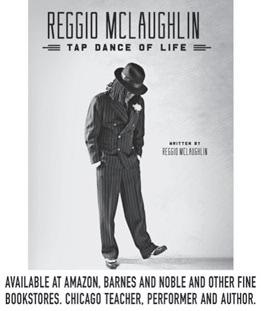





















46 CHICAGO READER - AUGUST 18, 2022 ll Outside Noise Reduction Keeps Bugs & Spiders Out Reduce or Eliminate Fog & Water Noise from Outside? Visit stormsnaps.com or noisewindows.com sales@stormsnaps.com Alpina Manufacturing, Chicago, IL 1-800-915-2828 Soundproofing Window Inserts the platform The Chicago Reader Guide to Business and Professional Services To advertise, e-mail ads@chicagoreader.com home improvement legal books Fun, Clean, Picture Frame assembly JOB $18/hour Tired or bored of clicking away on a keyboard working at home? Keep your hands and mind busy with a fun, safe, clean assembly job. You’d have your own large assembly zone, at least 15-20 feet away from others, so we’re really safe here. Top rated rm Alpina Manufacturing LLC founded in 1992 Beautiful campus in Galewood, near Mars candy, 3 blocks north of Oak Park. We build and sell display framing systems to customers nationwide including Wal-Mart, Verizon, Circle K gas stations, Hospitals. Full time, Part time, Flex hours for working parents or students. We train, no travel, work in Galewood. Open to any backgrounds. Excellent pay, friendly caring management. Stop in anytime between 7am and 4pm M-F ask for Izzy to apply and check us out. Alpina Manufacturing 6460 W Cortland St., Chicago, IL 60707 business consulting Brigi e Schmidt Bell, P.C. 847-733-0933 lawyers@bsbpc.com Brigi eBell.com Brigi eSchmidtBellPC Considering Divorce? We Can Help. Collaborative | Prenuptual Divorce | Mediation mental health YOUR AD HERE dance JOIN US! WWW GECHAMBER COM What Greta said . . . 5301N.ClarkSt.Fl.2 CHICAGODANCESUPPLY.COM 773-728-5344 773-616-6969 1234/1250 S. Michigan Ave. In/out. Must call 8 am-9 pm. No annoying texts. European Relax Massage Licensed & Certified Cupping health & wellness shop local Customized Massage Therapy, Intuitive Energy Work, and Holistic Talk Therapy 2514 W Armitage Ave, Suite 211 Chicago, IL 60647 773-697-9278 www.intuithealing.com Open Thursday-Monday BY APPOINTMENT ONLY A Matter of Consequences by Michael W. Falls Available on Amazon and Booklocker A Classic Chicago Mystery

































































AUGUST 18, 2022 - CHICAGO READER 47 the cannabis platform a Reader resource for the canna curious www.neuromedici.com 312-772-2313 Findouttoday ifmedical cannabisorinfusiontherapyis rightforyou.Telemedavailable! Yourpartnersinhealthandwellness. Serving medical cannabis patients since 2015. To advertise, email ads@chicagoreader.com CBD / cannabis recipes, psychedelic drawings to color, word puzzles to stimulate your brain, growing tips, and more! chicagoreader.com/420book The Budrista platform is a cannabis industry and lifestyle project. Its purpose is to support the healthy and balanced lifestyle of cannabis industry workers. Budrista functions through various outlets such as educational programming and recreational events. By signing up, you’ll have first access to our events and programming! Come Over to Squirt.org and Join the Action. Hosting. We’re 10 DAYS FREE FUN FOR EVERY NEW GUY








ALEJANDRO CERRUDO + ARTISTS IT STARTS NOW September 8, 2022 / 7:30PM HARRIS THEATER PRESENTS 22/23 DANCE Corporate Presenting Dance Sponsor The Irving Harris Foundation, Joan W. Harris HTP Mainstage Sponsor
Sandra Guthman Engagement Lead Sponsor
Jack and
312.334.7777 | harristheaterchicago.org | 205 East Randolph Street
Photo by Grace Kathryn Landefeld.











































































































































































































































































































































































































